A DELUGE OF PRO-ISRAEL PAC DONATIONS IN 2024 ELECTIONS
DISPLAY UNTIL 7/31/2024

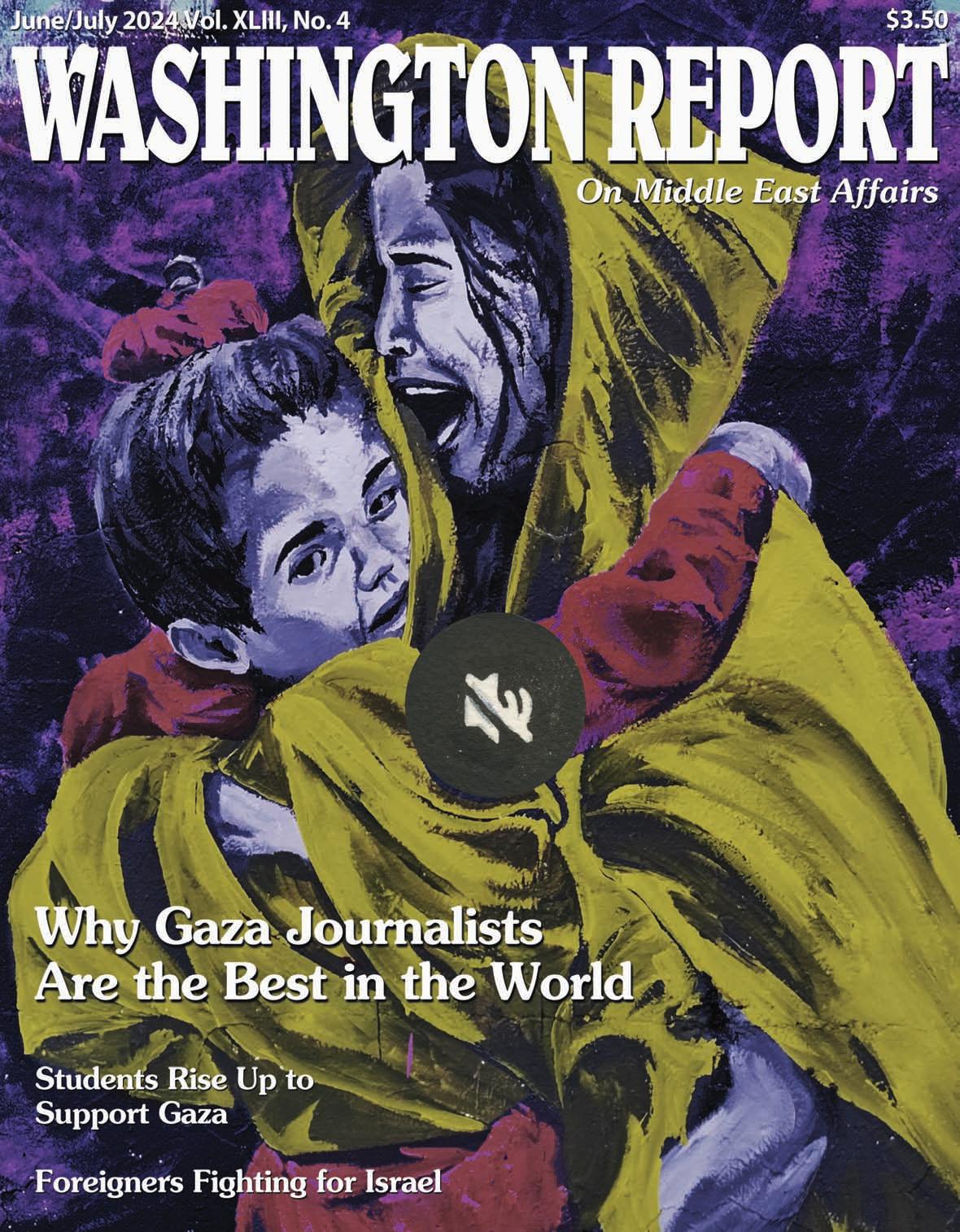










DISPLAY UNTIL 7/31/2024











The World Cup and Gaza—A Lesson in Humanity Younes Jalal Elhallaq
is Using Foreign Fighters in its Genocidal War on Gaza—Two Views Bruce Fein, Mustafa Fetouri
Singapore John Gee
Canadian Coalition Takes Government to Court for Complicity in Genocide Candice Bodnaruk
Amid Full-Blown Famine, Freedom Flotilla’s 2024 Aid Mission to Gaza Delayed Jack McGrath
Türkiye’s Local Elections Leave Plenty of Hopes—and Fears
ON THE COVER: Argentinian artist Juan Kantor’s mural in Barcelona, Spain is inspired by an iconic image, taken by Anadolu photojournalist Ali Jadallah on the 17th day of Israel’s attack on Gaza (see publisher’s page). Kantor’s mural at the free graffiti zone of Jardines de Caterina Albert Park in Barcelona, Spain is part of a project called “Unmute Gaza,” an organization supporting Palestinian photojournalists.
(PHOTO BY ROMAN RAMIREZ/ANADOLU VIA GETTY IMAGES)
Biden Is Still the Best U.S. President Israel Could Wish for, Faisal Kutty, www.aljazeera.com
Palestinians and the World Must Not Lose Hope, Mariam Barghouti, www.aljazeera.com
How Many Israelis Killed by “Friendly Fire”?, Will Porter, www.antiwar.com
Israeli Universities Cannot Teach U.S. Jews the First Thing About Human Rights and Liberty, Gideon Levy, Haaretz
Israel’s Defenders Talk So Much About Feelings Because They Can’t Talk About Facts, Caitlin Johnstone, www.caitlinjohnstone.com.au
Cruelty of Language: Leaked NY Times Memo Reveals Moral Depravity of U.S. Media Ramzy Baroud, www.ramzybaroud.net
HUMAN RIGHTS: Two Years After Shireen Abu Akleh’s Killing, Palestinian Journalists Remain “Disposable”
57 DIPLOMATIC DOINGS: Humanitarian Coordinator Addresses Gaza Crisis
57 WAGING PEACE: Tareq Baconi: What Was Hamas Thinking?
56 ARAB AMERICAN ACTIVISM: Maryland Community Celebrates Arab American Heritage Month 65 THE WORLD LOOKS AT THE MIDDLE
(A Supplement to the Washington Report on Middle East Affairs available by subscription at $15 per year. To subscribe, call toll-free 1-888-881-5861.)
Compiled by Janet McMahon
Romney Admits Push to Ban TikTok Is Aimed at Censoring News out of Gaza, Julia Conley, www.commondreams.org OV-9
“Intifada” in Arabic Just Means Uprising or Mass Protest; It Is Used for the Jewish Warsaw Uprising, Juan Cole, www.juancole.com OV-10
United Methodist Church Votes to Divest From Israel Bonds, United Methodist For Kairos Response, http://mondoweiss.net OV-11
The Land and Sea Blockade Against Israel Is Working, as Israel Takes a Strategic Hit, Ahmed Alqarout, http://mondoweiss.net OV-12
Violating Diplomatic Missions, Vijay Prashad, www.consortiumnews.com OV-13
The Abu Ghraib Case Is an Important Milestone For Justice, Yumna Rizvi, www.aljazeera.com OV-15
How to Waste Two Trillion Dollars, Eric S. Margolis, www.ericmargolis.com OV-16

This Washington Report issue spotlights many of the attempts by Israel and its supporters to muzzle free speech and ban critical reporting on Gaza. As we go to press, more than seven months into Israel’s war on Gaza, vast swathes of Gaza are in ruins and Israel is pummeling Rafah, forcing refugees who fled there for safety to move their tents once again. No aid is entering Gaza from the Israelicontrolled Kerem Shalom crossing and on May 7 Israel closed the Rafah border crossing between Egypt and southern Gaza, preventing vital deliveries of food, clean water, medicine and fuel from entering the Strip. The humanitarian crisis has become a genocidal famine.
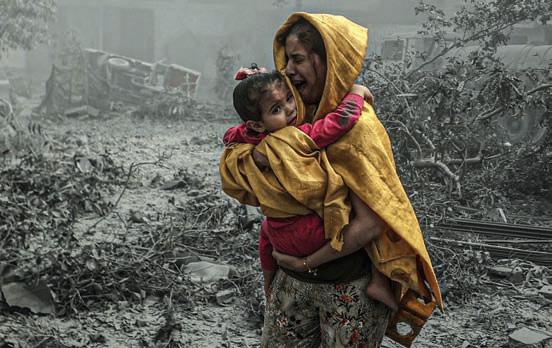
A woman holding a little girl searches for safety after Israeli airstrikes hit her Radwan neighborhood in Gaza City, on Oct. 23, 2023, the 17th day of Israel’s punishing attacks on Gaza. Ali Jadallah’s iconic photo captures the horror of Israel’s genocidal war on Gaza and inspired this issue’s cover.
Joined by Egypt and Türkiye, South Africa returned on May 16 to the International Court of Justice (ICJ) in The Hague to demand Israel immediately withdraw and cease its military offensive in Rafah. In addition, South Africa called on Israel to “immediately take all effective measures to ensure and facilitate the unimpeded access to Gaza of United Nations and other officials engaged in the provision of humanitarian aid and assistance to the population of Gaza, as well as fact-finding missions, internationally mandated bodies or officials, investigators and journalists, in order to assess and record conditions on the ground in Gaza and enable the effective preservation and retention of evidence, and shall ensure that its military does not act to prevent such access, provision, preservation or retention.”
Vaughan Lowe, a British barrister and academic specializing in the field of international law, told the ICJ: “The key point today is that Israel’s declared aim of wiping Gaza
from the map is about to be realized. Further, evidence of appalling crimes and atrocities is literally being destroyed and bulldozed, in effect wiping the slate clean for those who have committed these crimes and making a mockery of justice. The Court is not powerless, and South Africa submits, with respect, that it must do something to assert not only its own authority but the authority of international law.”
The ugly truth is that U.S. leaders concerned only with the 2024 elections are flouting international law and thwarting justice at every turn. Their craven decisions to starve Palestinians and send even more military weaponry to Israel will be remembered in history and will actually cost them the votes of Arab, Muslim, Christian, Jewish, Black, young people and other pro-Palestinian Americans in the upcoming elections.
That makes our leaders defy the wishes of a growing number of constituents and at times verge into outright hostility to Palestinians and anti-Muslim bigotry. It’s because one-issue top billionaire donors like media mogul Haim Saban, mobile gaming pioneer Mark Pincus and LinkedIn co-founder and venture capitalist Reid Hoffman are pouring money into our leaders’ campaigns. See pp. 28-35 for a look at the money candi-
dates reported to the Federal Election Commission by April 22, 2024. Dark money spent on party building, advertising and issue advocacy is unregulated but by looking at these charts, voters can surmise which candidates for public office are supported by pro-Israel donors. You can follow that money to see who is defending Israel vs who is defending the First Amendment (see p. 36-37).
When it’s money that controls the foreign policy crafted by our leaders, not to mention corporate media (see pp. 8-9), it can come as no surprise that students (pp. 1218) built encampments at their universities and protesters around the world (pp. 45-47) are taking to the streets to protest Israel’s genocide. Like Palestinians for the past 76 years, demonstrators are feeling silenced, ignored and disregarded. And we’re tired of our voices being “on mute,” like the woman in the mural on our cover, whose cry for help is not heard or is ignored in the West. We refuse to be used like a human shield for Israeli war crimes. As we send this issue to the printer, the last lines from a poem by Dylan Thomas inspire us: “Do not go gentle into that good night. Rage, rage against the dying of the light.” And like the students who have rekindled hope for peace in Palestinian hearts, as well as multiple generations of activists around the world, we will wear our keffiyehs when we vote and everywhere else as we go about our lives until Palestinians can live in peace and dignity.
Please double down and support the nonprofits which are trying to stop a genocide in Gaza. This magazine, as well as other alternative media, websites, TikTok and, in fact, the entire Internet are all under attack by our own government’s use of McCarthy era tactics. Keep contributing your talented voices to the cause, donating to the Washington Report, shopping at Middle East Books and More, reading and raging to...
Make a Difference Today!
Executive Editor: DELINDA C. HANLEY
Managing Editor: DALE SPRUSANSKY
Senior Editor: IDA AUDEH
Other Voices Editor: JANET McMAHON
Middle East Books and More Director: NATHANIEL BAILEY
Middle East Books and More Asst. Dir.: JACK MCGRATH
Finance & Admin. Dir.: CHARLES R. CARTER
Art Director: RALPH UWE SCHERER
Founding Publisher: ANDREW I. KILLGORE (1919-2016)
Founding Exec. Editor: RICHARD H. CURTISS (1927-2013)
Board of Directors: HENRIETTA FANNER
JANET McMAHON
JANE KILLGORE
Washington Report on Middle East Affairs (ISSN 87554917) is published 7 times a year, monthly except Jan./Feb., March/April, June/July, Aug./Sept. and Nov./Dec. combined, at 1902 18th St., NW, Washington, DC 20009-1707. Tel. (202) 939-6050. Subscription prices (United States and possessions): one year, $29; two years, $55; three years, $75. For Canadian and Mexican subscriptions, $35 per year; for other foreign subscriptions, $70 per year. Periodicals, postage paid at Washington, DC and additional mailing offices. POSTMASTER: Send address changes to Washington Report on Middle East Affairs, P.O. Box 292380, Kettering, OH 45429.
Published by the American Educational Trust (AET), a nonprofit foundation incorporated in Washington, DC by retired U.S. foreign service officers to provide the American public with balanced and accurate information concerning U.S. relations with Middle Eastern states. AET’s Foreign Policy Committee has included former U.S. ambassadors, government officials, and members of Congress, including the late Democratic Sen. J. William Fulbright and Republican Sen. Charles Percy, both former chairmen of the Senate Foreign Relations Committee. Members of AET’s Board of Directors and advisory committees receive no fees for their services. The new Board of Advisers includes: Anisa Mehdi, John Gareeb, Dr. Najat Khelil Arafat, William Lightfoot, George W. Aldridge and Susan Abulhawa.
The Washington Report on Middle East Affairs does not take partisan domestic political positions. As a solution to the Palestinian-Israeli dispute, it endorses U.N. Security Council Resolution 242’s land-for-peace formula, supported by nine successive U.S. presidents. In general, it supports Middle East solutions which it judges to be consistent with the charter of the United Nations and traditional American support for human rights, self-determination, and fair play.
Material from the Washington Report may be reprinted without charge with attribution to Washington Report on Middle East Affairs. Bylined material must also be attributed to the author. This release does not apply to photographs, cartoons or reprints from other publications.
Indexed by ProQuest, Gale, Ebsco Information Services, InfoTrac, LexisNexis, Public Affairs Information Service, Index to Jewish Periodicals, Ethnic News Watch, Periodica Islamica.
CONTACT INFORMATION: Washington Report on Middle East Affairs
Editorial Office and Bookstore: 1902 18th St. NW, Washington, DC 20009-9062
Phone: (202) 939-6050 • (800) 368-5788
E-mail: wrmea@wrmea.org • bookstore@wrmea.org circulation@wrmea.org advertising@wrmea.org • donations@wrmea.org
Web sites: http://www.wrmea.org
http://www.middleeastbooks.com
Subscriptions, sample copies and donations: P.O. Box 292380, Kettering, OH 45429
Phone: (800) 607-4410 Fax: (937)-890-0221
Printed in the USA
Corporate-owned television has shown us the recent breakup of the student encampments on our nation’s colleges and universities for protesting the ongoing genocide in Gaza by the state of Israel.
Here’s a question: Are the tents the problem, or is the problem that 2,000pound bombs—supplied with billions of our U.S. tax dollars—are being used to eradicate Palestinians?
Over 35,000 Palestinians have been killed, some 70 percent women and children. Over 70,000 have been wounded, some requiring amputations without anesthesia. Their homes have been reduced to rubble with our U.S. bombs. They have been driven south to Rafah where some 1.5 million people are on the brink of starvation and living in tents. Even there, they are being attacked.
Tents, in general, seem to be despised by those in power. We have seen city after city destroy homeless encampments. Are the homeless the problem, or are our priorities as a government screwed up? We spend billions on wars, but we don’t have enough money to provide drug, alcohol and mental health services. Having a home should be a human right, unfortunately we point to their tents as a problem.
The attacks on students and the homeless are merely a reflection of our priorities as a society.
Laurent F. Gilbert, Sr., The Villages, FL
Israel is apparently ashamed of what it is doing, and rightly so. “Israel is killing Palestinian journalists, banning foreign media [most notably Al Jazeera] from reporting on Gaza—and losing credibility,” columnist Rami G. Khouri recently noted.
“For the past six months, Israel has put a lot of effort into covering up its genocidal crimes in Gaza,” he continued. “One of the most brutal ways it
does this is by routinely threatening, targeting and assassinating Palestinian journalists.”
The Committee to Protect Journalists has reported that at least 100 Palestinian journalists have been killed since Oct. 7, alongside two Israelis and three Lebanese. This is the highest death toll of journalists in any modern conflict that the organization has monitored. Palestinian journalists have also been detained by Israeli forces.
With tens of thousands killed by Israel in Gaza, it’s no wonder they are trying to limit the world’s access to news from Palestinians.
Doris Rausch, Tullahoma, TN
Despite the killing of Gazans, despite efforts to label all Palestinians as Hamas, despite 75 years of occupying and oppressing the indigenous people, Israel has finally failed. It’s been defeated by too many lies, too many distortions, too much land being stolen, too much destruction of olive trees, too much denial of justice, too much imprisonment of children without charges, too much abject blind support from the United States, too much blood-spilling of innocents and too many young people worldwide unwilling to ignore an ongoing genocide.
Israel is defeated. Its right-wing, extremist, Zionist government has laid bare its cruelty, its ugliness, its vengeance for all the world to see. It has forgotten and ignored the Judaic and Islamic values of justice, peace, compassion and mercy. Now it is doomed as a pariah nation state unless it does what it should have done in 1948, or in 1967—create a secular democracy in which all citizens are equal under the law, whether it is called Israeli Palestine or Palestinian Israel. Because it has chosen death for decades, now it must suffer to choose life. This will save not just Palestinian lives, but Israeli Jews as well.
Dan Callaghan, New Port Richey, FL
From a strictly emotional point of view, the article by Abubaker Abed in last issue’s “Other Voices” supplement about a Gazan gravedigger, “Abu Jawad’s Heart Breaks Daily as He Buries the People Killed by Israel,” was especially moving. It made plain the tragic consequences of Israel’s indiscriminate bombing campaign. There’s obviously no effort being made to avoid civilian casualties. Heck, the Israelis don’t even contend they are carrying out so-called surgical strikes.
Two articles I also found particularly informative and useful: Jack McGrath’s “How Biden Uses Loopholes, Courts and Congress to Arm Israel's Genocide,” and Bruce Fein’s “Sacred Constitutional Rights Like Politically Motivated Boycotts Can't Be Surrendered.” The piece on “Cultural Heritage Under Attack in Gaza” by Ida Audeh also made for informative reading.
As I’ve written before, here in Western Europe there is so much angst about anti-Semitism and eternal feelings of guilt about the Holocaust. Consequently, the news is abysmally one-sided. Worse yet, in Germany and elsewhere, the authorities rush to prevent any expression of solidarity with the Palestinians—to the point of even cancelling art exhibits or speaking engagements that feature Jewish and Israeli personalities, artists, writers and dramatists who express sympathy for the Palestinians. Despite all the grief they endure, Europeans of conscience nevertheless are continuing to demonstrate and protest.
To give you an example from Luxembourg, the national newspaper printed a full-page article one month ago in which the author claimed anti-Semitism is rampant in Luxembourg because everyone to the left of Attila the Hun wants to see a ceasefire enacted and steps taken toward the long-awaited two-state solution. The guy’s claims were ludicrous.
George Aldridge, Bissen, Luxembourg
Bob Rae, Canada’s United Nations ambassador, recently stated that “the ulti-
Send your letters to the editor to the Washington Report, P.O. Box 53062, Washington, DC 20009 or e-mail <letters@wrmea.org>.
mate responsibility for the conduct of the [Gaza] war lies with the parties who are fighting.” In so stating, Rae, a former Rhodes Scholar, ignores the United States’ pivotal role in providing Israel with weapons, money and diplomatic support. Of course, Rae’s rhetoric reflects official Canada’s deference to U.S. Middle East policy.
The U.S. facilitates Israel’s indifference to international law on the matter of territorial seizure, occupation, settlement and resource extraction in the occupied Palestinian territories and the Syrian Golan Heights. Therefore, all Palestinian negotiators face the combined force of the U.S. and Israel, who together reserve the right to define peace.
A bolder Rae might highlight the lost promise of the 2002 Arab League Peace Initiative. This proposal from the major Arab states offered the “establishment of normal relations in the context of a comprehensive peace with Israel in return for the…full Israeli withdrawal from all the Arab territories occupied since June 1967, in implementation of Security Council Resolutions 242 and 338.”
It seems that Bob Rae and Canada’s government remain willing to pretend that the so-called peace process is something other than Israel’s cynical delaying tactic designed to annex all valuable Palestinian territory.
Under the circumstances, why should Palestinians
meekly accept Israeli settlements in the West Bank and East Jerusalem and believe that these and future settlements are not part of an established Israeli policy of isolation and incremental annexation?
Perhaps Bob Rae might consider the notion that a bi-national state in Palestine with equal rights for Jews, Muslims, Christians and others is the only fair arrangement. In fact, it is probably inevitable.
Morgan Duchesney, Ottawa, Canada ■
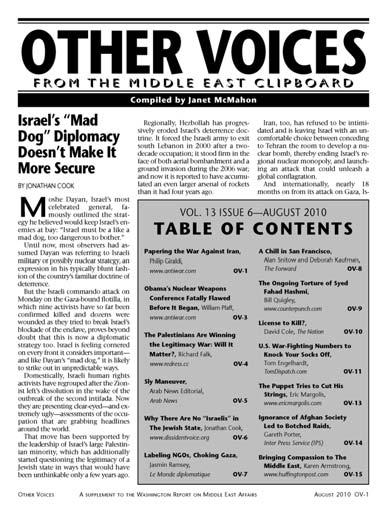
OTHER VOICES is an optional 16-page supplement available only to subscribers of the Washington Report on Middle East Affairs. For an additional $15 per year (see postcard insert for Washington Report subscription rates), subscribers will receive Other Voices inside each issue of their Washington Report on Middle East Affairs. Back issues of both publications are available. To subscribe, telephone (800) 607-4410, e-mail <circulation@wrmea. org>, or write to P.O. Box 292380, Kettering, OH 45429.
By Ramzy Baroud

placed over the
in an Israeli air strike on Rafah. Hamza is the son of the Al
Wael
who continued
the war even after his wife, two other children and a grandson were killed in an Israeli airstrike on Oct. 28, 2023. Israel shut down Al Jazeera operations in the West Bank on May 5 and confiscated their equipment.
BY GRANTING ITS 2024 World Press Freedom Prize to Palestinian journalists covering the Israeli war on Gaza, UNESCO has acknowledged a historic truth.
Even if the decision to name Gaza’s journalists as laureates of its prestigious award was partly motivated by the courage of these journalists, the truth is that no one in the world deserved such recognition more than those covering the genocidal war in Gaza.
“As humanity, we have a huge debt to their courage and commitment to freedom of expression,” said Mauricio Weibel, chair of
Dr. Ramzy Baroud is a journalist, author and editor of Palestine Chronicle. His latest book, co‐edited with Ilan Pappé, Our Vision for Liberation: Engaged Palestinian Leaders and Intellectuals Speak Out, is available from Middle East Books and More. Dr. Baroud is a non‐resident senior research fellow at the Center for Islam and Global Affairs (CIGA). His website is <www.ramzybaroud.net>.
the International Jury of Media Professionals, which made the recommendation for the award.
Courage is an admirable quality, especially when many journalists in Gaza knew that Israel was seeking to kill them, often along with their families, to ensure that the horror of the war remains hidden from view, at worst, or contested as if a matter of opinion.
Between Oct. 7, 2023, and May 11, 2024, as many as 143 Palestinian journalists in Gaza were killed by Israel. It is higher than the total number of journalists killed in World War II and the Vietnam War combined.
This number does not include many bloggers, intellectuals and writers who did not have professional media credentials.
But there is more to Gaza’s journalists than bravery.
Whenever Israel launches a war on Gaza, it almost always denies access to international media professionals from entering
the Strip. This go-to strategy is meant to ensure that the story of the crimes that the Israeli army is about to commit goes unreported.
The strategy paid dividends in the socalled Cast Lead Operation in 2008-9. The true degree of the atrocities carried out in Gaza during that war, which resulted in the killing of more than 1,400 Palestinians, was largely known only when the war was over. By then, Israel had concluded its major military operation, and corporate mainstream Western media had done a splendid job in ensuring the dominance of Israel’s political framing of the war.
Israel’s behavior since that war remained unchanged: barring international journalists, placing a gag order on Israeli journalists and killing Palestinian journalists who dared cover the story.
The August 2014 war on Gaza was one of the bloodiest for journalists. It lasted for 18 days and cost the lives of 17 journalists. Palestinian journalists, however, remained committed to their story. When one fell, 10 rose up to report.
Occupied Palestine has always been one of the most dangerous places to be a journalist. The Palestinian Journalists’ Union reported that between 2000—the start of the Second Palestinian Uprising — and May 11, 2022—the day that Israel murdered the iconic Palestinian journalist Shireen Abu Akleh—55 journalists were killed at the hands of the Israeli army.
The number might not seem too high if compared to the latest onslaught in Gaza, but by international standards, it was a terrifying figure, based on an equally disturbing logic: killing the storyteller as the quickest way of killing the story itself.
For decades, Israel, an occupying power, has managed to depict itself as a victim in a perpetual state of selfdefense. Without any critical voices in mainstream media, many around the world believed Israel’s deceiving discourse on terrorism, security and self-defense.
The only obstacles that stand between the actual truth and Israel’s
engineered version of the truth are honest journalists—thus, the ongoing war on the media.
What Israel did not anticipate, however, is that by blocking international media access to Gaza, it would inadvertently empower Palestinian journalists to take charge of their own narrative.
“Interpretations depend very much on who the interpreter is, who he or she is addressing, what his or her purpose is, at what historical moment the interpretation takes place,” the late Palestinian intellectual Edward Said wrote in Covering Islam
Like any other form of intellectual interpretation, journalism becomes subjected to the same rule of positionality in academia, as in the relationship between the identity of the researcher and the social or political context of the subject matter.
Palestinian journalists in Gaza are themselves the story and the storytellers. Their success or failure to convey the story with all its factual and emotional details could make the difference between the continuation or the end of the Israeli genocide.
Though the war is yet to end, the Gaza journalists have already proven to be deserving of all the honors and accolades, not only because of their courage, but because of what we actually know about the war, despite the numerous and seemingly insurmountable obstacles created by Israel and its allies.
Most people all over the world want the war to end. But how did they acquire the needed information that made them realize the extent of horror in Gaza? Certainly not through Israel’s cheerleaders in mainstream media, but through Palestinian journalists on the ground who are using every means and every channel available to them to tell the story.
These journalists include self-taught youngsters, like 9-year-old Lama Jamous, who wore a press vest and conveyed the details of life in displacement camps in southern Gaza, reporting from Nasser Hospital and many other places with poise and elegance.
As for the accuracy of information provided by these journalists, they were certainly professional enough to be verified by numerous human rights groups, medical and legal associations and millions of people around the world who used them to build a case against the Israeli war. Indeed, all we know about the war— the death toll, the degree of destruction, the daily human suffering, the mass graves, the famine and much more—is possible because of these Gaza-based reporters.
The success, and the sacrifices of Gaza journalists should serve as a model for journalists and journalism around the world, as an example of how news about war crimes, sieges and human suffering in all its forms should be conveyed. ■
(Advertisement)

By Ian Williams

Palestinians return to the rubble of their homes, schools, hospitals, mosques and buildings after the Israeli army withdrew from the region in Khan Yunis, Gaza on May 5, 2024. Gazan photographer Ali Jadallah has captured another iconic scene (see p. 5).
THE U.N. IS ALL about symbols, a fact that often disappoints people who want to know “But what does the U.N. do?” Well, seeing its work in the Balkans, the Middle East and elsewhere, it is almost a relief to be able to say, “Not a lot.”
In fact, the U.N. is most useful for its symbolism, for what it stands for. Its standards tend to be pure, offering tools and targets for the world as shown in May’s General Assembly vote (yet again) on Palestine’s snail-like progress to U.N. membership. But symbols are important, people fight and die for them—the symbolism of sovereignty counts. The Israelis understand that, which explains why they react as they do to the Palestinian flag and even watermelon slices!
Nauru, a piece of coral that few people can find on a map, has sovereignty, but a thriving and powerful Taiwan does not. We can deduce the importance of Palestinian membership from the frenetic Israeli attempts to stop it.
U.N. correspondent Ian Williams is the author of U.N.told: The Real Story of the United Nations in Peace and War (available from Middle East Books and More).
For Zionists, the U.N. is like sex for the celibate; the more they repudiate it, the more they obsess about it. In his rabidly frothy tirade in response to the vote (143 for, 9 against, 25 abstentions), Israel’s U.N. representative Gilad Erdan set up a small table shredder and ran the U.N. Charter through it, claiming that this is what the delegates had just done. No one can specify which clause in the Charter allows one small ethno-cultist state to disregard the decisions made by all the other country members, and it is a moot point whether Erdan has ever read it. Israel’s dilemma is significant: how to insult all other member nations and yet to win their support. Erdan accused the Secretary General of being an emissary of Hamas and also in effect declared him to be the head of a terrorist organization—the U.N.! But Israel never walks out. They know that the U.N. resolutions, even if only from the General Assembly, are a more substantial claim to legitimacy than stone tablets from Mt. Sinai.
One of the results of the U.N. vote on Palestine’s status is that the delegation moves from a seat in the gallery to the stalls, the main body of the General Assembly, sandwiched between Panama, which supported its bid, and Palau, which never has, and
whose ambassador is also the Pacific atoll’s recently accredited representative to Israel. Let us hope Palestinian representative Riyad Mansour’s team is hospitable to their new neighbor and has time for informative chats about shared histories of victimhood.
And that segues to the latest proposal by three Canadian academic and former diplomats, Lloyd Axworthy, Michael W. Manulak and Allan Rock, for a U.N. Trusteeship for Palestine, modelled on the feigned independence of the Pacific Trust territories such as Palau. The Canadians undoubtedly planned in good faith and their record is considerably more principled than Israel lobby-puppet Justin Trudeau. Axworthy in particular has sound credentials; he was a major mover in former secretary-general of the United Nation’s Kofi Annan’s “Responsibility to Protect” and in the establishment of the International Criminal Court. Sadly, the latter has mostly been missing in action while the International Court of Justice has been hamstrung by the total irresponsibility of the major players.
The Canadians’ proposal is, on one level, far-sighted, addressing what to do after the Israeli army has pulverized the hospitals, schools and homes of Gaza and ploughed salt and corpses into the ruins while a massed chorus of settlers sings Delenda est Gaza (Gaza Must be Destroyed).
Although the trusteeship model might now appear to have the superficial patina of history, closer examination shows that it is really green mold. Trusteeship began as League of Nations mandates in an attempt to launder postwar imperial landgrabs. Palestine escaped U.N. trusteeship because no one was prepared to grab the hot iron from the fire—which is a major reason it ended in chaos and Israel.
The model depends on a neocolonial franchise system, with countries accepting imperial re-
sponsibilities. But the authors are imbued with “Western” standards in which Saudi Arabia and Jordan are honest players and prepared to accept leading roles. It’s clear that acceptability to Israel, not to Palestinians, is the major criterion. A U.N. Trusteeship Council supervising the process would mumble just as toothlessly as the Security Council. Israel, whose ambassador has just denounced the U.N. as a terrorist organization, does not seem qualified for nuanced governance of the territories and has shown what it thinks of international forces with all the body bags it sent from the United Nations compound in Qana, Lebanon.
Ironically, the U.S. had vetoed Palau’s own “independence” and U.N. membership for many years because it denied the U.S. permission to use its territory for nuclear weapons storage. Presumably Palau’s staunch anti-nuclear stance is flexible enough to accommodate Israel’s nuclear weapons and refusal to sign the Nuclear Non-Proliferation Treaty. Clearly, as devout Christians, they have decided to forgive and forget.
Washington chained the former Strategic Pacific Trust territories by association agreements. The U.S. effectively finances
their entire budgets and by treaty also has a decisive say in their foreign policy. Looking at the rubble of Gaza, one could recall that the Canadian’s invocation of “the layers of oversight” of the trusteeships “designed to benefit the inhabitants of non-self-governing territories” mentioned by the Authors did not prevent the Pacific territories from being the most nuked pieces of real estate in the world as the U.S. tested its nuclear arsenal on them.
Following in Palau’s shallow footsteps, and contrary to the rosy expectations of many Palestine supporters, the General Assembly vote in May was not a vote on Palestine’s U.N. membership as such. It was only an invitation to the Security Council to reconsider its recent vote, in which the U.S. had yet again vetoed the application for full membership. With the resolution, the Assembly also pushed timorously beyond its previous face-saving (for the U.S.) positions that had made Palestine a “nonmember” state, toward a “non-voting member state.”
In fact, the metaphysical aspects of geopolitics as practiced in the U.N. mean that aspects of the draft resolution in favor of Palestine were retrenched by countries like Russia and China who qualified their undying support for Palestine with caution, in case the resolution offered any succor to Kosovo or Taiwan. Establishing inconvenient principles can come back and bite pontificators in the posterior.
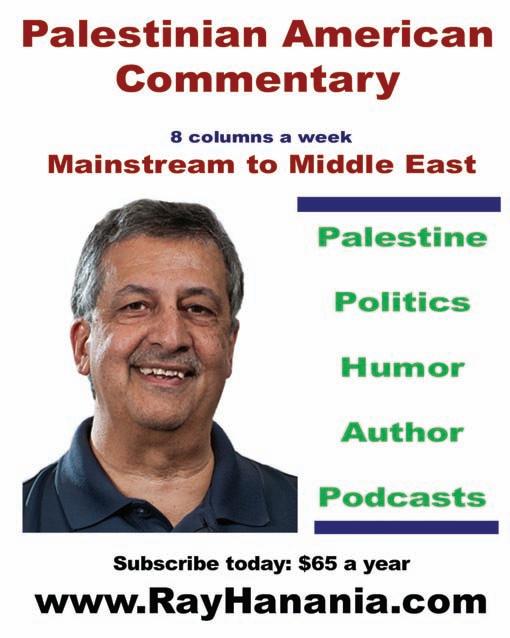
Similarly, the apocalyptic scenarios of Israel’s Permanent Mountebank to the U.N., Gilad Erdan, will not be realized. The vote will not trigger an automatic withdrawal of funding by the U.S., as he has been prophesying, let alone Armageddon and the Rapture as advertised by Erdan’s expedient evangelical allies. Who needs to trigger Armageddon when you can look at Gaza and see that Israel has demonstrated what the aftermath will look like. ■
By Kenn Orphan
I JUST WATCHED a child’s last breath. Lying on a gurney, bloodied and terrified. Red pools forming under his head. Eyes glazing over with the unmistakable shroud of death. This is Rafah. This is what is happening now.
And yet, I keep seeing people say they feel “unsafe” because of the mere existence of encampments on university campuses. Feeling unsafe because others are protesting a genocide. And I think about what it actually means to be unsafe. Is there anything more unsafe than being displaced, starved, endlessly bombed, shot at or buried alive?
I think of all the universities that have been obliterated in Gaza. Of all the professors who have been slaughtered. How safe are the students who once attended their classes? I think of the mass graves found in hospital courtyards. Bodies with ziptied wrists, catheters, medical gowns covered hastily with waste and mud. Bodies of children, old people, the sick and the medical teams who once assisted them. If you’ve done any work in human rights, you understand the horror that the term “mass grave” imbues. They are the absolute markers of atrocity.

Pro ‐ Palestinian students protest on April 29, 2024 at Columbia University’s “Gaza Solidarity Encampment” in New York City. A group of billionaires and business titans urged New York’s Mayor Eric Adams to disperse the students. Encampments spread to nearly every state in the U.S. and other countries after Columbia’s president authorized New York City police to dismantle the encampment and conduct mass arrests on April 30. Students are calling for a ceasefire and demanding their universities stop doing business with companies supporting Israel’s war on Gaza.
Some have wasted no time reminding us that this is simply the “reality of war.” But is this really a war? I cannot recall another war where one side was able to so easily shut off the water mains, the electricity, the food and medicine shipments at will. If it is a war, I wonder where the soldiers on the other side are. Because I haven’t seen them either. I haven’t seen the other side’s tanks or drones or destroyers or aircrafts. I’ve only seen children, the elderly, the sick and the starving. But I have seen soldiers. Soldiers from one side of this so-called “conflict.” They have been posting endless videos of themselves smashing children’s toys, defecating in kitchens and parading around in the lingerie of women who have vanished. I’ve seen them making wedding proposals and holding podcasts on the rubble of bombed out apartment buildings. I’ve seen them hauling off jewelry, clothes and money. I’ve seen them firing on people waving white flags or who were simply crossing a road.
Kenn Orphan is an artist, sociologist, radical nature lover and weary, but committed activist. He can be reached at kennorphan.com. This article was first published in CounterPunch on May 6. Reprinted with permission.
Much of the media, pundits and many politicians of all political persuasions have been wasting no time demonizing the student protests. They keep telling us how they make some people feel unsafe. And they continually tell us that this all started on Oct. 7. That this is a “retaliatory war.” And it’s true that terrible things were done on Oct. 7. But they never mention the 80 years prior to that day. They never mention apartheid and forced displacement and night raids and indefinite detention of children and home demolitions and settler attacks and a crippling block-
ade. Wouldn’t those things make anyone feel perpetually unsafe?
The assault on Rafah has begun. Millions of starving, sick and displaced civilians are in harm’s way with nowhere to go. And yet I keep hearing pundits, politicians and the media demonize students for simply demanding that their schools stop funding it. And wringing their hands over some people feeling unsafe because of those demands.
I cannot help but think of that little boy I just saw die on a gurney. I’m pretty sure he would’ve gladly traded places with any of the people who keep saying they feel unsafe because there are some nonviolent protests on some university campuses.
By Sam Husseini
THE STUDENT PROTESTERS are being demonized, as Palestinians have been. Those pretending to defend the U.S. flag should consider a few simple facts. Contrary to what lots of pro-Israeli folks have claimed, no students at George Washington University (GWU) took down the U.S. flag. They took down the university flag from one flagpole adjacent to their encampment protesting Israel’s genocide. On the other pole, which had the U.S. flag, they hoisted the Palestinian flag beneath or alongside it.
The administration then cut all the lines so, for a period, no flags could be hoisted from the poles, and dropped a massive U.S. flag from the building.
This compelled the student protesters to project “Genocide Joe” atop that flag.
Meanwhile, the statue in the park of George Washington was adorned with Palestinian flags, a keffiyeh atop his head, various stickers protesting Israel’s carnage and writing at the base: “Genocidal Warmongering University,” referring to the university’s effective support of Israel.
On May 4, I heard someone shout “this is America!” as he pulled the Palestinian flags from the statue of Washington. The student organizers immediately shouted to everyone present not to escalate the situation, and the man walked off with the flags. A couple of students immediately got to work putting up other Palestinian flags on the statue, affixing them more securely than before. A short time later, other students returned with the flags that had been removed.
It was a small incident, but it showed the discipline and organization of the student protesters.
The claim that the U.S. flag is under attack is certainly not grounded in fact on the GWU campus, even as “flag defenders”
Sam Husseini is an independent journalist whose writings can be found at husseini.substack.com. He’s the founder of VotePact.org.
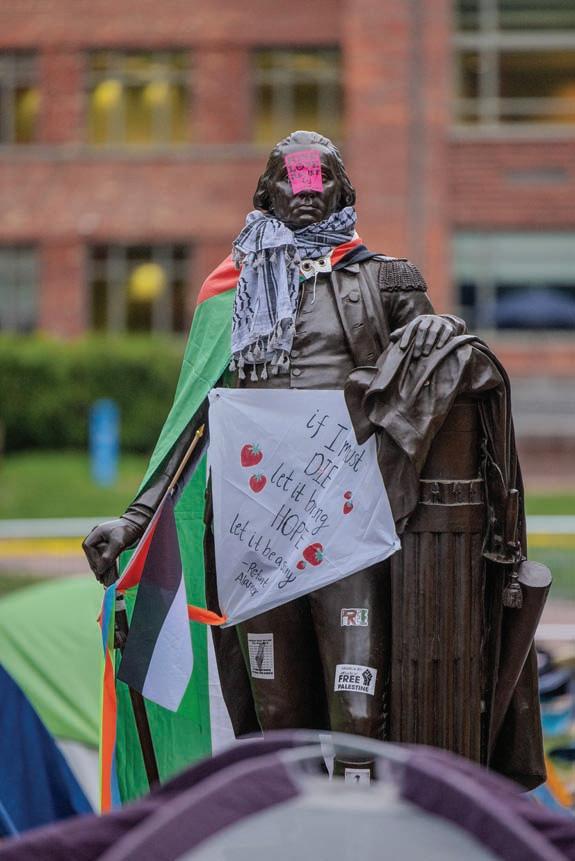
are hyped and reportedly are having hundreds of thousands of dollars donated to them.
For weeks the GWU administration had attempted to get the DC police to clear the students out of the park, less than a mile from the White House, and the police refused until May 8, so it would seem the university is more repressive than the police.
The U.S. flag is arguably being defamed, however. Early on in the encampment, a student showed up with a “U.S. flag” blurring into the Israeli one. At first I thought this might have been to protest the “special relationship” between the U.S. and Israel. But no, it was a pro-Israeli counter protester backing it.
This is all remarkably ironic in a number of ways.
Perhaps the most far-reaching is that it was none other than George Washington, who warned in his farewell address:
A passionate attachment of one nation for another produces a variety of evils. Sympathy for the favorite nation, facilitating the illusion of an imaginary common interest in cases where no real common interest exists, and infusing into one the enmities of the other, betrays the former into a participation in the quarrels and wars of the latter without adequate inducement or justification.

It leads also to concessions to the favorite nation of privileges denied to others which is apt doubly to injure the nation making the concessions; by unnecessarily parting with what ought to have been retained, and by exciting jealousy, ill-will, and a disposition to retaliate, in the parties from whom equal privileges are withheld. And it gives to ambitious, corrupted, or deluded citizens (who devote themselves to the favorite nation) facility to betray or sacrifice the interests of their own country, without odium, sometimes even with popularity; gilding, with the appearances of a virtuous sense of obligation, a commendable deference for public opinion, or a laudable zeal for public good, the base or foolish compliances of ambition, corruption, or infatuation.…Against the insidious wiles of foreign influence (I conjure you to believe me, fellow-citizens) the jealousy of a free people ought to be constantly awake, since history and experience prove that foreign influence is one of the most baneful foes of republican government.”
This is in marked contrast to President Joe Biden’s statement to J Street: “If there were not an Israel, we would have to invent one to make sure our interests were preserved.”
This notion with respect to Israel is the subject of the book The Passionate Attachment: America’s Involvement With Israel, 1947 to the Present by George W. Ball and his son Douglas B. Ball. George Ball is best known as the most high-level critic in the U.S. government of the Vietnam War. He was deputy secretary of state during the Johnson administration.
Publisher Andrew I. Killgore reviewed the book in the February 1993 issue of the Washington Report in an article that could have been written today. The authors warned that today’s passionate attachment to Israel by a small but extremely influential
faction in America constitute a great danger to the United States. They described the dangerous: “assertions of the political clout in the United States of Israel and its Washington lobby, the American Israel Public Affairs Committee (AIPAC). Together, they have demonstrated repeatedly that Israel generally can get whatever it decides it needs from the United States by employing the twin engines of its power: the purchase of immense influence in the Congress, and the manipulation of fanatical loyalty to Israel by individuals within the U.S. media.”
If “flag defenders” on GWU’s campus were at all serious, they would object to the “passionate attachment” to the imperial enterprise of Israel, which is key to transforming the U.S. from a normal country to an Empire. What does “This is America” mean?
That question is also highlighted by the circumstances of the ultimate attack on the GWU encampment. The First Amendment stipulates that Congress should respect freedom of speech. Yet, it was Congress that did much to attack free speech. The GWU encampment was destroyed at the orders of DC Mayor Muriel Bowser hours before she was scheduled to go before a Congressional committee. That committee hearing had been pushed by Rep. James Comer (R-KY), chair of the House Oversight Committee, who claimed without basis that the protests, which had featured several Jewish religious services, were anti-Semitic. (That hearing was cancelled after the police destroyed the GWU encampment.) DC government is still very much beholden to Congress. Similarly, House Speaker Mike Johnson (R-LA) and Rep. Elise Stefanik (RNY), who is on several key committees, threatened Columbia University’s federal funding just before that university shut down its student encampments.
By Samir Twair
ON APRIL 25, University of California, Los Angeles (UCLA) students and community members set up more than 30 tents in Samir Twair earned a master’s degree in history from UCLA in 1985 and worked in the insurance and financial industry for more than 30 years. He is a free‐lance writer based in Los Angeles.
front of Royce Hall to demand the university divest from companies complicit in Israel’s affront on Palestinian human rights.
The encampment was organized by Students for Justice in Palestine and the UC Divest Coalition at UCLA. The mobilization’s goals also include the transparent disclosure of the university’s financial records, severing UCLA’s ties with the Los Angeles Police Department (LAPD) and cutting affiliations with Israeli academic institutions.
Benjamin Kersten, an organizer with Jewish Voice for Peace at UCLA, said students will keep pressure on the university until it makes meaningful commitments to divest from companies such as BlackRock, an investment firm that has ties to Israeli weapons manufacturing.
As an example of the animosity Wall Street has toward Palestine, Marc Rowan, CEO of the asset management firm Apollo Global Management, told CNBC’s David Faber on May 6 that the student encampments are “anti-Semitic.” He chided universities for not having “the backbone to know right from wrong, moral from immoral.” Rowan also—ironically—called the protesters illegal occupiers: “Last time I came and occupied your home probably made you unhappy. Nothing other than that is going on here.” At no point did Faber point out that Israeli settlers regularly steal and occupy the actual homes of Palestinians.

Kersten also criticized Jewish organizations, such as the AntiDefamation League (ADL), for releasing statements labeling encampments across the country as anti-Semitic. Such remarks are a disservice to what he sees as a movement for justice.
Some professors were present at the encampment. A.J. Julius, an associate professor in the philosophy department, said he came out to support his students and call for a ceasefire.
Graeme Blair, an associate professor of political science and member of Faculty for Justice in Palestine at UCLA, said he attended to insist there be no negative academic repercussions for students participating in the encampment and to defend students’ right to express dissent on campus.
On Tuesday night, April 30, a gang of pro-Israel men dressed in black with hoodies attacked the UCLA encampment with pepper spray, fireworks and metal poles. The campus police were nowhere to be seen, and it took LAPD hours to begin dispersing the aggressive agitators. Several students were injured during the assault and were carried out of the encampment.
By the morning of May 1, more police from multiple agencies arrived on campus, as did many community members looking to express their solidarity. That evening, the UCLA administration declared the assembly on campus unlawful. An LAPD force of more than 200 officers surrounded the encampment and prepared to disperse the crowd and clear the area, but they didn’t immediately act, likely due to the large number of supporters present.
The LAPD ultimately waited until 3 a.m. to raid and dismantle the encampment, arresting more than 200 students who refused to leave.
Some UCLA faculty members subsequently issued a statement in support of the students, calling upon the governor, the mayor of Los Angeles, the University of California and all other involved authorities to grant full legal, academic and disciplinary amnesty to all protesters.
Such protests have historic precedence on the campus, as they echo the demands UCLA students made against apartheid South Africa in 1985. Those efforts successfully led to divestment. I was there as a graduate student and proudly participated in that movement, which saw more than 2,000 students and community members rally in front of Murphy Hall on April 23, 1985, calling on the UC Board of Regents to divest from South African apartheid.
By Adam Reshi Azaanta
LAKE WASHINGTON School District (LWSD) in Washington state claims to be responsive to student and community concerns, but its recent actions give reason to doubt that claim. For months,
Adam Reshi Azaanta, a pseudonym, is a student from Lake Washington High School who worries that he will be doxed if he uses his given name.
parents and students with keffiyehs draped on their shoulders have attended every school board meeting, imploring the board to take action to register the community’s opposition to Israeli army measures in Gaza—killing, torturing, raping and starving Gazans. Yet the district board stayed silent, citing its concern for “safety for the Israeli and Jewish community.” Their silence perpetuates the status quo. It does not reflect the wishes of the school district community.
Because the district has failed to act on this matter, students acted. A student group devised a plan for a walkout in Lake Washington High School (LWHS) and submitted it to the school administration for approval. The plan was immediately squashed.
The students were determined, however, so they tried to negotiate with the school administration. They were told that they could proceed but that the walkout could not be affiliated with the school because it is political; the students agreed. The administration purportedly contacted several Zionists, including a rabbi, who worked to stifle the organizers’ condemnation of the brutality of the Israeli army toward Palestinians.
The school officials’ position that criticizing Israel’s actions toward Palestinians was political speech, and thus unsuitable for school settings, is riddled with irony. Last June, Education Secretary Miguel Cardona visited LWHS as part of Biden’s Investing in America tour, aimed at engaging with communities nationwide. During the visit, Cardona’s staff proudly displayed signs bearing Biden’s name and the slogan “Investing in America,” thereby introducing political discourse into the school environment.
This raises questions about consistency in the school’s approach to political engagement. If school officials are genuinely opposed to politicization within educational spaces, why did they allow such a politically charged event? Furthermore, if criticizing Israel is considered political, shouldn’t students be afforded the same rights as those extended to the education secretary? This discrepancy highlights the district’s struggle to uphold the principles of equity it professes. In this light, one may wonder if the district’s approach is inadvertently shaped by contradictory rhetoric, bringing to mind George Orwell’s concept of doublespeak.
Even after the student walkout was approved, student organizers faced further challenges. A sign-making event took place at LWHS on Friday, Feb. 9, in
preparation for the scheduled walkout on Monday. The principal was present and initially approved all signs, even those referencing genocide, though mentions of “river to the sea” or “ceasefire” were prohibited. During the event, some Zionist students were observed taking unauthorized photographs, a violation of school rules.
After completing their signs, students went home for the weekend. The principal’s superior intervened, directing her to communicate to the student organizers to remove signs containing the word “genocide.” This abrupt reversal came after it was discovered that images of the signs had been shared with members of the local Zionist community, causing concern among school administrators regarding potential division within the school community. The sudden reversal left student organizers with little time to muster a defense.
The LWSD officials argued that if anyone could interpret an action or sign as “hate speech,” then it is in fact “hate speech.” What this really means is that if Zionists are exposed for their support of Israel’s conduct in Gaza, they can frame student action as “anti-Semitism” and get it banned. The student organizers told the administration that they felt betrayed. The administration seemed embarrassed by their actions and reversed their position.
Students walked out of their classes on a calm, rainy, gloomy Monday, some for the genuine feeling for the Palestinian cause and others perhaps wanting to escape a boring class. They stood in the courtyard as the names of the victims were read. Zionists recorded the event.
But the story is not over. LWHS holds ridiculous fundraisers for both Israel and Palestine when we clearly know who needs the money the most. It refuses to apologize for platforming veterans who praise the IDF. LWHS gives the Jewish Student Union great latitude; they are allowed to tell their fairy tales in assemblies honoring Dr. King that Israel gave Ethiopian Jews rights, when the record is clear: many of them endured forced sterilization.
Talking to the district board was like “talking to a brick wall,” as one student said. It is clear that the school district will not take any action that Zionist community members find objectionable. In the meantime, students are expected to continue to go to school oblivious to world events—or if not oblivious, to just shut up about them.
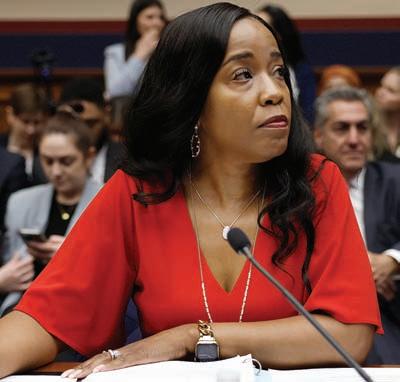
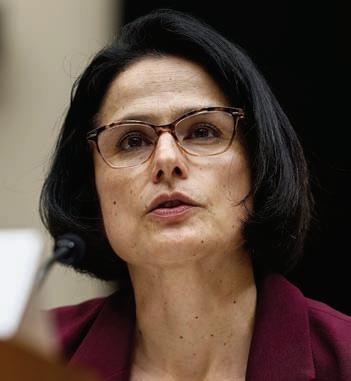
subcommittee
“PALESTINIAN VOICES don’t matter.” This was the phrase used by Emily Bannister, a Palestinian-Christian mom of two children in Maryland’s Montgomery County Public School (MCPS) system, to describe the May 8 hearing of the congressional GOPled Subcommittee on Early Childhood, Elementary and Secondary Education. MCPS, along with Berkeley Unified School District (BUSD) and New York City Public Schools, were “invited” under threat of subpoena to testify. This was just three weeks after the Columbia University president testified and sparked outrage leading to college protests across the globe. In addition, two of the school systems (MCPS and BUSD) are now under Department of Education Title VI investigations for “persistent” antiSemitism that could result in a loss of federal funding.
So when the three leaders of the public school systems walked into that hearing, they had already received the “chill effect” message that they should genuflect.
The following account is a shadow report, an alternative narrative by civil society that counters official public narratives offered by a governmental entity. It draws on interviews with students/families/staff from the three communities, along with allegations reported to the Department of Education. This civil society/grassroots narrative collectively portrays a very different perspective that underscores allegations that the true intent of
By Susan Kerin
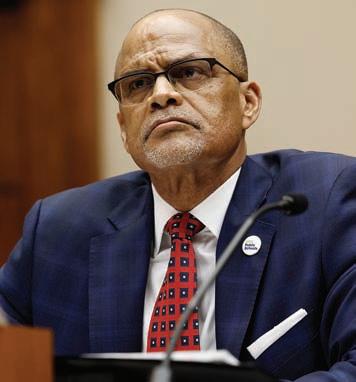
by members of the House Earl y
May 8, 2024 hearing on anti ‐Semitism in K‐12 schools held at the
the hearings/lawsuits is to reinforce the current climate of antiPalestinian repression and intimidation and further scapegoat pro-Palestinian/anti-war voices within school systems.
Both the MCPS and BUSD lawsuits begin with a very legitimate example of anti-Semitism that should be addressed, but then rapidly devolve into a litany of allegations that focus on condemning any acts of solidarity for Palestinian human rights or criticism of Israel’s bombing/starvation campaign in Gaza.
In BUSD, the complaint references a teacher wearing a keffiyeh and another teacher stating that Israel is an apartheid state. The lawsuit, initiated by the Anti-Defamation League, even targets several second graders who wrote “stop bombing babies” as their anti-hate aspiration.
The Montgomery County investigation, initiated through the Zionist Organization of America (ZOA), cites walkouts “that demonized Israel with lies, falsely accusing [the nation of] genocide.” The ZOA document adds these claims: “chants of ‘Free Palestine’…place fear, causing duress to our children” and “MCPS misinforms students and families by repeatedly referring to ‘Palestine’ as if it were a state.”
Both lawsuits criticize the school systems for not wholeheartedly accepting the International Holocaust Remembrance Alliance (IHRA) definition of anti-Semitism. The controversial IHRA definition identifies criticism of Israel as being a form of anti-Semi-
tism. It has been condemned as a means of policing speech by the ACLU, the National Coalition Against Censorship and even the definition drafter Kenneth Stern.
With the exception of a few lip service references during the hearing concerning Islamophobia and “all forms of hate,” there was very little mention about Palestinian hate and adjacent bigotry. Civil society organizations report that beyond just Palestinian hate, school staff and students have experienced intentional intimidation tactics to suppress their voices. In some instances, the attackers are parents, teachers and students. But there are also significant attacks from school leadership.
For BUSD, middle school students participating in a walkout for Palestinian life were harassed by parents. One parent brought a large dog to menace students and another parent called the youth “KKK.” A third actually called the police. In a separate incident, a student was nearly assaulted by a community member as they were speaking about Palestinian human rights at a high school rally. Another student had her hijab ripped off in class and a Jewish middle school student was called anti-Semitic by her teachers because she was explaining to her classmates why they should boycott McDonalds. Furthermore, an outside facilitator brought to the high school told students that “Palestinians don’t really exist and we can’t talk about Palestinians because they aren’t really a people.” In the incident involving the second graders who wrote “stop bombing babies,” their classroom teacher reported drone surveillance which terrorized the students.
MCPS students report pressure by administrators to take down Palestinian solidarity Instagram posts and suppression of walkouts, including being given a list of banned words which include the word “genocide.” Both the American-Arab AntiDiscrimination Committee and the local
organization MCPS4Palestine have sent letters to MCPS leaders expressing concern about efforts to suppress and intimidate students. The MCPS4Palestine letter generated more than 1,100 signatures and many alumni and parents also shared anti-Arab hate incidents at MCPS which predate October 2023. To date, neither organization has received any response from school leadership.
New York Educators for Palestine have collected harassment reports by teachers who have spoken up about Palestine which include targeting them at home, doxing vans rented by rightwing groups parked outside the school and defamatory tabloid articles. Teachers have received death threats and feces in the mail.
In all three school systems, there have been battles drawn over curriculum and professional development programs.
One matter of concern in New York City and elsewhere involves the Institute for Curriculum Services (ICS). Founded under the auspices of several Jewish Community Relations Councils (JCRCs), the ICS has initiated over 10,000 textbook revisions across the nation including deleting all references to Palestinian territories; white-washing terminology for Israel’s apartheid wall; and removing “occupied” in reference to East Jerusalem.
Despite being one of the most liberal and diverse communities in the U.S., Montgomery County’s trainings about anti-Semitism have strong right-wing underpinnings. Most notably, teachers have received training through the Israeli American Council, an entity funded by the late Sheldon Adelson (“Trump’s Patron-in-Chief”), who found the American Israel Public Affairs Committee (AIPAC) too conciliatory. MCPS also brought in Heart of a Nation, founded by Jonathan Kessler, a former senior staffer at AIPAC, which is purported to present both the Israeli and Palestinian perspective. But those voices are again orga-
nized and presented by the JCRC of Washington, which is a registered lobbyist promoting Israeli interests.
Despite its ethnic studies program, Berkeley has also caved in to suppression tactics. A middle school American history teacher was told she couldn’t use the words “colonization” or “genocide” in class, which not only thwarted conversations about the Israeli occupation but also U.S. history. A review of school libraries shows that while there are 25 books about Israel, only three exist on Palestine—and one of those three is about terrorism.
The Berkeley Families for Collective Liberation commented that Superintendent Enikia Ford Morthel emerged from the racist witch hunt unscathed, holding firm to the restorative justice values of her diverse student body.
Bannister, the Maryland mom, felt that MCPS’s Board of Education president Karla Silvestre did “a fine job” in her opening remarks to reflect the diversity of her county and the school’s mission around education. However, Bannister added that in practice, “MCPS, in every instance involving Israel, only extends compassion to Jewish students and their families, making it an uncomfortable environment to thrive in as an Arab, Muslim or supporter of Palestinian human rights.”
New York Educators for Palestine notes that, in addition to all their concerns, they also want their NYC union (which includes public school employees) to divest from Israeli investments. With regard to the hearing, their Instagram comments: “these hearings do nothing to make our schools more safe—instead, they create hysteria and a culture of fear.”
Activists across all three communities echoed a commitment to continue advocacy both for Palestinian human rights and the youth in their communities to express themselves and to be afforded a full picture of the history and current events in the Middle East. ■
By Faress Arafat
HOW DOES ONE manage a chronic disease during an active genocide when the health care system has been decimated?
For the 350,000 people in Gaza who live with some type of chronic illness, this is not a theoretical question. The World Health Organization reported in November 2023 that 52,000 Gazans have diabetes, 45,000 have asthma, 45,000 have cardiovascular diseases, 1,500 have cancer and 225,000 have hypertension. About 1,100 patients need dialysis to survive. An estimated 452,600 have mental health disorders.
When the October 2023 war on Gaza began, patients gradually lost their right to receive appropriate treatments, either because they couldn’t access the hospitals or because hospitals (particularly in the northern Gaza Strip) were rendered dysfunctional. As of mid-February 2024, Al Jazeera reported that only 11 out of 36 hospitals were partially functioning. Pills, insulin injections and other treatments were not consistently available even before the war, but with the war, availability decreased even more.

patients receiving treatments on dialysis units in the
in Rafah, Gaza are deprived of necessary care due to power cuts and lack of medication as Israeli forces prevent the entry of fuel and other supplies on Feb. 22, 2024.
we return home. I had to tell him that I didn’t think medicine was available in Rafah, either.
My aunt’s husband, currently in the northern Gaza Strip, called me the other day asking if I knew any place that sells insulin injections because he urgently needed them. He has been suffering from diabetes for about 20 years and takes his medication religiously, but during the war, he couldn’t obtain any of them, whether for diabetes or blood pressure, so his condition started to deteriorate. He noticed visual and sensory impairment and reported feeling dizzy and off balance most of the time. He was hoping I could find his medications in Rafah, where my family and I were staying, and that I could bring them back north when
Faress Arafat graduated from the Islamic University of Gaza with a bachelor’s degree in nursing in October 2023. He trained with We Are Not Numbers (WANN), a project to amplify the voices of young Palestinian writers. After living in a tent with his family and working in a medical facility in a camp in Rafah, he evacuated to Cairo.
My neighbor suffers from kidney failure and requires dialysis every other day. Until the last attack on Al-Shifa Hospital, she had been going there for dialysis. In fact, she was in the hospital when Israeli troops stormed it and made patients leave for the south. She and her husband had to walk.
I know my neighbors well; they don’t have children, and they ask me for help in reading reports or giving them injections and medications. They were both in poor health, especially the woman, who had heart problems and underwent several heart surgeries, resulting in kidney failure.
They reached Rafah after a lengthy ordeal, in a pitiful condition, exhausted by fatigue and hunger. She now stays at the European Hospital because her condition was made worse by the long journey on foot and the scarcity of clean water along the way.
Thousands of injured people wait for their turn to receive the treatment they need. Often it feels as though they are waiting for death. Yet somehow they retain hope that the war will end soon. ■
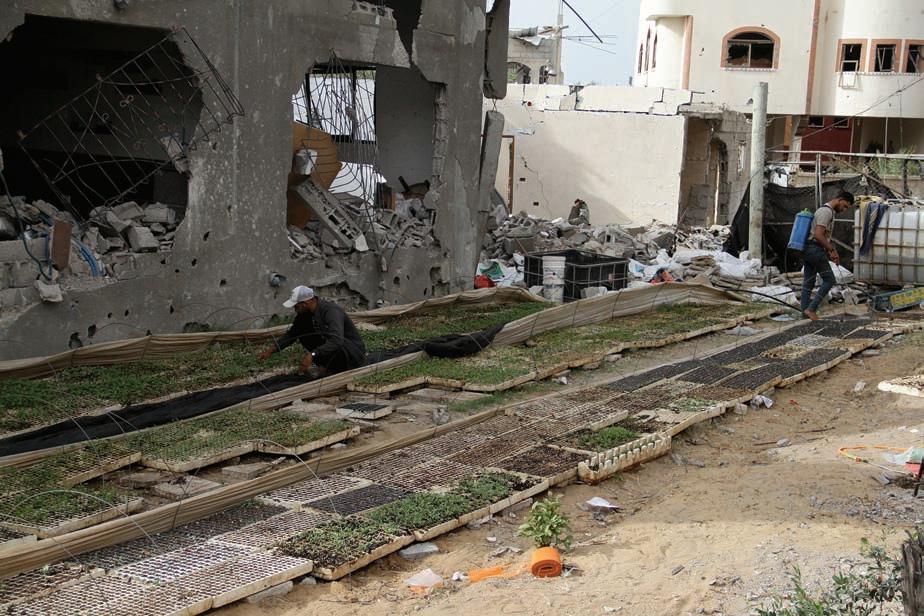
Palestinian farmer Youssef Abu Rabieh launches his own agricultural initiative amid the rubble from ongoing Israeli attacks in Beit Lahia, Gaza on April 28, 2024. It is reported that Israel has destroyed 90 percent of agricultural lands and facilities in Gaza.
“DON’T TAKE TOO many things; we’ll only be gone for two days.” So said my mother as she removed some of the things— clothes, laptop, an item or two of sentimental value—I had put in the evacuation bag.
Because we were in a hurry—Israel threatened to bomb the street we live on—my mom left the unwashed breakfast plates in the sink. It hardly mattered, since we would be back in two days.
My father quickly collected our official papers, like certificates and other documents that do not mean anything to Israel. Because we expected to be back in a couple of days, we didn’t take money we had in the house.
I had never been out of Gaza City before. I always asked friends from the south to take me with them; for one reason or another,
Dima Maher Ashour majored in English at the Islamic University in Gaza. She is a writer from Gaza trained by We Are Not Numbers (WANN), a project to amplify the voices of young Palestinian writers.
By Dima Maher Ashour
it never worked out. I finally went south but only when Israel forced me to go there as a displaced woman. I took with me a few documents, my notebook and my mobile phone. And now Israel prevents me from going back home.
In Gaza, simple transactions are no longer possible. For example, withdrawing money from an ATM usually takes less than five minutes, but now it can take hours or even days. You might wait in a long queue for hours and not be able to withdraw money from your account. The banks are closed, of course, because they might be bombed.
The lack of access to funds makes a difficult situation impossible. Israel prevents most items—food, water, gasoline, toys, shoes and medicines—from entering the Gaza Strip, and now we cannot buy what little we find because we can’t access our bank accounts.
My mother, a chemistry teacher, stands in line in front of the bank entrance every day for several hours and comes back empty-handed. Last week, she went to a Bank of Palestine ATM and found it broken. Not surprisingly, in light of current conditions, no one cared to fix it. Eventually she was able to withdraw about 3,000 shekels ($801) with a 15 percent commission fee (about 450 shekels or $120). Commission fees that high can quickly drain bank accounts.
Hamed had a barber shop in Gaza. His neighbors knew him and praised his skill in hair cutting. He stayed in Gaza when my family evacuated, but he moved to other streets far from his home and shop.
Eventually, the occupation forced him to go south through what is euphemistically called a “safe passage.” He left but couldn’t take his tools to continue his skillful work and provide for his family.
Like the rest of us, he is trapped in the south now. He has been forced to pawn some of his possessions so that he can buy basics for his family.
He loved his work and his customers, and he believed in the saying “love what you do to do what you love.” But Israel managed to kill that.
Maher Amer owns Amer’s Companies, which sells hardware. Israel bombed all branches of the company, leaving only one outlet in the Zaytoun neighborhood. He too was forced to evacuate to the south of the Gaza Strip, so he went to Khan Younis.
Just as he began to settle there, Israel ordered the people of Khan Younis to evacuate to Rafah. He rented an apartment there for his family.
When fears of a Rafah invasion began, he decided to move to a tent in Deir al-Balah.
Then came the news that his company warehouses, his house and his last shop in the Zaytoun neighborhood had been
burned. Thinking about the future now exhausts him. His daughter was studying medicine but Israel destroyed her university; where will she go now and how will she pay her tuition fees? Where will he and his family live after their home has been burned down? How will he find work and where will he start?
Those who are not killed by Israel during this war will have to contend with the destruction of their work and homes. They will have to start their lives from scratch.
Israel killed our loved ones and demolished our homes. It also stole time from us. October is the olive harvest season, which we have been waiting for all year. It stole December and January, the month of oranges and clementines. I can hardly believe it also stole the month of February, which we typically spent in strawberry farms.
“I have never taken care of my trees as I took care of them this year; I spent
(Advertisement)
my life on them,” Abu Hussein, a 78year-old farmer from Gaza, told the Washington Report
“I couldn’t even say goodbye to them. I didn’t know I wouldn’t eat olives and oil from my trees this year.”
Since the age of ten, Abu Hussein has spent his days on his land cultivating and caring for it. This was not the first time that the occupation razed his land or caused a war that prevented him from reaping its fruits. His farm was the source of his income; he raised his 11 children from its bounties.
The occupation forced him to evacuate to the south.
A week after he arrived, he received news that Israeli bulldozers had destroyed his farm, and with it thousands of trees.
The thought of his ruined farm brings tears to his eyes, but he is determined: “I’m waiting for a ceasefire so I can return and replant my land.” ■

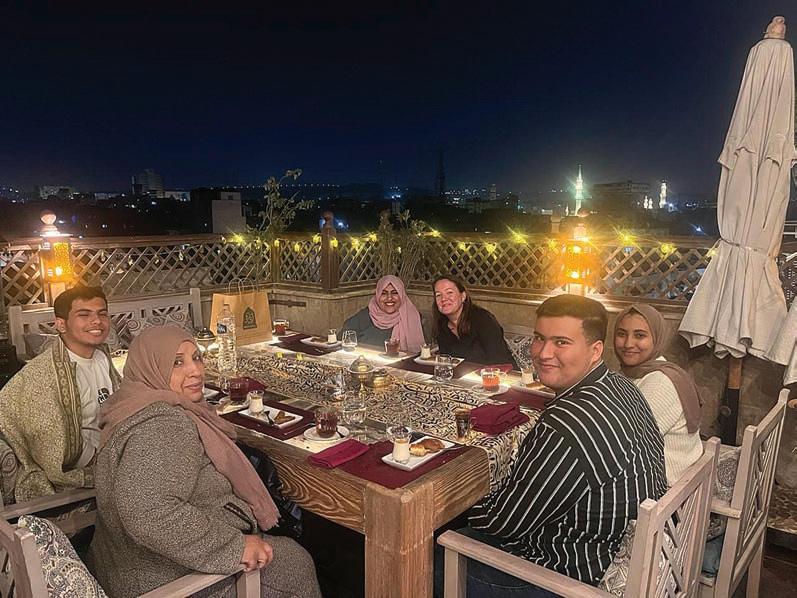
ON DAY 149 of the genocide in Gaza, I managed to escape. I didn’t escape alone; I fled with my mother, sister Lamar, and brothers Yosof and Saleh. They are dearest to my heart. If I had escaped alone, I would have felt that I hadn’t survived. It is they who make me feel safe here in Egypt. We lived successes, failures, laughs, tears, weddings, funerals and all the attacks on Gaza together. We may not be the best family you can find; there were moments when we hurt each other and caused each other pain. However, it was never intentional.
We grew up in the Gaza Strip where hardships are viewed as normal.
We never surrendered. We learned to hide all the heartbreaks, all the pains, all the trauma. All of it. We could hide everything, while the world was getting harder and harsher on us, letting the siege
Shahd Safi is a Gazan journalist who trained with We Are Not Numbers (WANN), a project to amplify the voices of young Palestinian writers.
By Shahd Safi
around us get tighter, while the occupation grew wider and deeper, more entrenched.
My grandparents were from Qastina, a village in the Gaza district. In 1948, they were kicked out of their village and made their way to Gaza City. My father was born in al-Bureij refugee camp in Gaza. He married a woman whose family was displaced to Egypt. She returned to Palestine after the Oslo Accords were signed; they met in Gaza and got married. Three years later, I was born in Deir al-Balah.
Sixteen years later, my father, the person dearest to me, abandoned the family, a move that left me deeply shocked. I couldn’t express it, though, because the entire family was shocked into silence. It felt weak to express sadness in a place where crying or complaining means that one has surrendered to the hardships imposed on us by the Israeli occupation. It was not my father’s abandonment that broke us. It was the cumulative intense pain of growing up in Gaza.
Our grandparents witnessed the Nakba, the catastrophe during which Palestine was depopulated and occupied in 1948. Their unexpressed anger, deep contempt for the new state, and agony of watching loved ones killed passed down to us—an unresolved trauma that seeped into our bodies.
I grew up in a land in which poverty is systematically created even though people are educated; where the sea is rich but its people are not because they are not allowed to fish freely. We have airports that can’t be used because they’ve been bombed; farms with limited exporting capacity; and factories that are bombed almost as soon as they are built.
We lived with electricity shortages which made it hard to go to school with ironed clothes (and sometimes washed and clean ones), and boredom when we could not watch our favorite childhood cartoons, “Tom and Jerry,” while other children could easily watch whatever show they wanted. The schedule of 8 hours of electricity a day
that I remember is crystal clear, one that all Palestinians from Gaza of a certain age will never forget. We had to structure our study schedule around it. Sometimes the 8 hours came during the day, and other times during the night, so you had to pay attention to know when to wake up and study, otherwise you would study by candlelight, which tires your eyes so much that you can barely see, but if you have an exam the next day you fight to stay awake. I remember my mother structured her sleep around electricity. She needed to make sure the laundry was done, otherwise she would have to wash clothes by hand in cold water.
We drank water we knew to be dirty because that was all that was available.
Growing up, I didn’t meet any foreigners at all. That is why I learned English; I was curious about them. My parents used to tell me to develop my language skills: “Shahd, if you want to travel, learn English. If you want to succeed, learn English.”
The 17-year siege prevented many from traveling. Students made superhuman efforts to secure scholarships so they could apply for a travel permit; otherwise, you had to be very sick and urgently need treatment abroad to get a permit. And even if you meet these requirements, you still might not get the permit, even though you know you did nothing wrong, and you cannot even complain. The Israeli occupation is the reason; it manipulates your life as if you were a slave or even less, a subhuman.
This was the chronic trauma we lived with before Israel turned to genocide.
We left Gaza because of the constant fear that we might be killed at any moment by their rockets, bombs or in the rubble that might shatter our bodies into a million pieces and bury us. The fear of seeing a loved one experience what you have lived through. The fear of being harassed, abducted, raped, stripped of clothes, handcuffed, blindfolded, hit, beaten, or forced to see that happening to your very loved ones.
We saw social media manipulate the truth and experienced it like a knife in the
heart, each exposure a betrayal by humanity. The algorithms of Facebook and Instagram can spot your ID and act accordingly.
When I close my eyes, I hear the screams of people being killed in Gaza, of children asking for help, of the elderly struggling to escape a nearby bombing, the helpless cries of pregnant women experiencing C-sections without anesthesia. I hear all that and more. After all my family and I have been through, we cannot fathom how humans would do such crazy, cruel things to other humans. We do our best to protect our humanity no matter what.
I left Gaza, but Gaza didn’t leave me. We are in Cairo now, trying to survive with the money we could collect from the GoFundMe campaign I launched with the help of my friend, Kari Ayoob, and we are anxious about what will happen when we run out of money. I still feel guilty every time I eat dessert, rice or meat. I feel guilty every time I find myself enjoying celebrations of Ramadan while my people are experiencing genocide. I still have nightmares of being killed in Gaza. I still get extremely anxious when I hear a noise similar to rockets, such as a car crashing or a civilian plane taking off from the airport. I tremble and shake when I hear the sounds of Egyptians celebrating Ramadan with fireworks, which sound like explosions to my ears.
What future will I have? How will my family and I manage to survive? My mother struggles with diabetes and high blood pressure and I am very anxious for her. She is my number one person on earth; if anything happens to her, I am doomed. Her blood pressure is on the rise because her siblings and their children are still in Gaza, and she is terrified for them. Gaza, our home, is being destroyed.
Even though Gaza or even Palestinian land can be destroyed, our sense of identity will never falter; our identity as Palestinians is more than a piece of land. Palestine is our connection to the land, it is our connection to other Palestinians in the West Bank and the diaspora. It is our unbreakable attachment to our culture, to our
cuisine and most importantly to our customs. That is why now I feel and can confidently say I am Ghazzawiyya and I am Qasteeniyya because to put it simply I am Falasteeniyyta and that is my solid identity regardless of the pain that comes with holding such an identity.
Since leaving Gaza, I have experienced intense guilt, but I keep reminding myself that even if I was in Gaza, I would have not been able to provide my people with any help and I would just remain scared for my family members and me. I still have extended family in Gaza and I still talk and check in with some of them, but connectivity problems in Gaza limit my ability to reach some of them.
Many of my friends were killed during the attack. Mahmoud Al Naouq, Yossof Dawwas, Nadia Abdel-Latif, Mohammed Hammo and Asma’a Al Baba were killed along with other family members, which left my heart burdened with so much pain. I still have many dear friends in Gaza, but the closest are Eman, Haya and Samar, and I am very anxious for them. I hope they survive this cruel attack. We talk now and then but their news is not reassuring. How would it be? The Israeli attack on my people in Gaza is still ongoing.
My mother is worried about our education. I was in my senior year when the attack broke out and now my university is bombed; my brother Saleh was in his junior year, and his university was also bombed. My brother, Yosof, just finished high school and wanted to enroll in an IT program. My sister Lamar was a senior in high school, the outcome of which would determine what fields of study were available to her. Now, all of our plans seem like mirages because all universities in Gaza were bombed. We are all very anxious and scared and are trying to hold on. We don’t deserve this; no one does.
Will we ever return to Gaza? Will we be granted asylum in Egypt? Will we ever find safety, stability and a place that belongs to us and one that we can belong to? When will the refugee status chapter in my family’s life finally end? ■
By Faress Arafat

A child injured by Israeli attacks is treated at Al‐Shifa Hospital on the 17th day of bombing and shelling in Gaza City, Gaza on Oct. 23, 2023.
EVERYONE WHO WORKS in the medical field in Gaza faces challenges at work, which can usually be managed with careful deliberation. But since Israel’s savage war on Gaza began seven months ago, nurses and doctors have had to face the heartbreaking dilemma of choosing between the life of one patient over another.
In light of the shortage of medical teams and supplies in Gaza, the increase in the number of casualties and direct indiscriminate bombing of civilians, it is not possible to manage care for all the injured individuals at the same time. Therefore, we are sometimes forced to prioritize patients.
We consider various factors and must make split-second decisions when dealing with injured individuals, leaving no time for deep contemplation.
For more than 40 days, I worked as a volunteer nurse in the emergency department at Al-Shifa Hospital and had to deal with many challenging situations.
Faress Arafat graduated from the Islamic University of Gaza with a bachelor’s degree in nursing in October 2023. He trained with We Are Not Numbers (WANN), a project to amplify the voices of young Palestinian writers. After living in a tent with his family and working in a medical facility in a camp in Rafah, he evacuated to Cairo.
One day, after Israeli bombing from aircraft and shelling from the ground targeted one of the streets surrounding the Al-Shifa Complex—and this was perhaps one of the most violent explosions I ever heard—we received a large number of injured patients. As residents of Gaza, with the experience we obtained from the history of wars, we know that artillery shelling causes serious injuries from flying shrapnel.
At that time, the whole team and I were in shock. Many patients arrived and we were already very exhausted, with only five doctors and seven nurses available. Who would we deal with first and how?
We began to prioritize those who had a better chance of survival with medical intervention. We rushed to one of the injured—a young man who was injured by several shrapnel pieces in his abdomen and chest. He was breathing relatively hard, and his injury was complicated. He was wearing a wedding ring, proof that he had a family. Next to him was a 7-year-old child who was injured by shrapnel in his chest and suffering hemothorax (collection of blood in the lungs).
The choice was difficult, but the child had a better chance at survival if he had a chest tube installed. If we started treating the young man first, his chances for survival were low, and in the meantime the child would die too. So both patients would likely die, and the child would die before he had a chance to live.
We decided to attend to the child, and the next available doctor would start working on the young man. Unfortunately, the young man died faster than expected because the shrapnel tore his intestines. Even small pieces of shrapnel have pointed blades that are capable of cutting through stone.
As for the child, we installed a tube in his chest to withdraw the blood accumulated in the lungs. He was transferred to the imaging unit and then to the intensive care department. He is recovering from his injury.
Sometimes, we face dilemmas in which we have to choose between our own needs and those of another person.
on page 64
By Younes Jalal Elhallaq
JUST OVER a year and a half ago, in December 2022, the whole world was passionately celebrating the victory of the national teams competing in the World Cup semifinals. Back then, Gazans watched with fevered enthusiasm as their favorite team scored the winning goals, as though their children were among the players. The sounds of cheers rang in every home and through the streets of Gaza, full of excitement and enthusiasm as Morocco and Argentina advanced to the final matches.
I was with my family in the Saad Sayel sports hall in Gaza City when the games kicked off and I remember screaming wildly as the soccer ball flew in the air and arched its way toward the goalie. We all held our breaths as the ball narrowly missed the goalposts and rolled to the sides of the field. My mother had fueled our excitement by urging us to buy the flags of Argentina and Morocco and we waved them, united in our admiration and love for teams during the semifinals.

Palestinians gather in the recently renovated Saad Sayel sports hall in Gaza City to share the excitement and watch the World Cup semifinals in December 2022. The club was damaged by an Israeli explosion a year later. The author’s father always emphasized the unity of people, saying, “united we stand; divided we fall.”
our beloved Issam Chaouali, a Tunisian commentator, gave vivid but succinct commentaries on the matches.
In those moments, as every Palestinian waited impatiently for the final game, we forgot the suffering that the siege caused with intermittent electricity that could have cut short or even prevented us from watching the game altogether.
Soccer is in the blood of Palestinians; we would never lose the ability to enjoy a soccer game like this one. Though many of us were not able to watch the game on TV or the Internet, we managed to follow the matches on the radio and listened with keen interest as
Younes Jalal Elhallaq is a senior at Islamic University in Gaza. He is an English literature and language major and hopes to complete his degree despite the destruction of his university. He has published with We Are Not Numbers and other online platforms.
Gazans found a kindred spirit with the Argentine national football team that had suffered defeat many times before but were resilient like us and kept their focus on winning. Gazans were eager to have Argentina win although we also treasured the art of the game for the unity it brought. After all, football is a game that brings all people together and makes us all equal on the football field.
On another occasion, it was Brazil that won my admiration and I remember watching Brazilian matches with awe when Richarlison de Andrade scored his first goal. We felt so proud of the competing teams because they reminded us of how we grew up, loving humanity even when we were competing with one another.
By Diana Safieh



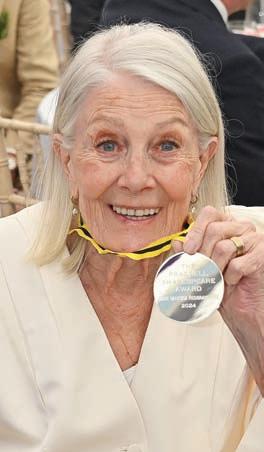
Celebrities were seen wearing a red pin at this year's Oscars ceremony and Grammy Awards to support a ceasefire between Israel and Hamas, amid the war on Gaza, part of the Artists4Ceasefire movement. (L‐r) Mark Ruffalo at an Oscar party,
at the Academy Awards and Annie Lennox at DAR Constitution Hall are wearing the pins. Long‐time activist
won the Pragnell Shakespeare Birthday Award, on April 20, 2024, in Stratford‐upon‐Avon, England.
THE DECISION TO stay neutral on political issues can be a strategic move for celebrities navigating the complex landscape of public opinion, as they aim to preserve their appeal to a wide audience and avoid potential backlash. Taking a controversial stance can alienate fans, damage brand partnerships, lose endorsements and sponsorships and jeopardize future roles. So why take the risk and speak out at all?
In recent years, high-profile personalities have use their platforms to share information about causes that matter to them and see that as an act of empowerment. It is a recognition of their voice as a catalyst for change and a rejection of apathy in the face of injustice. By leveraging their influence, they have the opportunity to amplify marginalized voices, shine a spotlight on underrepresented issues and challenge the status quo.
Taylor Swift was clearly thinking of the cost when she delayed revealing which presidential candidate she was supporting in 2020 and 2024; she did not want to risk alienating supporters on either side of the political spectrum. On the other hand, Colin Kaepernick, the former NFL quarterback, knowingly sparked controversy when he chose to kneel during the national anthem
Diana Safieh is a writer and podcaster whose areas of expertise are Palestine, true crime and anything even slightly unusual. She currently works with St John Eye Hospital and the Balfour Project in the UK.
before games to protest police brutality and racial inequality in the United States. This ultimately led to his unofficial boycott by NFL teams, ending his professional football career. But he couldn’t not do something. And the attention it brought the cause was immense.
But the Israel/Palestine conflict is one of the most complex and contentious geopolitical issues of our time, rooted in decades of historical grievances, settler colonialism and territorial disputes. Social media platforms become battlegrounds where fans and followers engage in heated debates, often resorting to personal attacks, accusations of misinformation and harassment. So why would stars risk using their platforms to advocate for social and political causes, when they could choose to remain silent, avoiding the pitfalls of polarizing discourse?
In 2014, American actress Scarlett Johansson faced criticism after she became the face of SodaStream, a controversial Israeli company which operated in a West Bank settlement. The actress stepped down from her role as Oxfam ambassador after the international relief organization criticized her contract with the carbonated drink machine. Many pro-Palestine activists viewed her association with the company they boycotted as complicity in Israel’s illegal occupation of Palestinian territories.
On the other side of the fence, distinguished actress Vanessa Redgrave, who has been outspoken in her support for various
causes, including Palestinian rights and opposition to the Iraq War, has faced widespread criticism and boycotts of her films. In 1978 when she gave her acceptance speech for the Oscar for Best Supporting Actress for her role in “Julia,“ Redgrave condemned “Zionist hoodlums” who had protested her starring in a World War II movie as an antifascist fighter because of her involvement in a documentary sympathetic to the Palestinian cause. Despite her undeniable talent, Redgrave’s political activism has at times overshadowed her acting career.
And let’s not forget Mark Ruffalo, from “Poor Things” and a Marvel movie star, who has undeniable screen appeal yet is underrated as an actor, very likely because of his stances on political and environmental issues.
As for celebrities of Palestinian heritage, like Bella and Gigi Hadid, we expect them to speak out on Palestine. But even for them (not to mention other Palestinian Americans), this is a tough decision because it is likely to have a negative impacting on their careers. In the entertainment industry, you can be Palestinian, but please do so quietly.
Recent initiatives, such as the Artists4Ceasefire letter signed by hundreds of prominent figures like Jon Stewart, Jennifer Lopez and Selena Gomez, reflect the growing activism among celebrities to address the humanitarian crisis in Israel and Palestine. EgyptianAmerican stand-up comedian Ramy Youssef told Variety on the red carpet, “We’re calling for immediate, permanent ceasefire in Gaza. We’re calling for peace and lasting justice for the people of Palestine.” At the 2024 Grammy Awards, musician Annie Lennox finished her in memoriam tribute to Sinéad O’Connor by saying, “Artists for ceasefire, peace in the world.”
Advocating for equal rights can be controversial, as ludi-
crous as that might seem. Susan Sarandon was dropped by her talent agency and Melissa Barrera was let go from the “Scream” film franchise for pro-Palestinian posts. The grounds for both actions were that the agency and film companies had zero-tolerance for anti-Semitism, which in the context of Israel/Palestine is confusing because Palestinians are Semitic. Today the charge of anti-Semitism is casually lobbed at anyone who advocates for Palestinian rights.
In recent years, Hollywood’s support and fundraising efforts for the Israel Defense Forces (IDF) have sparked both curiosity and controversy. A roster of influential celebrities, including Sacha Baron Cohen, Adam Sandler, Mayim Bialik, Jon Voight, Natalie Portman, Howard Stern and Sarah Silverman, have publicly voiced their support for Israel. And more than 2,000 celebrities signed a letter of support for Israel immediately after the Hamas attacks on Oct. 7, including Gal Gadot, Jamie Lee Curtis, Amy Schumer, Michael Douglas, Jerry Seinfeld, Helen Mirren, Debra Messing, Ziggy Marley, Mark Hamill and Sharon Osbourne. The signatories affirm their solidarity with Israel and condemn acts of violence targeting the country. Many celebrities, particularly those of Jewish heritage, feel a strong connection to Israel and see supporting the IDF as a way to show solidarity with the Jewish
(Advertisement)



state. The recent film “Israelism” questions this link between Judaism and unwavering support for Israel.
However, celebrity support for Israel at this time is seen as endorsing the Israeli government’s policies in Gaza, which has led activists and human rights organizations to call for boycotting and protesting their public appearances.
Considering all the worthy causes in the world, who fundraises for an army, especially when it is part of a country that is being investigated by the International Court of Justice (ICJ) for war crimes and genocide? Is it not safer to maybe hold off on this unwavering support until a court has determined whether crimes against humanity have been committed?
As someone who recently was asked, “Do you enjoy raping Jewish women while baking their babies in the oven, like the Arabs of Gaza do?,” I understand that there are risks when being vocal on this topic; it can be genuinely terrifying when the hate is pointed directly at you in black and white, as a direct message or email. But using one’s platform to advocate for causes that matter is not just a privilege, it is a duty.
To quote Matthew Teller, author of Nine Quarters of Jerusalem: A New Biography of the Old City, who spoke recently at a book event in London and advised the audience: when people ask you what you did during this genocide, don’t let the answer be “nothing.”
The world is finally listening. ■




By Jack McGrath
Most Americans oppose Israel’s war on Gaza, with a Gallup poll finding that only 36 percent approved of Israel’s “military actions” in March, compared to 50 percent in November. Of the 55 percent who are opposed, 75 percent are Democrats, 60 percent are Independents, and 30 percent are Republicans.
If such a paradigm shift were reflected in Congress, the unconditional military, diplomatic and financial support that the United States provides to Israel would be jeopardized.
HOUSE: CURRENT RACES
Latimer, George (D-NY)
Torres, Ritchie (D-NY)
Gottheimer, Josh (D-NJ)
Bell, Wesley (D-MO)
Jeffries, Hakeem (D-NY)
Schiff, Adam (D-CA)
Aguilar, Pete (D-CA)
Schultz, Debbie Wasserman (D-FL)
McCaul, Michael (R-TX)
Stefanik, Elise (R-NY)
In the 2023-2024 congressional cycle, pro-Israel political action committees (PACs) and affiliated donors have spent more than $37 million to bolster elected allies and fund candidates challenging anti-war incumbents. That sum comprises $24 million distributed to 356 members of the House of Representatives and $7.6 million to 40 senators, with $5.6 million donated to unelected candidates. Democrats are the foremost beneficiaries of pro-Israel funding: 214 Democratic candidates received $23.16 million, while $13.58 million was spent on 179 Republicans.
HOUSE: CAREER
Hoyer, Steny H (D-MD)
Gottheimer, Josh (D-NJ)
Latimer, George (D-NY)
Torres, Ritchie (D-NY)
Jeffries, Hakeem (D-NY)
Schneider, Brad (D-IL)
Brown, Shontel (D-OH)
Stevens, Haley (D-MI)
Schultz, Debbie Wasserman (D-FL)
Bacon, Donald John (R-NE)
The American Israel Public Affairs Committee (AIPAC) and its affiliates are expected to spend $100 million in Democratic primaries to try to oust members of Congress who do not unequivocally support Israel, particularly those in “The Squad.” Challenger Wesley Bell’s primary campaign against Representative Cori Bush (MO-1) is being bankrolled by the pro-Israel lobby, which has donated $827,094 since October. Representative Jamaal Bowman (NY-16) is fighting to retain his seat against challenger George Latimer, who has received $1,633,912 (more than any other candidate) from pro-Israel
Washington Report staff writer Jack McGrath is assistant director of Middle East Books and More bookstore.
$1,633,912
$1,229,070
$827,224
$827,094
$782,116
$548,971
$494,692
$404,608
$396,834
$383,537
SENATE: CURRENT RACES
Menendez, Robert (D-NJ)
Rosen, Jacky (D-NV)
Cruz, Ted (R-TX)
Schiff, Adam (D-CA)
Tester, Jon (D-MT)
Casey, Bob (D-PA)
Gillibrand, Kirsten (D-NY)
Wicker, Roger (R-MS)
Fischer, Deb (R-NE)
$1,103,810
$754,275
$671,578
$548,971
$497,082
$492,689
$459,382
$398,444
$378,668
Cramer, Kevin (R-ND) $350,740
SENATE: CAREER
$1,736,244
$1,697,263
$1,633,912
$1,571,087
$1,367,247
$1,346,167
$1,091,836
$990,064
$907,284
$829,976
Menendez, Robert (D-NJ)
McConnell, Mitch (R-KY)
Schumer, Charles E (D-NY)
Cruz, Ted (R-TX)
Wyden, Ron (D-OR)
Durbin, Dick (D-IL)
Schiff, Adam (D-CA)
Rubio, Marco (R-FL)
$2,500,005
$1,953,910
$1,725,324
$1,509,359
$1,280,376
$1,129,520
$1,023,967
$1,013,563
Rosen, Jacky (D-NV) $1,002,413
Graham, Lindsey (R-SC)
PACs since December.
$1,000,580
The following pages list the donations made to congressional candidates by the pro-Israel lobby and its stealth PACs during the 2023-2024 election cycle and throughout their careers. Candidates are required to report donations to the Federal Election Commission, which released these figures on April 22, 2024.The FEC updates its reports once a month and finalizes its numbers after the election. The Website OpenSecrets compiles those FEC reports. Visit <www.opensecrets. org> for the latest figures.
“Dark money” from nonprofits which are not obligated to report their donors and have no spending limits will also influence elections by running ads for or against candidates. Viewers don’t know the pro-Israel source of these ads, which rarely mention Israel. The sums spent on advertising are incalculable. ■
SewellTerri(D-AL)$34,794$90,054
TubervilleTommy(R-AL)$16,159$54,064
RogersMikeD(R-AL)$314,769$508,494 PalmerGary(R-AL)$26,600$86,370 MooreBarry(R-AL)$3,800$11,700 CarlJerry(R-AL)$37,142$50,892
StrongDale(R-AL)$24,349$42,724
PeltolaMary(D-AK)$30,575$38,254 LambMark(R-AZ)$6,303$6,303 CiscomaniJuan(R-AZ)$127,786$161,736 GallegoRuben(D-AZ)$88,726$154,194 LeskoDebbie(R-AZ)$20,250$71,650 EngelKirsten(D-AZ)$20,260$21,610 StantonGreg(D-AZ)$47,400$107,840 KellyMark(D-AZ)$250$496,271 AnsariYassamin(D-AZ)$10$10 SchweikertDavid(R-AZ)$38,404$175,368 GrijalvaRaulM(D-AZ)$2,250$73,833 SinemaKyrsten(I-AZ)$221,685$424,379
Arkansas WestermanBruce(R-AR)$22,758$49,261 CottonTom(R-AR)$200$237,077 WomackSteve(R-AR)$40,600$79,783 HillFrench(R-AR)$19,400$41,800 CrawfordRick(R-AR)$6,250$15,900
California McCarthyKevin(R-CA)$160,141$564,068 HarderJosh(D-CA)$8,800$216,368 LaMalfaDoug(R-CA)$7,396$16,296 RivasLuz(D-CA)$106,500$106,500 $3,000$21,650 GarciaMike(R-CA)$107,304$256,434 ObernolteJay(R-CA)$7,073$17,873 $132,953$299,103 GaramendiJohn(D-CA)$6,500$104,350 PanettaJimmy(D-CA)$241,796$255,571 ShermanBrad(D-CA)$134,383$771,883 BeraAmi(D-CA)$5,973$216,827 ThompsonMike(D-CA)$9,801$61,351 KimYoung(R-CA)$226,572$404,516 GomezJimmy(D-CA)$140,923$154,623 LieuTed(D-CA)$114,610$315,955 CostaJim(D-CA)$90,873$349,424 JacobsSara(D-CA)$12,795$60,145 MullinKevin(D-CA)$10,948$46,498 McClintockTom(R-CA)$28,923$50,123 IssaDarrell(R-CA)$26,784$79,082 BrownleyJulia(D-CA)$26,523$165,679 CardenasTony(D-CA)$36,050$192,014 PelosiNancy(D-CA)$24,534$620,732 ValadaoDavid(R-CA)$42,010$118,508 KileyKevin(R-CA)$23,410$36,910 WeissJoanna(D-CA)$44,450$44,450 SwalwellEric(D-CA)$22,478$193,371 SanchezLinda(D-CA)$47,523$165,143 BarraganNanette(D-CA)$49,523$215,557 SteelMichelle(R-CA)$89,349$252,328 $$
The Career Total column represents the total amount of pro-Israel PAC money received from Jan. 1, 1990 through April 22, 2024. S=Senate, H=House of Representatives. Party affiliation: D=Democrat, R=Republican, Ref=Reform, DFL=Democratic Farmer Labor, Ind=Independent, Lib=Libertarian, WFP=Working Families Party. Status: C=Challenger, I=Incumbent, N=Not Running, O=Open Seat (no incumbent), P=Defeated in primary election. *=Senate election year, #=House member running for Senate seat, †=Special Election. Committees (at time of election): A=Appropriations, AG=Agriculture (D=Defense subcommittee, FO=Foreign Operations subcommittee, HS=Homeland Security, NR=Natural Resources, NS=National Security subcommittee), AS=Armed Services, B=Budget, C=Commerce, FR=Foreign Relations (NE=Near Eastern and South Asian Affairs subcommittee), HS=Homeland Security, I=Intelligence, IR=International Relations, NS=National Security, WM=Ways and Means.– indicates money returned by candidate, 0 that all money received was returned.
BarraganNanette(DCA)$49,523$215,557
SteelMichelle(R-CA)$89,349$252,328 EshooAnna(D-CA)$19,850$105,425 MorseJessica(D-CA)$15,494$15,494 LevinMike(D-CA)$65,873$295,330 KamlagerSydney(D-CA)$15,250$36,260 TorresNorma(D-CA)$67,100$87,273 DuarteJohn(R-CA)$14,710$17,860 PetersScott(D-CA)$14,600 CalvertKen(R-CA)$360,730$509,307 GarciaRobert(D-CA)$12,000$87,700 KhannaRo(D-CA)$11,850$93,350 RuizRaul(D-CA)$77,518$182,347 MatsuiDoris(D-CA)$11,323$45,221 TakanoMark(D-CA)$16,200$82,580 LofgrenZoe(D-CA)$3,000$67,735 RollinsWill(D-CA)$29,950$46,400 LeeBarbara(D-CA)$13,400$83,840 CarbajalSalud(D-CA)$2,500$55,215 ChuJudy(D-CA)$1,000$37,016 SimitianJoe(D-CA)$750$750 HuffmanJared(D-CA)$2,065$56,635 $616$616
AguilarPete(D-CA)$494,692$734,428 $548,971
PorterKatie(D-CA)$11,750$204,585
Colorado FrischAdam(D-CO)$68,653$88,613 NeguseJoseph(D-CO)$103,090$145,140 DeGetteDiana(D-CO)$8,000$81,575 LambornDoug(R-CO)$57,004$294,604 CaraveoYadira(D-CO)$87,978$147,451 PettersenBrittany(D-CO)$48,662$98,114 CrowJason(D-CO)$10,100$204,702 BennetMichael(D-CO)$3,300$462,940
Connecticut HayesJahana(D-CT)$18,475$68,562 HimesJim(D-CT)$23,480$77,480 DeLauroRosa(D-CT)$19,997$172,197 CourtneyJoe(D-CT)$5,500$60,100
Delaware RochesterLisaBlunt(D-DE)$7,960$28,110 CarperTom(D-DE)$23,550$194,270 McBrideSarah(D-DE)$35$35
Florida PoseyBill(R-FL)$1,500$36,000 CastorKathy(D-FL)$18,960$88,910 SotoDarren(D-FL)$57,380$133,595 WaltzMichael(R-FL)$95,700$190,999 Cherfilus-McCormickSheila(D-FL)$101,758$142,283 DunnNeal(R-FL)$750$17,450 ScottRick(R-FL)$259,447$371,255 FranklinScott(R-FL)$37,250$47,250 GimenezCarlos(R-FL)$24,850$192,312 BilirakisGus(R-FL)$25,900$129,710 WebsterDaniel(R-FL)$29,000$48,600 MoskowitzJared(D-FL)$129,210$172,010 FrostMaxwell(D-FL)$11,400$11,400 BuchananVernon(R-FL)$2,000$59,550 SchultzDebbieWasserman(D-FL)$404,608$907,284 Diaz-BalartMario(R-FL)$280,456$670,455
RutherfordJohn(R-FL)$5,500$44,650 $162,547$602,696 WilsonFrederica(D-FL)$5,000$40,250 FrankelLois(D-FL)$181,702$475,442
Georgia WarnockRaphael(D-GA)-$4,301$929,776 FergusonDrew(R-GA)$250$49,700 ScottDavid(D-GA)$28,550$109,000 LoudermilkBarry(R-GA)$33,050$66,400 AllenRichardW(R-GA)$16,000$36,000 McCormickRichard(R-GA)$42,300$72,950 CarterBuddy(R-GA)$21,314$48,214 JohnsonHank(D-GA)$500$111,800
CarterBuddy(RGA)$21,314$48,214 JohnsonHank(D-GA)$500$111,800 WilliamsNikemaNatassha(D-GA)$90,390$100,040 JackBrian(R-GA)$1,002$1,002 McBathLucy(D-GA)$271,663$333,578
Hawaii CaseEd(D-HI)$1,000$38,500 HironoMazieK(D-HI)$7,966$51,516
Idaho FulcherRuss(R-ID)$6,000$15,400 SimpsonMike(R-ID)$6,000$18,900
Illinois SchakowskyJan(D-IL)$54,069$737,266 BudzinskiNikki(D-IL)$49,315$139,710 DurbinDick(D-IL)$14,350 JacksonJonathan(D-IL)$2,900$15,800 BostMike(R-IL)$59,320$148,193 FosterBill(D-IL)$48,880$545,194 KrishnamoorthiRaja(D-IL)$88,910$293,920 DavisDannyK(D-IL)$4,500$63,984 UnderwoodLaurenA(D-IL)$10,003$75,841 SorensenEric(D-IL)$89,640$149,542 $379,693 MillerMary(R-IL)$1,500$4,250 RamirezDelia(D-IL)$3,750$13,125 LaHoodDarin(R-IL)$28,910$106,887 GarciaJesus(D-IL)$2,000$20,910 KellyRobin(D-IL)$23,359$114,731 Conyears-ErvinMelissa(D-IL)$39,550$39,550
Indiana CarsonAndre(D-IN)$1,000$23,553 SpartzVictoria(R-IN)$23,700$69,511 HouchinErin(R-IN)$5,000$13,900 YakymRudy(R-IN)$46,959$74,609 BanksJim(R-IN)$200,080$245,100 MrvanFrankJr(D-IN)$47,482$71,182
Iowa FeenstraRandy(R-IA)$31,452$52,602 HinsonAshley(R-IA)$39,500$80,054 ErnstJoni(R-IA)$63,882$505,435
Kansas DavidsSharice(D-KS)$33,850$151,775 LaturnerJake(R-KS)$28,043$46,623 EstesRon(R-KS)$35,155$53,055
Kentucky BarrAndy(R-KY)$72,288$296,261 McGarveyMorgan(D-KY)$71,953$95,153
Louisiana GravesGarret(R-LA)$44,700$98,300 ScaliseSteve(R-LA)$300,229$718,119 LetlowJulia(R-LA)$45,900$85,000 CassidyBill(R-LA)$38,133$363,202 CarterTroy(D-LA)$26,600$51,100 JohnsonMike(R-LA)$321,713$364,363
Maine KingAngus(I-ME)$78,863$251,423 GoldenJared(D-ME)$318,299$502,830 PingreeChellie(D-ME)$2,000$73,593
Maryland HarrisAndy(R-MD)$21,588$109,944 RaskinJamie(D-MD)$38,613$205,152 ElfrethSarah(D-MD)$173,970$173,970 RubinJoel(D-MD)$75$6,725 HoyerStenyH(D-MD)$166,100 MfumeKweisi(D-MD)$24,750$165,000 IveyGlenn(D-MD)$43,966$807,215 RuppersbergerDutch(D-MD)$1,500$76,700 $241,521$241,521 OlszewskiJohnAnthonyJr.(D-MD)$55,076$55,076 TroneDavid(D-MD)$103,600$106,100
Massachusetts $10,250$60,275 WarrenElizabeth(D-MA)$5$298,493 MarkeyEd(D-MA)$1,250$138,421 AuchinclossJake(D-MA)$314,954$507,865 KeatingBill(D-MA)$2,850$26,395 ClarkKatherine(D-MA)$237,245$393,694 NealRichardE(D-MA)$2,500$86,800 MoultonSeth(D-MA)$19,180$79,316 TrahanLori(D-MA)$14,563$45,113
Michigan
TrahanLori(D-MA)$14,563$45,113
BergmanJohn(R-MI)$31,450$82,004
DingellDebbie(D-MI)$5,160$34,860
ThanedarShri(D-MI)$97,890$97,890
KildeeDan(D-MI)$8,674$28,100
MoolenaarJohn(R-MI)$32,500$65,100
SlotkinElissa(D-MI)$133,737$534,121
StevensHaley(D-MI)$103,650$990,064
ScholtenHillary(D-MI)$82,524$230,232
HuizengaBill(R-MI)$2,000$55,729
Minnesota McCollumBetty(D-MN)$1,000$58,100
KlobucharAmy(D-MN)$207,658$707,809
CraigAngie(D-MN)$201,249$307,763
EmmerTom(R-MN)$252,812$285,462
Mississippi KellyTrent(R-MS)$250$8,150
Missouri
GuestMichael(R-MS)$5,000$34,700
WickerRoger(R-MS)$398,444$716,975
AlfordMark(R-MO)$2,000$7,000
SmithJason(R-MO)$44,193$91,043 $5,200$6,600
GravesSam(R-MO)$1,500$30,250
BurlisonEric(R-MO)$5,500$10,500
SchmittEric(R-MO)$8,100$88,150
LuetkemeyerBlaine(R-MO)$5,250$19,032 BellWesley(D-MO)$827,094$827,094 WagnerAnn(R-MO)$6,841$33,007 CleaverEmanuel(D-MO)$18,599$93,199 SheehyTim(R-MT)$58,583$58,583 ZinkeRyan(R-MT)$30,294$74,244 TesterJon(D-MT)$497,082$789,852
Nebraska BaconDonaldJohn(R-NE)$339,221$829,976 FischerDeb(R-NE)$378,668$540,318
VargasTony(D-NE)$5,750$46,841
SmithAdrian(R-NE)$6,100$11,450
RickettsPete(R-NE)$161,229$161,229
FloodMike(R-NE)$7,100$19,600
Nevada BrownSam(R-NV)$28,349$28,349 RosenJacky(D-NV)$754,275
$145,013$232,918
HelgelienElizabeth(R-NV)$10,400$10,400 HorsfordSteven(D-NV)$83,950$147,489
MarchantJim(R-NV)$17,800$25,350 TitusDina(D-NV)$23,200$144,997
New Hampshire PappasChris(D-NH)$273,235$473,774
KusterAnn(D-NH)$22,824$333,986
New Jersey ColemanBonnieWatson(D-NJ)$11,600$86,731 $1,250$40,550
SherrillMikie(D-NJ)$25,070$193,717
MenendezRobert(D-NJ)
PascrellBillJr(D-NJ)$46,100$174,563
NorcrossDon(D-NJ)$57,860$173,610 KeanThomasHJr(R-NJ)$115,537$315,284
SmithChris(R-NJ)$54,600$265,675
KimAndy(D-NJ)$10,200$360,452
VanDrewJeff(R-NJ)$48,038$111,394
MenendezRob(D-NJ)$136,450$206,000
New Mexico StansburyMelanie(D-NM)$8,516$32,883 HeinrichMartin(D-NM)$63,109$322,244
VasquezGabe(D-NM)$2,700$30,540 FernandezTeresaLeger(D-NM)$10,650$66,094
New York JeffriesHakeem(D-NY)$782,116
StefanikElise(R-NY)$383,537$592,164
TonkoPaul(D-NY)$19,425$64,046
MolinaroMarc(R-NY)$61,354$92,374
EspositoAlison(R-NY)$30,150$30,150
EspositoAlison(R-NY)$30,150$30,150 MengGrace(D-NY)$233,767$374,492 GoldmanDan(D-NY)$193,775$194,775 SuozziTom(D-NY)$193,665$316,225 RyanPat(D-NY)$183,804$212,654 LawlerMike(R-NY)$180,540$185,540 NadlerJerrold(D-NY)$12,800$268,623 VelazquezNydia(D-NY)$12,140$49,162 MalliotakisNicole(R-NY)$70,600$184,306 ClarkeYvette(D-NY)$11,650$81,756 GarbarinoAndrew(R-NY)$73,790$121,440 EspaillatAdriano(D-NY)$114,510$147,960 LangworthyNick(R-NY)$29,849$53,249 PilipMaziMelesa(R-NY)$291,189$291,189 TenneyClaudia(R-NY)$17,000$127,099 MeeksGregory(D-NY)$343,362$523,141 KennedyTimothy(D-NY)$25,795$25,795 JonesMondaire(D-NY)$31,450$131,513 LaLotaNick(R-NY)$27,100$27,600 Ocasio-CortezAlexandria(D-NY)$34$364 GillibrandKirsten(D-NY)$459,382 WilliamsBrandon(R-NY)$42,952$51,952 MorelleJosephD(D-NY)$36,550$100,350 D'EspositoAnthony(R-NY)$42,880$50,780
North Carolina MooreTim(R-NC)$25,100$25,100 DavisDon(D-NC)$250,258$519,586 RouzerDavid(R-NC)$17,321$25,721 EdwardsChuck(R-NC)$35,339$45,839 FoxxVirginia(R-NC)$62,135$127,735 MurphyGreg(R-NC)$36,858$63,258 NickelWiley(D-NC)$37,608$42,208 AdamsAlma(D-NC)$1,000$23,114 JacksonJeff(D-NC)$3,500$16,700 HudsonRichard(R-NC)$102,357$163,586 RossDeborah(D-NC)$52,258$215,557 FousheeValerie(D-NC)$13,775$440,230 HarriganPat(R-NC)$2,000$2,000 ManningKathy(D-NC)$234,228$553,356 McHenryPatrick(R-NC)$66,550$236,509 CramerKevin(R-ND)$350,740$397,440
Ohio BrownSherrod(D-OH)$215,426$878,299 WenstrupBrad(R-OH)$34,300$68,325 BeattyJoyce(D-OH)$31,550$60,700 BrownShontel(D-OH)$73,050 SykesEmilia(D-OH)$68,716$95,378 MillerMax(R-OH)$158,743$193,808
$13,050$39,850 DolanMatt(R-OH)$3,300$3,300
$3,300$31,450
$7,500$37,600 MorenoBernie(R-OH)$61,250$62,250
$41,575$78,664
$19,900$102,500
$8,430$200,729 CareyMike(R-OH)$21,500$31,300 TurnerMichaelR(R-OH)$78,500$127,950 LandsmanGreg(D-OH)$139,900$142,400
Oklahoma ColeTom(R-OK)$250$73,300 HernKevin(R-OK)$18,273$28,273 BrecheenJosh(R-OK)$1,500$6,500 LankfordJames(R-OK)$500$365,060
Oregon Chavez-DeremerLori(R-OR)$89,590$103,388 BonamiciSuzanne(D-OR)$9,320$64,964
$101,264$169,789 BynumJanelle(D-OR)$14,420$14,420 MerkleyJeff(D-OR)$1,700$238,747 BlumenauerEarl(D-OR)$900$69,127 HoyleVal(D-OR)$33,984$48,624
Pennsylvania
HoyleVal(D-OR)$33,984$48,624
MeuserDan(R-PA)$8,500$15,000
DeanMadeleine(D-PA)$21,200$53,050
PerryScott(R-PA)$23,250$132,000
LeeSummer(D-PA)$23,317$61,511
EvansDwight(D-PA)$7,650$30,700
SmuckerLloyd(R-PA)$23,700$52,100
ScanlonMaryGay(D-PA)$10,100$51,212
CartwrightMatt(D-PA)$88,358$193,945
KellyMike(R-PA)$62,000$91,250
FitzpatrickBrian(R-PA)$271,709$532,136
CaseyBob(D-PA)$492,689$896,950
HoulahanChrissy(D-PA)$28,380$88,926
ReschenthalerGuy(R-PA)$131,347$170,147
DeluzioChristopher(D-PA)$63,409$108,300
WildSusan(D-PA)$47,004$186,484
BoyleBrendan(D-PA)$175,868$367,768 $83,960$83,960
ThompsonGlenn(R-PA)$5,500$19,650
Rhode Island $127,860$127,860
WhitehouseSheldon(D-RI)$194,400$545,467
$9,800$58,026
South Carolina ClyburnJamesE(D-SC)$10,913$198,313
NormanRalph(R-SC)$750$9,400
MaceNancy(R-SC)$9,887$61,803
WilsonJoe(R-SC)$41,100$234,575
TimmonsWilliam(R-SC)$16,258$38,508 $30,700$43,500
South Dakota JohnsonDusty(R-SD)$33,046$52,046
Tennessee
Texas
FleischmannChuck(R-TN)$1,000$27,450
GreenMark(R-TN)$52,418$90,118
CohenSteve(D-TN)$2,500$96,880
KustoffDavid(R-TN)$96,728$213,128
RoseJohn(R-TN)$950$27,580
OglesAndy(R-TN)$1,000$12,000 BurchettTim(R-TN)$5,500$18,027 BlackburnMarsha(R-TN)$317,844$427,355
$22,400$32,600
MoranNathaniel(R-TX)$17,600$38,100
AllredColin(D-TX)$137,348$373,019 CloudMichael(R-TX)$22,001$30,751
CastroJoaquin(D-TX)$3,000$25,162 DoggettLloyd(D-TX)$2,000$50,700 McCaulMichael(R-TX)$396,834$782,235 HuntWesley(R-TX)$57,481$130,058 DeLaCruzMonica(R-TX)$45,110$69,206 CasarGreg(D-TX)$2,750$4,250 VanDuyneBeth(R-TX)$40,600$78,558
JacksonRonny(R-TX)$20,350$83,825 GarciaSylvia(D-TX)$17,833$40,610
VallejoMichelle(D-TX)$9,200$19,560 BabinBrian(R-TX)-$1,500$21,300
SessionsPete(R-TX)$7,250$94,977 CruzTed(R-TX)$671,578
FallonPatrick(R-TX)$8,336$22,461 EscobarVeronica(D-TX)$8,100$31,714 ArringtonJodey(R-TX)$8,000$30,700 GonzalesTony(R-TX)$95,069$122,395 WeberRandy(R-TX)$31,502$61,502 WilliamsRoger(R-TX)$10,400$34,741 GoldmanCraig(R-TX)$62,725$62,725 CuellarHenry(D-TX)$113,750$255,150 EllzeyJake(R-TX)$82,094$94,845 FletcherLizzie(D-TX)$126,833$188,473 LuttrellMorgan(R-TX)$23,451$31,351
SelfKeith(R-TX)$6,052$17,252 GonzalezVicente(D-TX)$79,800$195,581 NehlsTroy(R-TX)$6,000$17,100
Utah
()$,$,
NehlsTroy(R-TX)$6,000$17,100
PflugerAugust(R-TX)$69,284$99,434
CrenshawDan(R-TX)$80,668$226,254
VeaseyMarc(D-TX)$34,610$84,060
CarterJohn(R-TX)$15,250$25,879
GrangerKay(R-TX)$67,100$405,538
MaloyCeleste(R-UT)$16,300$16,300
MooreBlake(R-UT)$28,050$63,600
CurtisJohn(R-UT)$55,050$84,800
RomneyMitt(R-UT)$500$976,493
StaggsTrent(R-UT)$1,000$1,000
Vermont $14,033$26,083
SandersBernie(I-VT)$27$80,047
Virginia WittmanRob(R-VA)$1,000$40,829
KaineTim(D-VA)$122,870$592,059
BeyerDon(D-VA)$16,590$63,321
ConnollyGerry(D-VA)$9,560$128,528 McClellanJennifer(D-VA)$47,408$59,908 ClineBen(R-VA)$7,500$18,000 SpanbergerAbigail(D-VA)$59,308$357,717 WextonJennifer(D-VA)$12,460$140,058 Filler-CornEileen(D-VA)$68,435$68,435 GriffithMorgan(R-VA)$17,550$27,550
Washington SchrierKim(D-WA)$28,250$195,489 StricklandMarilyn(D-WA)$105,596$248,450 NewhouseDan(R-WA)$15,250$53,500 SmithAdam(D-WA)$199,272$363,806 KilmerDerek(D-WA)$17,000$101,350 DelBeneSuzan(D-WA)$57,000$122,594 RodgersCathyMcMorris(R-WA)$1,000$137,028 KentJoe(R-WA)$24,400$24,400 LarsenRick(D-WA)$3,500$81,300 $61,244$61,244 CantwellMaria(D-WA)$134,300$400,355
West Virginia MooneyAlex(R-WV)$92,604$176,554 ManchinJoe(D-WV)$23,050$296,210
Wisconsin $750$87,203 MooreGwen(D-WI)$1,000$61,300 BaldwinTammy(D-WI)$7,800$430,790 GrothmanGlenn(R-WI)$19,617$126,882 TiffanyTom(R-WI)$9,750$50,450 PocanMark(D-WI)$2,000$30,962 VanOrdenDerrick(R-WI)$500$22,031 GallagherMike(R-WI)$109,833$308,983
Wyoming BarrassoJohn(R-WY)$327,660$542,669
2023-2024 Total House Contributions: $24,040,480
2023-2024 Total Senate Contributions: $7,617,580
Total House Contributions (1990-2024): $108,843,419
Total Senate Contributions (1990-2024): $74,025,332 Contributions made to challenger candidates is an additional $5.19 million

Send your story ideas, responses to features and copy requests (with $5) to: Capitol Hill Citizen 1209 National Press Building, Washington, DC 20045
Editor: Russell Mokhiber Phone: (202) 656-7660
Email: editor@capitolhillcitizen.com
Find us on the web at: www.capitolhillcitizen.com (Advertisement)
By Julia Pitner

Despite concerns about civilian casualties and famine in Rafah, President Joe Biden signed Public Law No. 118‐47 providing more weapons to Israel.
AS THE WAR IN GAZA continues into this election year and tensions rise in the region, congressional reactions to events seem even more focused on protecting Israel from criticism. With the Biden administration’s seeming rift with Israel over failed negotiations and the advisability of a Rafah invasion, the U.S. abstained from the fourth U.N. Security Council ceasefire vote. Yet President Joe Biden signed Public Law No. 11847 providing more weapons to Israel. At the 11th hour passage of H.R. 2882, “Further Consolidated Appropriations Act, 2024” in the House and Senate, the final part of the FY 24 federal budget also included a lastminute ban on TikTok and a ban on UNRWA funding until 2025. TikTok had been previously accused of being a national security threat by Congress, but pro-Israel groups now labeled it a big propagator of
Pitner
anti-Semitism—which came as a surprise to the U.S. investor group, three of whose main financiers are Jewish.
The one-year ban on funding for UNRWA was not unexpected, even though it came after an investigation had cleared the Gaza staff of Israeli accusations of involvement in the Oct. 7 attack on Israel. The original amendment would have indefinitely prohibited funding for the Palestine refugee agency. Japan immediately pledged funding for the embattled organization, which has lost 188 staff members, as well as most of their schools, clinics and warehouses since the war began in Gaza.
In response to the reported tensions between Biden and Israeli Prime Minister Binyamin Netanyahu over “the day after” and Rafah, on March 26 Rep. Anthony D’Esposito (R-NY) together with Reps. Michael Lawler (R-NY) and Andrew R. Garbarino (R-NY), introduced H. Res. 1107, “Expressing the sense of Congress that Israel must be in full support of any negoti-
ation or agreement relating to the IsraeliHamas conflict, including a two-state solution or similar long-term plan relating to Israel and Palestinians for it to move forward.” In effect, it calls for the U.S. to formally cede its own sovereign foreign policy decision-making authority, as it relates to Israel, to the government of Israel.
In April, college campuses became a focal point for peaceful encampments by student organizations and community activists calling for an end to the war and demanding Palestinian rights and university divestment of companies supporting the apparent genocide in Gaza. The first encampment was set up at Columbia University in New York as its president, Dr. Minouche Shafik, was called to Congress, one in the growing list of elite colleges being “investigated on concerns of anti-Semitism.” After the police raided the first encampment, the movement quickly spread to more than 130 universities in the U.S. and to many European countries. Republicans in the House, having launched their battle with universities at the beginning of the year, saw an opportunity to combine agendas in this election year.
As the movement grew, so did the allegations of anti-Semitism. Pro-Palestinian rights advocates were labeled “pro-Hamas” and peaceful protesters became “violent mobs.” The movement was maligned by right-wing media and congressional members who visited the encampments. Those few members who voiced support for the peaceful protests were similarly vilified. Congress was quick to act. Rep. D’Esposito (R-NY), along with 20 cosponsors (two of whom, Josh Gottheimer of New Jersey and Jared Moskowitz of Florida, were Democrats) brought H. Res. 883 to the floor for a vote on April 15, “Expressing the sense of the House of Representatives that the slogan, ‘from the river to the sea, Palestine will be free’ is anti-
Semitic and its use must be condemned.”
Prem Thakker, a reporter from the Intercept, noted on his X thread that the son of Israeli Prime Minister Netanyahu, Yair Netanyahu, has posted as the bio line on his X account, “from the river to the sea, this flag [followed by a picture of an Israeli flag] is all you’ll see!” The bill was passed by the House under suspension of the rules by a vote of 377-44-1.
Congressional action went beyond attention to slogans to potential boycotting activity. Rep. Claudia Tenney (R-NY) introduced H.R. 5179 on Aug. 8, 2023 with no cosponsors, “To require the maintenance of the country-of-origin markings for imported goods produced in the West Bank or Gaza, and for other purposes.”
Known as the “Anti-BDS Labeling Act,” it deprives consumers of accurate placeof-origin data and in effect prevents U.S. consumers from making informed decisions with respect to whether they wish to purchase settlements products; exercising an informed decision was described in the bill’s text as “anti-Semitic, anti-Israel, and a form of BDS.” The bill was marked up by and reported out of the House Ways & Means Committee on April 17 by a vote of 25-17, paving the way for it to be brought to the House floor for a vote.
H.R. 6090, the “Anti-Semitism Awareness Act of 2023,” was originally introduced on Nov. 26 by Mike Lawler (R-NY) with 61 bipartisan cosponsors; it was brought to the floor in April. The bill resurrects the International Holocaust Remembrance Alliance (IHRA) definition of anti-Semitism with examples and aims “to provide for the consideration of a definition of anti-Semitism set forth by the International Holocaust Remembrance Alliance for the enforcement of federal antidiscrimination laws concerning education programs or activities, and for other purposes.” On May 1, the House took up and passed H.R. 6090 by a vote of 32091. Voting “no” on the bill were 21 Republicans and 70 Democrats. Opposition to the bill was immediate in the media and from organizations like the American Civil Liberties Union, Jewish Voice for Peace and the Institute for Middle East Understanding. Kenneth Stern (lead drafter of the IHRA definition) and the former chair of the Confer-
ence of Presidents of Major American Jewish Organizations, Alan Solow, also spoke out against it becoming law.
The IHRA definition is controversial because the examples conflate criticism of Israel, its government policies and ideology, Zionism, with anti-Semitism. The Biden administration had rejected it as a tool to combat anti-Semitism, citing other protections and calling for a more nuanced definition. However, because of how protests on campuses were being “covered” in an election year, many Democrats who had voted against it made the case for passing another anti-Semitism bill more in line with the Biden administration’s strategy. H.R. 7921, the bipartisan Countering Anti-Semitism Act that was introduced by Rep. Kathy E. Manning (D-NC) with 44 cosponsors, seeks to legislate a whole-of-government approach that in effect would require virtually every federal agency to prioritize fighting antiSemitism. However, this bill also references the IHRA under another name and calls for a national coordinator to monitor. The bill was referred to the Committee on the Judiciary, and in addition to the Committees on Education and the Workforce, Homeland Security, Oversight and Accountability, and Transportation and Infrastructure.
In the meantime, Sen. Tim Scott (R-SC) along with 29 cosponsors introduced S. 4127, “The Anti-Semitism Awareness Act,” on April 16, which targets what it refers to as anti-Semitism on college campuses. It was referred to the Committee on Health, Education, Labor and Pensions.
H.R. 8221 was introduced on May 1 by Rep. Beth Van Duyne (R-TX) and three Republican cosponsors, “To amend the Immigration and Nationality Act with respect the removability of aliens who are charged with any crime related to their participation in pro-terrorism or anti-Semitism rallies or demonstrations.” The bill was referred to the House Committee on the Judiciary.
H.R. 8242 was introduced on May 2 in the House by Rep. Brandon Williams (RNY) and in the Senate by Sen. Tom Cotton (R-AR) with 18 Republican cosponsors, “To establish that an individual who is convicted of any offense under any federal or state
law related to the individual’s conduct at and during the course of a protest that occurs at an institution of higher education shall be ineligible for forgiveness, cancellation, waiver, or modification of certain federal student loans.” The House referred it to the Committees on Education and the Workforce, and Energy and Commerce; the Senate referred it to the Committee on Health, Education, Labor and Pensions.
H.R. 6408, “To amend the Internal Revenue Code of 1986 to terminate the taxexempt status of terrorist supporting organizations,” was introduced by Rep. David Kustoff (R-TN) with seven bipartisan cosponsors. It was passed by the House on April 15 under suspension of the rules by a vote of 382-11. It has been received by the Senate and referred to the Finance Committee. U.S. charitable organizations are already barred by law from providing material support for terror, so H.R. 6408 seems aimed at legislating broad executive authority to suspend normal due process to permit the Secretary of the Treasury to strip U.S. groups of their non-profit status in a peremptory manner, with virtually no limitations, accountability or meaningful recourse. If enacted into law, this legislation would represent a powerful weapon to impose mass harm on the U.S. non-profit sector. This legislation is being introduced and promoted as a means to target 501(c)(3)’s engaged in Palestine rights activism, but if enacted into law it could be used against 501(c)(3)’s working on any issue or for an objective the administration in power disapproves.
The International Court of Justice (ICJ) in The Hague is holding hearings as we go to press to discuss new emergency measures sought by South Africa concerning Israeli military operations in the southern Gaza Strip city of Rafah. South Africa’s lawyers are presenting their arguments on May 16 and Israel will deliver its response on May 17. Pretoria is now asking that the ICJ order Israel to “immediately” withdraw from Rafah and demand other emergency measures. South Africa is now joined by Egypt and Türkiye. Egypt joined after Israel destroyed and took over the Rafah crossing. ■
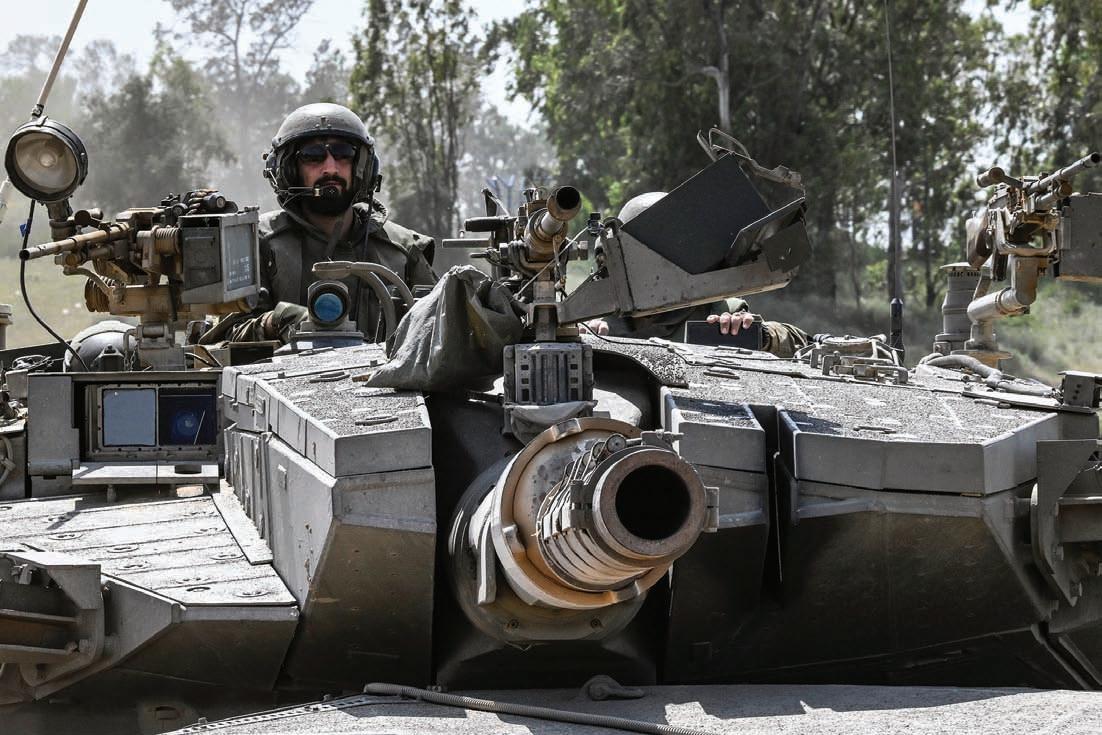
By Bruce Fein
THE OVERARCHING PURPOSE of the Neutrality Act is to prevent private citizens from confounding U.S. foreign policy by fighting with
Bruce Fein was associate deputy attorney general and general counsel of the Federal Communications Commission under President Reagan and is author of Constitutional Peril: The Life and Death Struggle for Our Constitution and Democracy and American Empire Before The Fall. Twitter feed: @brucefeinesq. Brucefein@substack.com. <www. lawofficesofbrucefein.com>.
the armed forces of a foreign nation or independently against any “prince, state, colony, district or people, with whom the United States is at peace.” Such collaboration would create the appearance that the U.S. was not neutral in the conflict despite the government’s legal posture of neutrality.
To make this a little less abstract, consider a plausible situation in which the act might be invoked: Could the United States prosecute an American under the Neutrality Act for departing singly or collectively from the U.S. to fight with the Israel Defense Forces (IDF) in Israel’s ongoing post-Oct. 7, 2023 war against Hamas and 2.3 million civilian Palestinians in Gaza?
It could—but it is not likely to. The United States has become a satellite of Israel fortified by lavish campaign contributions or expenditures by the American Israel Public Affairs Committee (AIPAC).
A convincing legal precedent is available to justify such prosecutions. Neutrality Act convictions were secured against 11 Americans for assisting and participating in Israel’s 1948 war of independence against Palestinians and Israel’s Arab neighbors: Egypt, Syria, Jordan, Lebanon, Saudi Arabia and Iraq.
In that year, the United Nations General Assembly recommended to the United Nations Security Council partitioning Palestine into separate Israeli and Palestinian states. The Security Council never acted on the recommendation. Israel accepted, Palestinians and their Arab neighbors did not, and war erupted. President Harry Truman imposed an arms embargo against the participants.
American World War II Air Force veterans, both Jews and gentiles, led by Al Schwimmer, who later earned Iran-Contra notoriety, eagerly volunteered to fly military aircraft that Czechoslovakia had agreed to supply to Israel and to fight with the Israeli armed forces. After the war concluded, eleven volunteers were convicted for violating the Neutrality Act. One of them, Charles Winters, served prison time, and all eleven were fined. (Three of them, including Winters, were later pardoned by successive U.S. presidents.)
With Israel’s declaration of war on Gaza in October 2023, the question of the applicability of the Neutrality Act is relevant. The 2.3 million Palestinians in Gaza are clearly a “people” with whom the U.S. is at peace, yet some Americans traveled to Israel to “help, whether volunteering at the hospital or holding a rifle.” A Nov. 4 Jerusalem Post article names two, Aaron David Herschman and Daniel Smith. Americans who leave the United States to join or otherwise collaborate or partner with the IDF in its allegedly genocidal war against the Palestinian people would seem clearly in violation of the Neutrality Act.
But as the American Empire replaced the American Republic, the Neutrality Act degenerated into a jumble of political calculations with ulterior motives. The law is a proxy for raw power, not evenhanded justice.
The disastrous 1961 Bay of Pigs invasion of Cuba by Cuban exiles from Castro’s dictatorship—planned and initiated in the U.S.—was an egregious violation of the Neutrality Act. The United States was not at war with Cuba. The Cuban exiles collectively launched a military expedition against Cuba with a thick nexus to the United States. But it was politically prohibitive to prosecute the Cuban exiles for waging a war against a Communist regime. After all, President John F. Kennedy’s electrifying inaugural address had bugled, “Let every nation know, whether it wishes us well or ill, that we shall pay any price, bear any burden, meet any hardship, support any friend, oppose any foe to assure the survival and the success of liberty.”
Attorney General Robert F. Kennedy justified the prosecutorial squint at the Cuban exiles with words worthy of the Mad Hatter’s Tea Party in Alice in Wonderland. The attorney general maintained that the Act did not prevent “refugees from Cuba from returning to that country to fight for freedom.”
But the Act did precisely that because the United States was at peace with Cuba. The U.S. protested or prosecuted Neutrality Act violations by Cuban exiles launching filibustering expeditions from the United States against Spain in the 1800s, Cuba’s then colonial overlord.
Kennedy added, “Nor is an individual prohibited from departing from the United States, with others of like belief, to join still others in a second country against a third country.” Wrong again. The Act prohibits exactly such activity emanating from the United States. He absurdly distinguished between individuals acting in an unorganized fashion with others to engage in or assist military conflict and “organized” collaboration, which is forbidden, an atextual, purposeless distinction found nowhere in the Neutrality Act. The attorney general declared, “What the law does prohibit is a group organized as a military expedition from departing from the United States to take action as a military force against a nation with whom the United States is at peace.” But even that tortured interpretation of the Act precisely describes the Bay of Pigs invasion by Cuban exiles pursuant to a plan originating and begun in the United States.
Do not hold your breath waiting for a Neutrality Act prosecution against an American traveling abroad to fight with the IDF against the Palestinian people in Gaza. To the extent the United States is a satellite of Israel, the Act is a scarecrow against Americans providing direct or indirect support for Israel’s military adventures. ■
By Mustafa Fetouri
RECRUITING VOLUNTEERS to join the Israel Defense Forces (IDF) has been an integral part of the doctrine of building the state of Israel since its inception. Thousands of Jews from around the world were recruited to help create apartheid Israel long before the 1940s. Radical Zionist recruiters crisscrossed the world, mostly in secrecy, encouraging any Jewish person they came across to join the battle to ethnically cleanse Palestine from its indigenous population to make room for the new state.
After the 1950s and the establishment of Israel, the idea of getting foreign recruits for the IDF became more institutionalized and public than before. Today Israel’s occupation army openly advertises for citizens of other countries to join its ranks. Even the condition of being a “pure” Jew is no longer important. Such recruits are typically considered to be mercenaries—but not in the case of Israel.
The IDF runs several “training” programs for foreigners wishing to join its ranks either permanently or temporarily. Mahal is one such project. On its website the project offers details for Jews around the world who might want to volunteer with the Israeli army briefly but do not want to emigrate to Israel. Among the countries targeted by Mahal is the United Kingdom. Any British citizen can register; priority is given to those whose parents or grandparents are Jewish
Mustafa Fetouri is a Libyan academic and freelance journalist. He received the EU’s Freedom of the Press prize. He has written extensively for various media outlets on Libyan and MENA issues. He has published three books in Arabic. His email is mustafa fetouri@hotmail.com and Twitter: @MFetouri.

(or at least one parent or grandparent is Jewish). Any male British citizen who is under 24 years old can join the program; for females they must be younger than 21. A rabbi, and not a government institution, determines the “Jewishness” of a volunteer.
Those volunteers perfectly fit the description of “mercenaries,” but Western media never see them as such and hardly acknowledge their existence in the current genocidal war in Gaza. The same media is quick to label as mercenaries soldiers recruited to fight with the Russian army in Ukraine (or non-nationals fighting in Libya and Sudan). However, people like the late Donald Rumsfeld (who was so fond of the term “enemy combatants”) would disagree. Not because such individuals don’t fit the criteria of “mercenaries” but simply because they are fighting for Israel (“the only democracy in the Middle East”). Apparently the Biden administration shares Rumsfeld’s notion because it has done nothing to stop its citizens from fighting and dying in Gaza (which is in fact illegal).
[See Bruce Fein’s article this issue.]
According to a June 2022 study published in the Sociological Forum, historically, at least 1,200 U.S. citizens were serving in the IDF at any given time. After the Oct. 7 Hamas attack, some 10,000 people residing in the U.S. reported for Israeli military duty after receiving draft notices, according to a Nov. 27, 2023
Washington Post article. Jewish Americans as well as many who do not have any connection to Israel also joined Israel’s war effort. According to a Feb. 22, 2024 article published in the Washington Post, the IDF estimated 23,380 American citizens currently serve in Israeli ranks. By January, 21 Americans were killed while fighting in IDF units inside Gaza and another was killed on the border with Lebanon.
Over the last two decades some 3,500 foreigners have served in the ranks of IDF every year. Most of them are Jewish. Israel’s defense ministry announced in 2016 that the largest number of volunteers in that year were French (45 percent), American (29 percent) and British (5 percent). Militarily speaking, that is the equivalent of a full army brigade, which is usually made of anywhere between 3,000 and 5,000 members. After the Oct. 7 attack, the number of foreign volunteers is thought to have increased.
Volunteers from Italy, France, Spain, the Netherlands and other European countries are also joining the IDF ranks. Last October Italy’s Foreign Minister Antonio Tajani said that there were some 18,000 Italian nationals living and working in Israel when the Gaza war started, among them 1,000 in the IDF performing different tasks including active combat.
Under the freedom of information act, Rishi Sunak’s government was forced to release those details after previously denying the government keeps track of the numbers of UK citizens fighting with the
IDF or living in settlements. UK officials believe that some 100 British citizens are serving in the ranks of IDF. By late March 2024 two British soldiers are known to have died in combat in Gaza. According to data released by London’s Foreign Office, before Oct. 7 only 80 British citizens were serving in the IDF in any given month. The data revealed that anywhere between 20 and 30 British nationals are living in illegal settlements in the West Bank. That’s not much compared to 60,000 Americans estimated to be living there.
South Africans are also known to have joined the IDF in the past and now in the Gaza war, prompting Foreign Minister Naledi Pandor to threaten them with prosecution upon returning home. Apparently Pandor is personally annoyed by fellow citizens joining a war she believes is genocidal. She led the South African team making the case against Israel before the International Court of Justice (ICJ).
In France a leftist member of parliament, Thomas Portes, wrote to the country’s justice minister last December asking him to investigate some 4,185 French citizens said to be committing war crimes in Gaza. Most of them are believed to be dual nationals of both France and Israel. Three months later the ministry said it will not investigate. Why? Because “dual citizenship implies dual loyalty,” according to a ministry spokesman.
Pro-Palestinian organizations and anti-war activists are trying to hold mercenaries to account. One such organization is the March 30 Movement (30-3), a grassroots movement founded a few months ago in both Belgium and the Netherlands. It is also widening its scope to include France and other European countries. The movement has already filed a dozen cases against Dutch, French and others after identifying them to have participated with the IDF in the Gaza genocide. Most of these individuals were identified from their own social media posts. Many of them posed unashamedly in photos and videos committing acts considered to be war crimes, such as holding noncombatants who were visibly bruised.
The movement’s co-founder, Dyab Abou Jahjah, told the Washington Report that his movement will continue its work to “hold to account” all “mercenaries” even after the war ends. He emphasized that it is “important” to take action regardless of “success or failure.” His colleague, Amsterdam- based lawyer Haroon Reza, told the Washington Report that he has already filed at least six criminal complaints against Dutch citizens who joined the IDF in Gaza.
A Lyon-based French lawyer,
Gilles Devers, working for the movement confirmed that he is filing a half-dozen criminal cases against French IDF volunteers accusing them of committing war crimes and crimes against humanity. He said “I am doing this voluntary work for the sake of humanity.”
The ICJ has decided that there is a case to pursue to determine whether Israel committed genocide and crimes against humanity in Gaza. Two additional cases against Israel are pending before the International Criminal Court (ICC). Israel and the U.S. are said to be working to prevent the ICC from issuing any arrest warrants against the Israeli prime minister, president and top military leaders. The ICC is said to be close to taking that step after its top prosecutor visited Israel and the West Bank in December 2023.
At the same time the international mood has dramatically shifted against Israel putting further pressure on the two international courts to act. Regardless of when and what the ICJ will decide, Israel is not worried because the court depends on the cooperation of member countries to respect its decisions; it has no enforcement mechanism. The ICC is the real worry for Israeli officials. The court has the ability to issue arrest warrants and all member states (124 of them) are obliged to arrest any wanted person. Neither Israel nor the U.S. is a member of the ICC but both are members of the ICJ. Diplomatically and politically negative rulings from both the ICC and ICJ are big embarrassments for Israel and its allies.
The fact that Israel found itself on the docket of both world courts is a great victory and a public opinion game changer for the Palestinians. After Gaza, Abou Jahjah is convinced, there will be “no going back and no stopping either.” ■


"Whoever is in solidarity with our corpses but not our rockets is a hypocrite and not one of us."
—From the Gaza solidarity encampment at Columbia University in New York City
It has now been more than seven months since Israel launched a genocidal war on the Palestinian people. The epicenter of that war is the Gaza Strip, where Israel’s stated goal is the destruction of Hamas, but the population is in fact the target; in the West Bank, Israel’s goal is ethnic cleansing through pogroms. It has not accomplished its goals in either region: the resistance, led by the determined fighters of Hamas and Islamic Jihad, remains strong throughout the Gaza Strip; defiant militias resist Israeli troops in the West Bank towns and refugee camps of Jenin, Nablus, Nour Shams, Tulkarem, Qalqilya, Ramallah, Hebron and Jericho.
By Ida Audeh Special Report
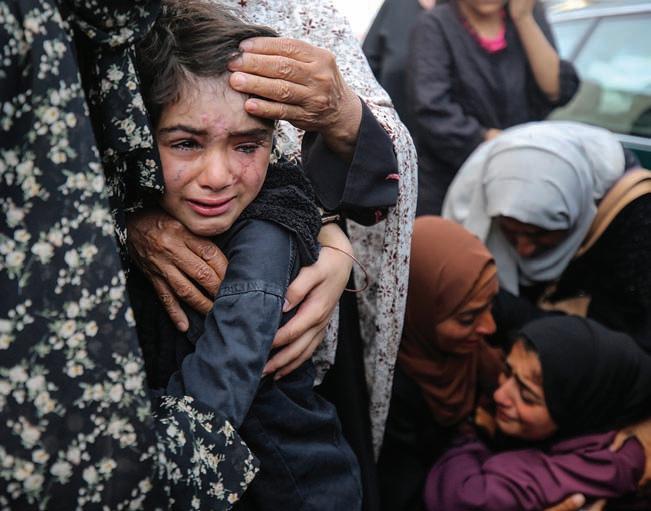
Palestinians mourn by the bodies of relatives who were killed in an Israeli bombardment, at the al‐Aqsa hospital in Deir al‐Balah in the central Gaza Strip, on April 28, 2024.
No part of Palestine has been pacified. Palestinians are being killed, dismembered, starved and displaced in staggering numbers, their towns and cities have been decimated, and the resistance continues.
What can be said about conditions in Palestine since October 2023?
Israel is fighting a colonial war of extermination, Palestinians are fighting a war of liberation. Israel’s soldiers have the most advanced weapons on the market, but they do not hold up well to Palestinian fighters using locally made weapons who are prepared to fight to the death to defend their families, friends, countrymen and hometowns. More than seven months into this protracted carpet bombing, commonly compared to World War II, the resistance continues and fighters’ morale is high. They understand that there is no turning back: Israel’s war is not simply against the Palestinian resistance but against the population as a whole. Israel fights through-
out the country to continue the process of ethnic cleansing, which it has long lamented as being incomplete since it established statehood in 1948. Palestinians are aided by Lebanese, Yemeni and Iraqi militias who have direct experience with colonialism and view Israel as a regional threat.
The Israeli army is a defeated army. Israel is a regional superpower, and it is backed by a global superpower that keeps the ammunition supply steady, but it cannot achieve its aims. Militias in every part of Palestine, from the river to the sea, are fighting back. This is the context in which we should see Israel’s devastation in Gaza: It is taking casualties on the battlefield, and so it takes out its rage on noncombatants and more specifically on children, even hungry children, shooting them dead when they go to food distribution points. Watching videos of Israeli soldiers conduct controlled demolitions of university buildings, looting and destroying homes just because they can, and targeting pregnant women entering maternity hospitals, one concludes that it flexes its muscle only against targets that can’t fight back.
It has unmasked itself in front of the whole world. The highest court in the world, the International Court of Justice, determined that there are plausible grounds to try Israel for genocide, the crime of crimes.
Palestinians and Lebanese have always known Israel’s savagery, but now the world does too. Between Oct. 7, 2023 and May 8, 2024, it killed about 34,844 Gazans (72 percent of them women, children and the elderly) and injured about 78,804; in the West Bank it has killed more than 491. The number of dead does not include those buried in rubble that Palestinians lack the equipment to remove; the injured include children who have lost limbs and will require lengthy rehabilitation. (Al Jazeera provides a count of 73 Lebanese civilians killed as of March 31.)
The Electronic Intifada editors say that every Israeli accusation should be considered a confession, and events have borne that out. Recall the tall tales concocted by the sick minds of Zaka (volunteer first responders) about the events of October 7: widespread slaughter, mass rape, dismembered and beheaded babies (some of whom were also cooked), yet not a single victim was produced, no credible witnesses, not a shred of forensic evidence, the dead quickly buried without examination. A second attempt to pull together a more plausible mass rape storyline, this one a documentary (“Screams Before Silence”) by former Meta executive Sheryl Sandberg, was thoroughly debunked by Ali Abunimah of Electronic Intifada on the site’s May 1 podcast, but it is still repeatedly referenced in Western media.
Yet these same accusations and more can be made about the wreckage left by Israel’s army in one Gazan city after another. In areas from which the army withdraws, Palestinians find mass graves in demolished hospitals. Dismembered victims. Bound and executed civilians, some of whom were hospital patients. Women and children abducted, and credible reports of rape. (In one sickening incident, a five-month pregnant woman was raped and executed, her family forced to watch.) Displaced people lured out of their shelters by the (recorded) sounds of babies and women screaming; when they rush out to offer assistance to whoever is crying, they are droned. AI-guided drones kill men when they are with their families. Famine has gripped the area at levels that astonish food experts, so quickly did the population succumb.
And unlike Israel’s bogus claims, Palestinians have abundant proof of every crime they accuse Israel of committing.
Israel’s targets are not random. For a country that is obsessively aware of what it considers demographic threats (aka the high birth rate of undesirables), it is no surprise that it would target (Palestinian) women and children. The charge of genocide is demonstrated not only through numbers of dead but also their identity. Doctors,
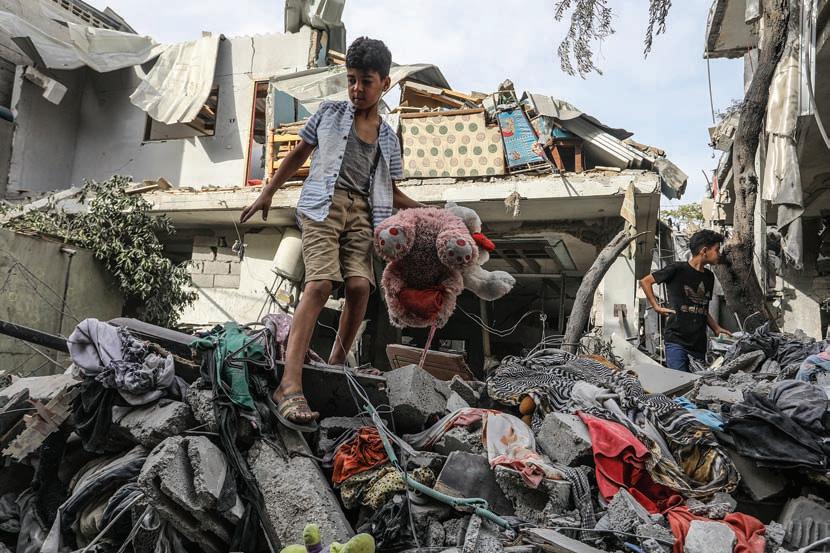
Children search among the rubble of their home to retrieve their belongings after an Israeli attack on the al‐Jamal family’s home, which killed six, including two children, in Rafah, Gaza on April 25, 2024.
nurses, first responders. Educators. Journalists. Writers. Software engineers. Aid workers. Religious figures. It targets not only society but also the skill sets that enable sustainable communal life.
As of April 27, as many as 180 UNRWA workers had been killed by Israel in Gaza, Resistance News Network reported. Considering that Israel has long worked to hamstring the organization, the killing of large numbers of its staff can hardly be considered a coincident.
Even the dead are not safe from Israel’s sadism. At least 16 cemeteries in Gaza have been bulldozed. In some locations, residents reported that Israelis unearthed corpses, took them away and then returned them; locals reported that the bodies had been mutilated or were missing organs. (Israel has a long history of using Palestinians, particularly those who die in prison, as unwitting organ donors.) Sometimes Israeli soldiers run tanks over the dead. They prevent Palestinians from retrieving their dead, knowing that the corpses are likely to be mauled by stray dogs and cats. EuroMed Human Rights Monitor is asking for an investigation of possible thermal weapon use by Israel, which cause bodies to melt or evaporate.
Mass arrests of Palestinians are ongoing. Al Jazeera reported on April 17 that
about 9,500 Palestinians were being held in Israeli prisons. Detainees were taken from their homes, arrested at military checkpoints, forced to surrender themselves under pressure and taken as hostages. Prisoners say that conditions of detention since Oct. 7 are much worse than anything seen before that date, and as many as two dozen have died of torture or medical neglect.
The genocide charge applies to the West Bank too. The Lemkin Institute for Genocide Prevention issued a genocide alert in early April, saying that the level of violence in the West Bank by settlers and soldiers eclipsed anything seen prior to October 7. The institute cited killings and injuries of Palestinians and Israeli pogroms in Palestinian villages, including Khirbat Zanuta in the southern West Bank (which it describes as a “blueprint” for ethnic cleansing). Stop the Wall, the Palestinian grassroots anti-apartheid campaign, describes ethnic cleansing campaigns in villages and hamlets in Area C, including Khirbet al-Ratheem, Khirbet alTayyiba, Al-Hamra, Wadi al-Siq, and Khirbet Ein al-Rashrash.
Support for the Palestinian cause internationally has never been stronger. The barbarism to which Palestinians have been subjected, and the fact that Western governments actively support it, is literally
freaking out people throughout the world. People have reached the sickening conclusion that they live in countries ruled by sociopathic elected officials who see no reason to intervene to stop the mass killing. This is especially true of citizens of the United States and Western European countries who are repulsed by their governments’ failure to stop the military arms flow on which Israel is dependent and the lies they tell to explain their inaction. U.S. officials use a term like “humanitarian pause” (in a genocide) as though it is a real thing, but listeners conclude that government officials hold world views that are incompatible with their own.
The most militarized police forces in the U.S. are trained by Israelis to view civilians as enemy combatants; not surprisingly, encounters between police and civilians are often deadly. Israel’s surveillance technology is tested on Palestinian bodies before it is sold to repressive governments everywhere. (And it is hard to think of a single government that is not surveilling its population.)
At time of writing, more than 84 universities across the country (and several in France, Canada, the UK and Australia) have shut down their campuses and set up Gaza solidarity encampments; they are demanding that their universities divest from companies and institutions that are tied to Israel and its colonization project. The movement is a breathtaking stand of solidarity with Gazan students and academics whose universities have all been destroyed by Israel; it is also (one can hope) a turning point in this country, the beginning of a long overdue U.S. intifada against Israel’s effective control of U.S. institutions and public discourse and its cooptation of elected officials.
The conclusion of this war is likely to permanently settle the question of Palestine, from the river to the sea. There will be no return to the conditions of October 6, no negotiating with Israel over the size of the cages it envisions for Palestinians. It is possible, but not likely, that the outcome of this war will be the ethnic cleansing of all Palestinians (including
(Advertisement)
Please enter or renew my subscription to the Washington Report. Circle Appropriate Price:
Subscription
■ Add $15.00 per year for my subscription to “Other Voices,” a 16-page must-read insert in every issue
■ Check/Money order payable to Washington Report enclosed (U.S. Funds only)
■ Send me an invoice with my first issue to my address below.
those who are citizens of Israel). The more likely scenario, however, is the creation of an entity between the river and the sea that is not Zionist and will not have a Jewish majority after Palestinian refugees make their way home from the diasporas they were forced into more than 75 years ago. The ongoing genocide and ethnic cleansing throughout occupied Palestine demonstrate the folly of indulging Zionism, a supremacist movement whose goal has ever been to replace the indigenous population with its own.
Palestinians need a future that is worthy of their children, one that is ever mindful of the staggering price the Palestinian people have paid since the world Zionist movement set its sights on Palestine in the 19th century. Algerians lost one million of their countrymen in a liberation struggle in the 1950s against French colonialism; Palestinians must not be asked to pay that price to rid themselves of Israeli colonialism, not in the 21st century, when the very existence of a colonial regime indicts the whole world for tolerating it. ■

■ Use this form and the lines above to start a gift subscription. Enter your name and subscriber number (located on your magazine label, beginning with WR).
■ You can also scan the QR code at right to subscribe online.






By John Gee

Mr. President, as you know, the Irish people are deeply troubled about the catastrophe that’s unfolding before our eyes in Gaza. And when I travel the world, leaders often ask me why the Irish have such empathy for the Palestinian people. And the answer is simple: We see our history in their eyes. A story of displacement, of dispossession, national identity questioned or denied, forced emigration, discrimination, and now, hunger.
Those words were spoken by Leo Varadkar, then Taoiseach (prime minister) of Ireland, at the St. Patrick’s Day (March 17, 2024) White House event. Host Joe Biden celebrates his Irish ancestry and his genuine affection for Ireland is well-known, but there is clearly a gulf between his attitude toward the Palestine conflict and that of Ireland’s people.
John Gee is a free‐lance journalist based in Singapore and the author of Unequal Conflict: The Palestinians and Israel.
In November 2023, Varadkar was one of the first Western leaders to criticize Israel’s actions in the Gaza Strip. His government joined early calls for an immediate ceasefire. In February 2024, Varadkar and Pedro Sanchez, Spain’s prime minister, signed a joint letter calling for the European Union to review its trade agreement with Israel over human rights concerns. The Irish, Spanish, Maltese and Slovenian governments are pressing the EU to recognize Palestinian statehood “when the circumstances are right.” The United States, Britain and various other Western countries cut off aid to UNRWA in an unseemly stampede to please Israel following its unsupported claims that 12 UNRWA staff had participated in the Oct. 7 attacks; Ireland declined to follow suit.
Sinn Fein, the largest opposition party in the Dail (Ireland’s parliament), has a long record of solidarity with Palestine and has pressed the government to take a much stronger stand in support of Palestinian rights. Current polling suggests that it will increase
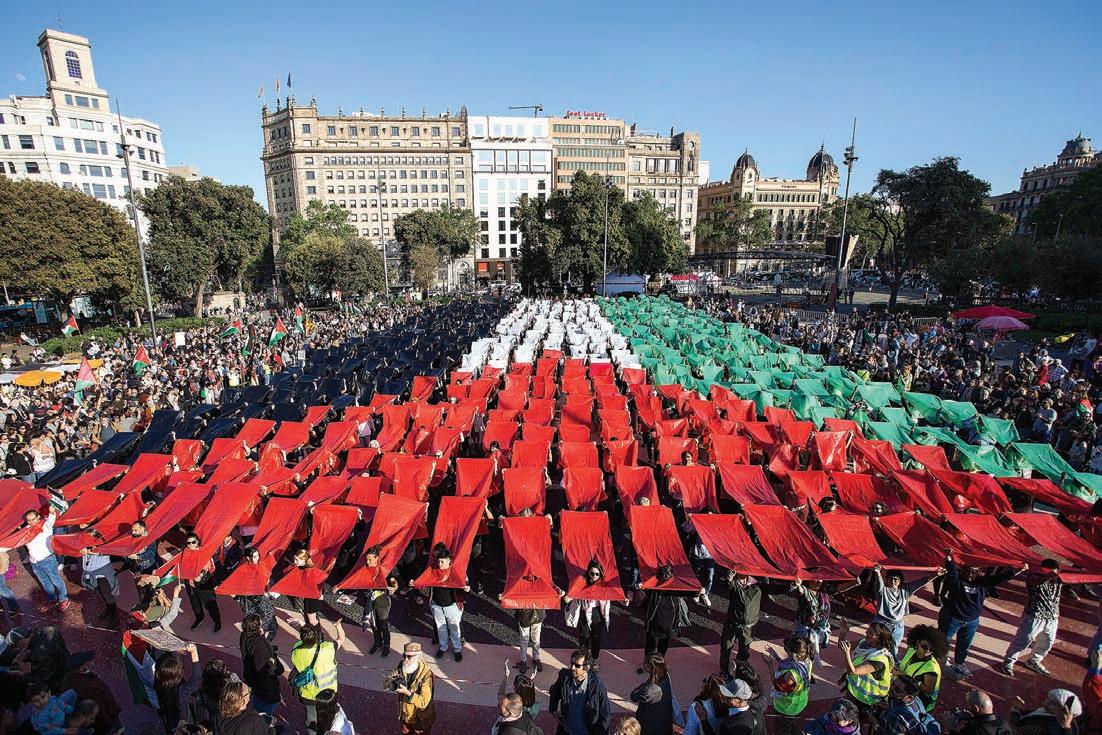
its representation at the next general election and might participate in a new governing coalition.
Outside the Dail, Irish support for Palestine is broad—this is not seen as very radical. A poll conducted for the Irish Anti-Apartheid Campaign for Palestine, published in January, indicated that 71 percent of respondents considered that the term “apartheid” applied to “the situation facing Palestinians.” Another 62 percent thought that sanctions such as those adopted against Russia following its invasion of Ukraine should now be applied to Israel.
Earlier this year, the Austin for Palestine Coalition called for a boycott of the South by Southwest (SXSW) festival held in Austin, Texas, over its ties to the U.S. army, the arms industry and weapons sales to Israel. All 12 Irish bands scheduled to appear pulled out, despite the prospect of money and networking opportunities. A group of Irish artists issued a statement saying, “We stand in complete solidarity with Palestine.”
Spain’s readiness to work with Ireland on promoting recognition of Palestinian
statehood is not surprising. There is strong Spanish public support for the Palestinian people.
On the weekend of April 20-21, demonstrations in support of the Palestinians were held in more than 100 Spanish cities, called by the Solidarity Network Against the Occupation of Palestine. Protesters called for an immediate ceasefire and an end to the arms trade with Israel.
This was the fourth such all-Spain protest since October.
The Israeli Embassy in Singapore scored a goal against itself with a March 24 post on its Facebook page. The post claimed that the Qur’an mentioned Israel 43 times, but Palestine was not mentioned once and went on to say that there was archaeological evidence that the Jewish people are the indigenous population of the territory. This provoked a rapid response from the Singapore government.
Law and Home Affairs Minister K. Shanmugam spoke to the media on March 25, saying that his ministry had raised the matter with the Ministry of Foreign Affairs and they had told the Israeli Embassy that
it must take down the post immediately. In his statement, Shanmugam said:
“The post is wrong on many levels. First, it is insensitive and inappropriate. It carries a risk of undermining our safety, security and harmony in Singapore.
“Second, it is wrong to selectively point to religious texts to make a political point. Even worse, in this current situation, for the Israeli Embassy to make use of the Qur’an for this purpose.
“Third, this post is an astonishing attempt to rewrite history.”
Shanmugam went on to say that Singapore took care of the safety of everyone in Singapore, including minority communities such as Muslims and Jews.
The minister said that other embassies had put up posts with which Singapore might disagree, but it did not intervene because of the embassies’ sovereign status. “But where it affects the safety and security of people in Singapore, the peace and harmony that we enjoy, we do, and we will, intervene.”
While the attempt to rewrite history was not the basis for Singapore’s intervention, Shanmugam said, the writer of the post should look at U.N. resolutions and “see if Israel’s actions in the past few decades
have been consistent with international law, before trying to rewrite history.”
The Israeli Embassy took down the post immediately after Singapore demanded it do so. It claimed that the post had not been given the proper approvals and that the (unnamed) individual responsible had been reprimanded.
Shanmugam did not explain how the post attempted to rewrite history. However, since it attempted to deny the Palestinians’ roots in their own homeland, it would seem that his criticism extended beyond Israel’s behavior in the recent past to its historic denial of Palestinian nationhood.
Singapore condemned Hamas’ attack on Oct. 7 in strong terms, but joined most other countries in criticizing Israeli tactics that killed and injured civilians. It later supported calls at the U.N. for an immediate ceasefire. Historically, Singapore has had friendly ties with Israel and among non-Muslim Singaporeans, Israel’s image was mainly positive until recently.
The war on Gaza has had a big impact. During a parliamentary debate on Nov. 6, 2023, all violence against innocent civilians was unanimously condemned. Foreign Minister Vivian Balakrishnan emphasized that
the Israeli-Palestinian conflict was not a religious conflict, but had always been about territory, self-determination and identity.
The government has indicated its sensitivity toward public opinion by stressing its support for a two-state solution and its relations with the Palestinian National Authority.
Apart from the official level, there have been signs that many Singaporeans who might previously have given little thought to the Palestine conflict or even leaned toward Israel have begun to question their positions. I have been pleasantly surprised to hear comments sympathetic to the Palestinians from members of Christian groups who were either pro-Israel or claimed that the Middle East conflict is “too complicated’’ to have an opinion.
When the Singapore Theater Company staged the one-man play, “Taha,” (April 2-14) every performance was wellattended. Written and performed by Amer Hlehel, “Taha” tells the story of poet Taha Muhammad Ali, whose home village of Saffuriyya was destroyed in 1948 and who was separated from his first love and had many family members driven into exile in Lebanon.
(Advertisement)

When the charity Rahmatan Lil Alamin appealed for contributions for Gaza relief, it raised over S$ 8 million (nearly U.S. $6 million).
Singapore’s government has not permitted any public demonstrations concerning the current events in Palestine (it rarely authorizes any form of public protest, in any case), and yet there have been pro-test actions that the police were reported to be investigating. On Feb. 2, 70 people were reported to have marched along Orchard Road toward the Presidential Palace. They carried umbrellas with watermelon images on them—the colors of the Palestinian flag. Unapproved pro-Palestinian posters were put up in the National University of Singapore but soon removed. Among other things, they questioned links between Singaporean and Israeli universities. On the evening of April 15, three protesters unfurled a banner on a skyway at Gardens by the Bay carrying the slogan “End Israel-SG Arms Trade.” A statement issued by the protesters said that they acted in solidarity with “a global economic blockade across 50 cities to disrupt the global economy’s indifference to the human rights abuses happening right before our eyes.” ■
By Candice Bodnaruk
ACTIVIST Dimitri Lascaris
is part of a legal team taking the Canadian government to court on behalf of several PalestinianCanadians originally from Gaza. The Coalition for Canadian Accountability in Gaza (CCAG) is accusing Canada of violating the Genocide Convention as well as Canada’s Charter of Rights and Freedoms.
In a recent interview with the Washington Report, Lascaris described his motivations: “I chose to be part of this legal coalition because I believe that I have a duty to hold accountable a government which purports to speak in my name and in the names of all Canadians.”
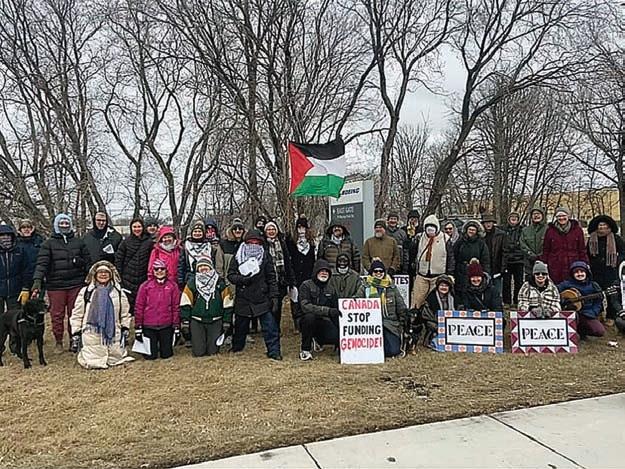
Pilgrims on the Gaza Ceasefire Pilgrimage at Winnipeg’s Boeing Aerospace plant protest Canadian complicity in genocide.
He explained that lawyers from the Legal Centre for Palestine (LCP) approached him with the idea of pursuing litigation against Canada’s government for its complicity in Israel’s genocide. “At the time that LCP’s lawyers approached me, they had been retained by several Palestinian-Canadians who come from Gaza. I agreed to explore with LCP the possibility of pursuing litigation on behalf of their clients,” Lascaris explained.
As Lascaris and the LCP lawyers were holding their discussions, they learned the International Centre of Justice for Palestinians (ICJP) Canadian legal working group had already issued a notice to the Canadian government regarding its complicity in Israel’s genocide. They joined forces with ICJP to pool legal resources and pursue joint litigation. The group is currently preparing the necessary court documents to bring the case forward and is acting on a pro bono basis.
One of the coalition’s clients lost 74 family members in Israel’s bombardment of Gaza.
Candice Bodnaruk has been involved in Palestinian issues for the past 14 years through organizations such as the Canadian BDS Coalition and Peace Alliance Winnipeg. Her political action started with feminism and continued with the peace movement, first with the No War on Iraq Coalition in 2003 in Winnipeg.
The coalition is asking Canada to comply with the Geneva Convention and Canada’s Charter of Rights and Freedoms. Canada is a signatory to the Genocide Convention, and under Article 1, it has an obligation to prevent genocide; concrete steps include ending sales of weapons and military equipment to Israel, imposing a complete ban on the importation into Canada of arms and other military equipment made in Israel and suspending Canada’s military cooperation with Israel.
The coalition is also demanding Canada end the importation of illegal, West Bank settlement products and place economic and travel sanctions on all Israeli cabinet ministers as well as on all officers in the Israeli military.
Lascaris argues Canada has yet to take any meaningful steps to bring an end to Israel’s genocide in Gaza. He identified actions that Canada could take to hold Israel accountable: banning all weapons to and from Israel, imposing trade sanctions on Israel like Canada did with Russia and Iran, demanding the International Criminal Court prosecute Israel for war crimes as well as prosecuting Israeli-Canadians for serving in the Israeli military.
“Clearly, the government is discriminating against PalestinianCanadians in violation of the Charter of Rights and Freedoms. Moreover, it is compromising their Charter rights to security of the person,” Lascaris said.
Lascaris also commented on the New Democratic Party’s (NDP’s) recent motion in the House of Commons that called for an end to Canadian weapons sales to Israel, an immediate ceasefire and humanitarian aid. The original NDP motion also called on Canada to recognize Palestinian statehood but this demand was removed after pressure from a number of MPs.
He explained that the NDP allowed its motion to be watered down so much that it is now practically worthless. He noted that the New Democrats could have used the leverage they have in the
House to bring down the Trudeau Liberals and trigger an election. The Liberals are currently in a minority government position.
For Lascaris, the NDP’s decision not to act on the edited motion was “disgraceful.”
“If ever there was a reason to bring down a government (or at least threaten to do so), genocide is certainly a reason,” Lascaris concluded.
Along with Lascaris, the coalition’s legal team is comprised of Dr. Faisal Bhabha, from Osgoode Hall law school, Yavar Hameed from Ottawa, Shane Martinez from Toronto and Asaf Rashid from Halifax.
The CCAG gave the Canadian government until April 3 to respond to the coalition’s demands, yet at the time of this writing the government had not done so.
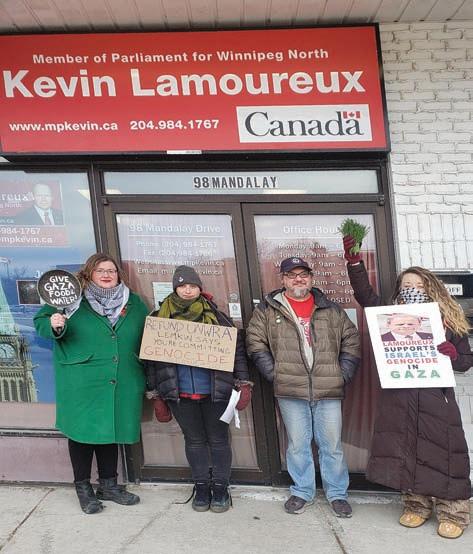
Demonstrators, including many of Liberal MP Ben Carr’s own constituents, lined the sidewalks outside Carr’s office in Winnipeg’s Little Italy neighborhood this past March to protest his opposition to a recent NDP motion in parliament. Carr was one of only three Liberal MPs to oppose the NDP call for an immediate ceasefire, aid to Palestinians in Gaza and an end to Canada’s weapons trade with Israel. Although the protest was held during office hours, Carr’s staff locked the doors and refused to face the crowd. Last October, Carr also spoke out against a federal government ceasefire call.
The original NDP motion, sponsored by MP Heather McPherson, called for an immediate ceasefire, the release of all hostages, suspension of military trade with Israel, recognition of Palestinian statehood and a ban on extremist settlers from entering Canada. The motion also implored the government to lift the 1,000 person limit on temporary resident visas for Palestinians trying to escape Gaza and to ban extremist settlers from entering Canada.
When the motion finally passed on March 18, it was greatly altered: the call for Canada to recognize the State of Palestine was removed and replaced with a statement calling on the government to work with others to achieve “a negotiated twostate solution.” MPs voted 204-117 in support of the motion.
Another liberal MP who supports Israel and has been silent on a ceasefire, Kevin Lamoureux, was the target of a protest in early March by a group of Palestinian solidarity activists. This was the second protest the group held demanding the liberal MP advocate to restore Canadian funding to UNRWA. Canada paused funding to the U.N. agency in January in response to Israel’s unsubstantiated allegation of an UNRWA role in the Oct. 7 Hamas attack on Israel; it resumed funding on March 8.
A total of 19 countries and 173 cites participated in the Gaza Ceasefire Pilgrimage (GCP) this past Lent—and Winnipeg was one of them. Organizer Michael Young, a member of Mennonite Action, began planning the local Gaza Ceasefire
Pilgrimage in February. Although the action was Christian-led, people of all faiths, as well as those not practicing a faith, were invited to participate.
For Christians who participated, the event represented a “prayerful pilgrimage of lament and repentance,” Young said, in a recent interview with the Washington Report. The concept behind the 42-km pilgrimage was to “map” Gaza onto Winnipeg streets so that pilgrims could travel a route similar to the trek Palestinians took from Gaza City to Rafah to escape Israeli bombardment. The pilgrimage was broken into seven segments, and pilgrims could walk the entire route or just complete a section.
The Winnipeg journey was significant because it included stops at Winnipeg’s Grand Central Mosque and a Sikh gurdwara. On their route pilgrims passed several weapons manufacturers, including Winnipeg’s Boeing Aerospace, where they held a prayer vigil and called out Canadian complicity in genocide.
The GCP is a global network of 40 autonomous Christian groups and was started by Australian James Harris, who, after Oct. 7, was motivated to walk the distance of Gaza in solidarity with Palestinians in Gaza.
The GCP has four demands: an enduring and sustained ceasefire, immediate flow of humanitarian assistance, the release of all hostages, including the Palestinian hostages held in the Israeli prison system and the end of the occupation so that a just peace can begin.
Young, who is new to Palestinian organizing, says his passion is “anti-colonial abolition” through his previous work with the Indigenous solidarity network in Winnipeg. “History will hold us accountable for what we’ve done in this moment,” he concluded.
The Winnipeg pilgrimage was sponsored by Mennonite Church Manitoba Palestine-Israel Network, Mennonite Action and Mennonite Central Committee. Visit: <gazaceasefirepilgrimage.com> for more information. ■
By Jack McGrath

AMID ISRAEL’S STARVATION of Palestinians in northern Gaza, described by World Food Programme director Cindy McCain as a “full-blown famine,” an international alliance of solidarity organizations endeavored to break the siege.
The Freedom Flotilla Coalition’s (FFC) 2024 mission is the latest in a series of grassroots challenges to Israel’s blockade. Between 2008 and 2018, as many as 35 ships carrying humanitarian aid sailed for Gaza; the Israeli military has prevented any from reaching their destination since 2009. The most infamous incident occurred in 2010 when Shayetet 13, the Israeli army’s elite special forces unit, killed 10 activists onboard the Mavi Marmara and wounded over 50 while raiding the flotilla in international waters.
Malnourishment has been a consistent issue for Gaza’s residents since Israel levied the blockade 17 years ago, with a 2022 U.N. report classifying 64.3 percent of Palestinians living in the strip as
“moderately or severely food insecure.” However, the present crisis has no precedent in the conflict’s history, as the Israeli government has largely followed through on Defense Minister Yoav Gallant’s order to impose a “complete siege” on Gaza by cutting off food, fuel and electricity. In the seven months since, Israel has blocked international aid from entering Gaza across its border, killed more than 200 aid workers and repeatedly massacred civilians queuing to receive food. Unsubstantiated accusations by Israel against the United Nations Relief and Works Agency (UNRWA) prompted the United States and other Western governments to suspend funding to Gaza’s most effective humanitarian organization in January. Humanitarian aid authorized to enter Gaza through Israel is subject to extended delays under the guise of inspections. Even complete cooperation with Israeli authorities does not guarantee safety. On April 1, Israeli airstrikes killed seven members of the U.S.based World Central Kitchen as they drove through a “deconflicted zone” in coordination with the Israeli military. While the triple-tap bombing of U.S., British and Australian citizens generated more
backlash from Washington than the hundreds of Palestinian aid workers murdered in the months prior, it appears to have had little effect on Israel’s campaign of collective punishment.
With the international community unable or unwilling to pressure Israel into lifting the siege, several NGOs, including the Turkish Humanitarian Relief Foundation (IHH), as well as 500 activists from over 30 countries, gathered together to do what their governments would not. The FFC has a dual purpose: “to deliver aid to the people in Gaza, but more importantly to break the illegal and inhumane siege placed on the people in Gaza by the state of Israel.” In keeping with these goals, the FFC intended to carry over 5,000 tons of food and medical aid to Gaza from Türkiye without coordinating with Israel or allowing its military to inspect the ship’s cargo.
Defying Israel’s naval blockade set the stage for a confrontation, which organizers hoped would result in sanctions against Israel and additional international pressure to lift the siege. In the flotilla’s advance publicity, Huwaida Arraf, a Palestinian American lawyer who has played a leading role in organizing the flotillas since 2008, said that the FFC seeks to “challenge the political realities that leave Palestinians in need of aid” by breaking a blockade that has no basis in international law. “We won’t be getting close to Israel’s territorial waters, therefore they don’t have a right to intercept us,” Arraf observed. “We’re trying to get all eyes on the flotilla to make sure the world knows and Israel knows we’re coming so that they can’t fire a missile on us and say it was unintentional,” she added.
Activists took peaceful resistance basic training in Istanbul in case of an Israeli attack on the flotilla.
The FFC’s emergency mission was far more perilous than previous voyages, as the flotilla aimed to enter an active war zone at a time when regional tensions are at an all-time high, and Israel has shown no compunction about killing non-combatants. “Generally, our boats are facing the Israeli government. But now we are facing a genocide in Gaza and the bombing of a
diplomatic facility,” said Ann Wright, a retired U.S. Army Colonel and former diplomat on the coalition’s steering committee in an article published on April 26. Despite the extreme risks, Wright emphasized the necessity of confronting Israel’s siege directly. “Getting humanitarian aid to Palestinians in Gaza is urgent, but it is not sufficient,” she argued. “We must end Israel’s unlawful, deadly blockade as well as Israel’s overall control of Gaza. That’s why we need this flotilla, filled with unarmed civilians [and] human rights observers from 30 countries, to challenge Israel’s brutal grip on the Gaza Strip.”
In response to a request by South Africa, the International Court of Justice (ICJ) issued additional provisional measures on March 28 in light of the impending famine. The court stated that Israel shall take “all necessary and effective measures to ensure, without delay, in full cooperation with the United Nations, the unhindered provision at scale by all concerned of urgently needed basic services and humanitarian assistance to Palestinians throughout Gaza.”
On April 22, Israel’s Channel 12 television, citing the Israel Defense Forces, reported that Shayetet 13, the brutal special forces unit, was preparing to intercept the flotilla.
Five U.N. Special Rapporteurs issued a joint statement on April 26 demanding that Israel allow safe passage for the FFC, observing that the “convoy aims to deliver lifesaving aid directly to the besieged people of Gaza, legitimately challenging Israel’s control over the entry of humanitarian assistance.” The experts characterized the flotilla as “a material manifestation of international support for the ongoing Palestinian struggle for freedom and self-determination, and the internationally recognized right to receive humanitarian aid without interference or hindrance.”
The flotilla was scheduled to depart from Istanbul on April 26 but faced numerous obstructions, which the FFC attributes to diplomatic coercion by the United States and Israel. Twenty U.S. Congress members signed a letter on April 26 urging Sec-
retary of State Antony Blinken to “engage directly with President Recep Tayyip Erdogan and the Turkish government to prevent or delay the flotilla’s departure.”
The FFC announced that “Israel is pressuring the Republic of Guinea-Bissau to withdraw its flag from our lead ship” on April 25. Despite the ship passing all required inspections, the Guinea-Bissau International Ships Registry requested another inspection the day before its voyage. On April 26, Guinea-Bissau withdrew its flag from two ships while the inspection was still underway, which FFC organizers condemned as a “blatantly political move.”
Without a flag to sail under, the flotilla has been forced to postpone its voyage until another nation permits its flag to be used for the mission. Few countries have endorsed the flotilla, with South Africa being a notable, if unsurprising, exception. South African President Cyril Ramaphosa voiced his support for the flotilla on May 5, but it remains to be seen whether he will allow the coalition to sail under the state’s flag. His solidarity was welcomed by Mandla Mandela, a South African politician and grandson of Nelson Mandela, who joined the flotilla. Mandela called on Ramaphosa’s government “to enable the Freedom Flotilla to fly the South African flag and ensure that the International Court of Justice’s ruling that has ordered the humanitarian aid to be able to flow freely into Gaza is not prevented by the Zionist entity.”
Despite the setbacks, the FFC remains determined to depart on a future date. At a press conference in Istanbul, Arraf vowed that “Israel cannot and will not crush our resolve to break its illegal siege and reach the people of Gaza,” who “remain steadfast under the most horrific, unimaginable conditions.” Speaking on behalf of the hundreds of activists who volunteered to risk life and limb for Gaza, Arraf stated, “We take strength from their [the Palestinian people’s] incredible, inexplicable ability to maintain their humanity, dignity and hope when the world has given them no reason to do so. It is our responsibility to keep that hope alive. We will sail!” ■
By Jonathan Gorvett

LESS THAN A YEAR after Türkiye’s ruling coalition triumphed in the country’s general and presidential elections, it suffered a stunning defeat at the ballot box on March 31.
This time, it was the municipal and mayoral vote that undid President Recep Tayyip Erdogan and his Justice and Development Party (AKP)-led allies.
A swathe of municipalities and provinces that had long been loyal changed hands, and the opposition consolidated its hold on Ankara,
Istanbul and Izmir—the country’s largest cities.
The “results demonstrate not only a defeat in the election, but also the loss of the party’s soul,” Erdogan himself reportedly remarked at a post-ballot AKP executive meeting.
The main opposition grouping, the center-left Republican People’s Party (CHP), did better than the AKP in terms of national vote share. With around 38 percent of the vote to the AKP’s 35 percent, it was the CHP’s best result since 1977.
This led to some euphoria in the opposition camp—as well as relief—with the result apparently vindicating the CHP’s change of leadership after last year’s election defeats.
Some of that euphoria is beginning to wear off, however. Türkiye continues to face economic and geopolitical challenges, and parties are assessing what local election results reveal about national election prospects.
Several factors appear to be behind the dramatic shift in electoral support for the governing and opposition parties in the year between May 2023 and March 2024. One obvious factor was the nature of the elections themselves. “Local elections are much closer to people’s lives, in a way,” Selim Koru, an analyst for the Economic Policy Research Foundation of Türkiye (TEPAV), told the Washington Report.
Local issues, from garbage collection to road repairs, often influence local votes, while in contrast, national ballots can address something more existential.
“In last year’s general and presidential elections, there was a clear choice given about what kind of Türkiye you want,” Arzu Yilmaz, associate professor of politics and international relations at the University of Kurdistan Hewler, told the Washington Report.
A highly nationalistic campaign was mounted by the AKP and its allies in 2023, which gave the voting “an entirely different feel,” said Koru.
At the same time, while economic conditions had been deteriorating for some
time before the May 2023 elections, “the destructive impact of this had become a lot more visible by 2024,” added Yilmaz.
The AKP may also have made a series of particular mistakes in their local election campaign. “They took a big risk with some of their candidates,” explained Koru. “They picked people who would do well within the system, but who were not so charismatic.”
In contrast, CHP mayors such as Ekrem Imamoglu in Istanbul and Mansur Yavas in Ankara are already well-known and popular figures on the national stage. Their AKP alternatives lacked luster and recognition.
In Türkiye’s majority-ethnic Kurdish southeast, the pro-Kurdish Peoples’ Equality and Democracy Party (DEM), the successor to a string of banned ethnic Kurdish parties, won municipalities across the region.
In the past, such results have usually been followed by the pro-Kurdish party’s mayors and councillors being individually disqualified for alleged links to the banned Kurdish Workers’ Party (PKK). Their seats have instead gone either to AKP runners-up or to central government appointed trustees. A similar move in the southeastern city of Van followed the local elections this time. The DEM candidate, who had received over 55 percent of the vote to the AKP’s 27 percent, was removed from office and the AKP runner-
up appointed.
After several days of rioting, the DEM candidate was re-installed—an unusual event in the turbulent southeast. This was also greeted with some euphoria by Türkiye’s oppositionists.
Yet this too may mask a deeper problem with electoral politics itself among the country’s ethnic Kurds.
“The local election turnout in the Kurdishmajority cities was dramatically down,” Yilmaz observed, “much lower than in Türkiye’s cities generally. Kurds are losing their belief in making change through elections.”
The total number of votes for the main pro-Kurdish party has also been declining since 2015, and with this showing “belief in the pro-Kurdish parties themselves is increasingly at stake,” said Yilmaz.
That is a deeply worrying sign for many, particularly as the country’s military gears up for another summer offensive into Kurdish northern Iraq. “The political mood will change this summer, with a large-scale military operation against the PKK in northern Iraq on the way,” said Koru. “The government is thinking this will give it political cover to shut out the opposition.”
How Türkiye’s opposition parties react to events such as this will be watched closely by the country’s ethnic Kurdish voters. And the CHP has a long way to travel before its remarkable local triumph can become a national one. ■

Two Years After Shireen Abu Akleh’s Killing, Palestinian Journalists Remain “Disposable”
The Arab Center Washington DC held a symposium in honor of slain Palestinian journalist Shireen Abu Akleh at the National Press Club in Washington, DC on May 9. The event highlighted the failure of the U.S. to hold Abu Akleh’s killers accountable, the impunity with which Israel continues to target journalists and the Western media’s paltry coverage of Israel’s assault on Gaza.
Abu Akleh, a Palestinian icon, was killed by Israeli forces in the West Bank city of Jenin on May 11, 2022, while on assignment with Al Jazeera. “The failure to demand accountability for this killing paved the way for an open season on Palestinian journalists in Gaza,” said Yousef Munayyer, head of the Palestine/Israel Program at the Arab Center Washington DC. He noted that Israel has killed more than 100 Palestinian journalists in Gaza since Oct. 7, 2023.
“It’s crucial to remember that as shocking as some of these statistics are, these murdered journalists are not mere numbers,” Munayyer emphasized. “They are human beings. Each had a name, a family and an impact on the world around them.” The names and images of the slain Palestinian journalists were displayed, one-by-one, on a screen at the beginning of the program, setting a solemn tone for the day.
Speaking via a pre-recorded video message, Sen. Chris Van Hollen (D-MD) criticized the Biden administration for not doing enough to demand justice for Abu Akleh, who was a U.S citizen. “Immediately after Shireen’s death, Secretary [of State Antony] Blinken stressed the need for accountably,” he noted. At the time Blinken said, “We are looking for an independent, credible investigation. When that investigation happens, we will follow the facts wherever they lead. It’s as straightforward as that.” However, Van Hollen pointed out, “It is now two years later and we have not had an official, independent investigation.”
While there have been rumors of an FBI inquiry into the case, Van Hollen noted that
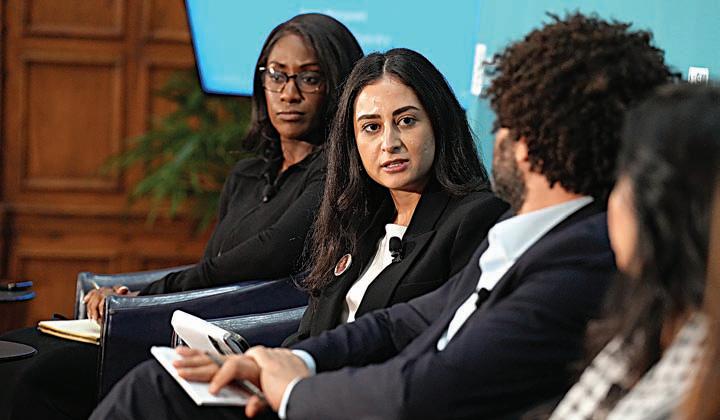
such an investigation has not been confirmed. The only official U.S. government report to date was completed by the U.S. Security Coordinator for Israel and the Palestinian Authority, Gen. Michael Fenzel, in May of last year. Despite not having access to key evidence or witnesses, Fenzel “pieced together a revealing account that provides critical insights into the conduct of the IDF [Israel Defense Forces] unit responsible for killing Shireen,” Van Hollen said, calling it, “a report which raises critical concerns about the IDF rules of engagement.” He called on the Biden administration to make the report available to the public. “I reviewed that report as soon as it became available and there is no reason— none—for it to be classified,” he said.
Lina Abu Akleh, a Palestinian human rights advocate and Shireen Abu Akleh’s niece, described the dual pain of processing grief and advocating for justice. “The fact that we were not able to mourn as a family and had to take on the role of advocating day in and day out for two years now is infuriating,” she said. After talking with myriad U.S. officials, she has no doubt that if her aunt were an Israeli American journalist there would have been swift justice. Multiple speakers addressed what they called the systemic dehumanization and discrediting of Palestinian journalists by the mainstream Western media. “They simply don’t view Palestinian journalists as journalists in a lot of cases. They are so demo-
nized and dismissed that they simply just don’t merit solidarity,” said Laila Al-Arian, the executive producer of “Fault Lines” on Al Jazeera. Mona Chalabi, data editor at the Guardian US, noted that Palestinian journalists are viewed as inherently biased. “Palestinians are assumed to be the most untrustworthy [sources] on Palestine,” she said, noting that Israelis, including officials who have frequently lied to the press, are rarely treated with such skepticism.
Akbar Shahid Ahmed, senior diplomatic correspondent for the Huffington Post, noted that reporters frequently show undue deference to government officials. “We cannot imagine the amount of government spin that most reporters covering this—from the Israeli government, but also from the American government—are receiving constantly,” he said.
Evidence of media bias is everywhere, Chalabi said. As one example, she pointed to the New York Times’ coverage of the recent pro-Palestine student encampments. According to someone she spoke to at the publication, the internal Slack channel employees used to prepare their reporting was titled, “anti-Semitism on campus.” Assigning such a label to the protests before any reporting even began undoubtedly framed how the paper carried out its coverage, she said.
Eman Mohammed, a Gaza-born photojournalist now living in the U.S., noted the inherent problem of the Fourth Estate lack-
ing accountability. “Who holds us accountable when we’re this complicit, when we’re this biased?” she asked.
Mohammed pushed back on those who say Israel must allow Western reporters into Gaza so that information from the territory can be shared with the world. Gazan journalists are producing “top-notch” coverage on their own, she said. The problem, she added, is not the raw coverage, but the indifference displayed toward the work and lives of Palestinian journalists. “I now see that we’re all disposable for the media,” she said.
As justice for Abu Akleh remains elusive despite much public pressure, Al-Arian questioned what this reality portends for lesser-known Palestinian journalists, let alone ordinary Palestinians. “If there’s no justice in the case of a prominent journalist like Shireen, who was a U.S. citizen, what is the hope for the thousands of other Palestinians killed by the state of Israel?” she asked.—Dale Sprusansky Slain World Central Kitchen Staff Eulogized
Amid the majesty of the Washington National Cathedral, a memorial service and celebration of life was held on April 25 for the seven members of World Central Kitchen (WCK) killed by the Israeli military in Gaza. The aid workers were traveling in well-marked vans in a deconfliction zone when they were targeted by Israeli drones.
WCK founder Jose Andres told touching personal stories about each aid worker killed, describing them as dedicated humanitarians who had served in Haiti, Ukraine, Greece, Türkiye and elsewhere. Andres expressed his deep personal anguish and anger at the slayings. “There is no excuse for these killings— none. The official explanation is not good enough,” he said. “We still demand an investigation into the actions of the IDF [Israel Defense Forces] against our team.”
Andres stressed that food must never be a weapon of war. Leaders must “build longer tables, not higher walls,” he said. “Every single human life is sacred and must never be treated as collateral damage.”
He said WCK does not seek to rescue
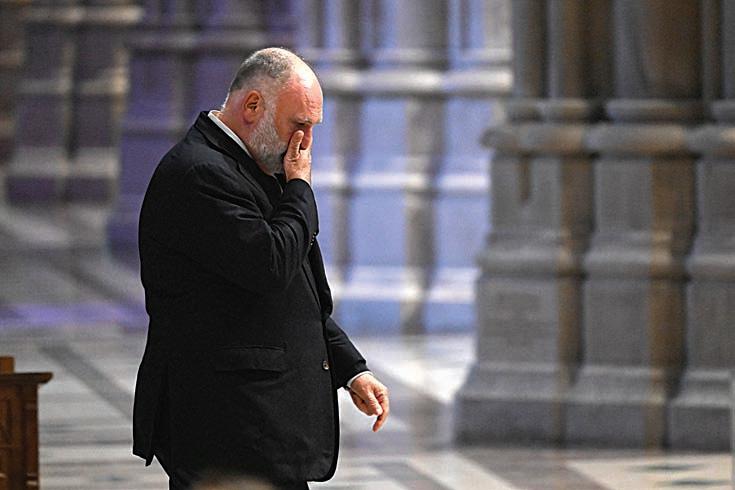
World Central Kitchen (WCK) founder Jose Andres wipes tears from his eyes as he attends an interfaith memorial service for the seven WCK workers killed by Israel in Gaza, at the Washington National Cathedral, in Washington, DC, on April 25, 2024.
people, but rather facilitate what happens naturally—people taking care of one another. “People don’t want our pity, they want our respect,” Andres emphasized. “Our only way to show respect is facing the mayhem alongside them…reminding them that they are not alone in the darkness.” He emphasized that times of darkness bring out the best in people and show that those who offer solidarity and love outnumber those who plot violence.
It was a stunningly beautiful service, featuring a Yo-Yo Ma cello solo, a choir and an orchestra. Doug Emhoff, Vice President Kamala Harris’ husband, was in attendance, representing the White House. Clergy from multiple Christian denominations, as well as a rabbi and imam, were also present to offer readings from their respective sacred texts.
One striking visual detail, perhaps a first at the Washington National Cathedral, was the Palestinian flag, displayed among the flags of each slain worker’s country of origin. A Palestinian American woman, Lena Seikaly, sang a stirring sacred country ballad, “I’ll Fly Away,” as the closing song; her facial expression alone spoke volumes. Guests wiped away tears, hugged each other and walked in silence to an awaiting tented reception featuring simple lunch fare, including falafel sandwiches and Spanish rice. Mary Neznek
The Center for the Study of Islam and Democracy held its annual conference on April 17 at Georgetown University in Washington, DC. This year’s gathering featured hard-hitting criticisms of the U.S.’ hypocritical and anti-democratic policies in the Middle East.
Mustafa Akyol, a senior fellow at the Cato Institute, said Washington’s role in Israel’s destruction of Gaza has caused many in the Muslim world to totally balk at the idea that “Western values” represent lofty, humanistic ideals. “There was always some hypocrisy and alliances and national interests that got in the way [of these stated values], but for many people those double standards were never this blatant,” he noted. As to why the West seems to be largely content with permitting Israel’s genocidal assault against Palestinians, Akyol offered a simple but “painfully obvious” answer: “In the West, Israeli lives matter more—much more—than Palestinian lives.”
Trita Parsi, executive vice president of the Quincy Institute for Responsible Statecraft, noted that following Russia’s invasion of Ukraine, President Joe Biden and other Western leaders kept citing the importance of upholding the “rules-based international

(L‐ r) Egyptian Foreign Minister Sameh Shoukry, Jordanian Foreign Minister Ayman Safadi, UAE Minister of State for International Cooperation Reem Al Hashemi and U.S. Secretary of State Antony Blinken at a meeting to discuss the situation in Gaza, in Cairo, Egypt, on March 21, 2024.
order,” a term first coined by former Australian Prime Minister Kevin Rudd in response to Beijing’s ambitions in the South China Sea. However, since Israel’s latest military campaign against Gaza began on Oct. 7, there has not been a single instance in which a Biden administration official has used this phrase in reference to Israel’s actions, Parsi noted.
He believes the West has effectively substituted international law for its own, selfserving “rules-based international order.” While international law is the result of global consensus, the “rules-based international order” is “set by Western powers with or without the consent of other countries,” Parsi noted.
Parsi quoted South African jurist John Dugard, who helped lead the South African case against Israel at the International Court of Justice, to sum up the ethos behind this Western order: “The ‘rulesbased international order’ may be seen as the United States’ alternative to international law, an order that encapsulates international law as interpreted by the United States to accord with its national interests… meaning whatever the U.S. and its followers want it to mean at any given time.”
Ebrahim Rasool, the former South
African ambassador to the U.S., said Washington often “calibrates its values through its interests.” Great leaders, such as Nelson Mandela, who played a central role in defeating apartheid in South Africa, understand that values must inform interests, not vice versa, Rasool emphasized.
Georgetown University professor emerita Tamara Sonn argued that the term “national interest” is also highly problematic, often nothing more than “Orwellian double speak” meant to entrench the status quo within Washington’s bureaucratic apparatus. Those who work in U.S. foreign policy are “not even trained to think critically about what is actually in the U.S. national interest, about what would actually promote the well-being of the general populace,” she said. Rather, they simply regurgitate what they are taught in order to rise to positions of prominence, or to simply keep their jobs. She said colleges must begin pushing students studying for these jobs to think critically, rather than spoonfeeding them state propaganda. “We have bad policy because we train people to make bad policy,” she said.
After years of advocating for U.S. leaders to embrace democracy and human rights in the Middle East, Sonn said she has now
realized Washington is solely interested in maintaining its global dominance. “We used to think those policies were a result of policymakers just not knowing enough,” she noted. “I hate to say how long it took for me personally to recognize that those policies were deliberate, and that promotion of democracy and human rights is not the goal of U.S. foreign policy.”
Shadi Hamid, a columnist and member of the Washington Post’s editorial board, said former U.S. Ambassador to Israel Martin Indyk once admitted to him that democracy promotion was not a U.S. priority in the region while he served in government. Instead, Indyk said the focus was on working with authoritarian leaders to forge peace with Israel. “We’re not going to complicate it by pushing a democracy agenda,” he told Hamid. “Peace is a heavy lift, and it needs to be the priority.” Hamid said this is evidence that Washington’s obsession with Israel is directly linked to the endurance of repressive governments throughout the Arab world.
Israel sees the preservation of authoritarianism as being in its interests, Georgetown University professor Nader Hashemi argued. “No Arab public would allow for any sort of peace treaty with Israel to go forward unless there was something in it for the Palestinians, which is why you can only have the Abraham Accords with dictatorial regimes—you can’t have it with an Arab democracy,” he said. “Authoritarianism is in the DNA of the Abraham Accords, it’s the oxygen that fuels it and sustains it; you remove it and the entire edifice collapses.”
Hashemi said the Abraham Accords, signed between a handful of Arab countries and Israel under the auspices of the Trump administration, set the stage for the events of Oct. 7, as regional leaders and the U.S. were seeking “a way around the question of Palestine.” The reality is the issue of Palestine is central to the region, and Hashemi believes true peace can only be forged under democratic conditions. “A long-term peace agreement that can stand the test of time has to be made not with the dictators of the Arab world, but with the people of the Arab world,” he said.
Dale Sprusansky
The United States Institute of Peace in Washington, DC explored the challenges of providing much-needed humanitarian assistance to Palestinians in Gaza during an April 25 program featuring Sigrid Kaag, the United Nations senior humanitarian coordinator for Gaza.
For Kaag, who has been visiting Gaza since 1988, the territory is unrecognizable. “Everything is gone or reduced to significant amounts of rubble,” she said. “Where to start, how to keep going, how to maintain a measure of human dignity is a task for all of us.”
Israel has made a number of commitments regarding the safety of aid workers since its killing of seven World Central Kitchen humanitarian workers on April 1, she noted. However, she emphasized that existential changes are needed to ensure the safe and reliable flow of aid. Most importantly, “deconfliction needs to be clearly understood and adhered to,” she said, speaking before Israel began its May offensive, seizing the Rafah border crossing with Egypt and chocking off vital aid.
“We need a paradigm shift…we need a significant increase in [aid] volume,” Kaag emphasized. At the time of her remarks, she said more aid trucks were entering into Gaza, “but that tells you very little of the quantity of the supplies, the relevance, the types of goods that you need—not only to sustain a population but deal with malnourished children, provide the right therapeutic feeding, give dignity kits to women and girls, to have the right type of medication for trauma care and also chronic health care,” she said. “There’s a broad scope of needs and for that we need to see a change, not only on the supply side, but also in our ability to deliver.”
Gaza is a conservative society, she noted, but prior to Oct. 7 of last year, all women and girls went to school and completed their education. Now, many are in the streets collecting food and water while violence against them has increased. Lack-

ing electricity, the streets are not a safe place for women and girls at night, even to go to the toilet. There is also a danger for the many unaccompanied and orphaned children in Gaza. “The vulnerability, to my mind, lies in the deep poverty, total exposure and lack of safe shelter,” Kaag said. If a family is deeply impoverished, she noted, girls won’t continue their education. “We have to push for the fact that rights are equal but vulnerabilities are not equal,” Kaag said. “There is an inequality built in and I think that’s something we also have to anticipate.”
Kaag said her mandate is simply to do everything in her power to alleviate the suffering in Gaza. “The only [important] metric is if the well-being of the people is improving, if we can treat malnourished children, if we’re bringing people back from the brink, if there is sufficient shelter and if access to clean water is improved,” she said.
Elaine Pasquini
Speaking at Georgetown University and Busboys and Poets in Washington, DC on March 21, Tareq Baconi, president of the board of Al-Shabaka: The Palestinian
Policy Network and the author of Hamas Contained: The Rise and Pacification of Palestinian Resistance, discussed Hamas’ motivations for launching the Oct. 7 attack. He disputed the narrative that “this is an Israel-Hamas war,” as it assumes that “were Hamas to be removed from the equation, then there wouldn’t be an issue.”
Having interviewed Hamas’ leaders and accessed the organization’s archives, Baconi contends that Hamas is a result of the same “political drivers” as the Palestine Liberation Organization, albeit possessing an Islamist, rather than secular, identity. These drivers include “the right of Palestinians to achieve self-determination, dismantling Zionism, liberating historic Palestine [and] allowing refugees to go back,” he said.
Over the past two decades, Baconi noted, “Israel developed ‘mowing the lawn’ strategies whereby it relied on disproportionate military power to intermittently undermine Hamas’ capabilities” in Gaza. In addition to being brutal, this tactic was near-sighted. “The only goal that it [Israel] pursued in the past decade and a half was to try to ensure relative calm for its citizens, particularly those residing in the area surrounding Gaza, even if such calm came at the expense of imprisoning a captive population of millions and maintaining them
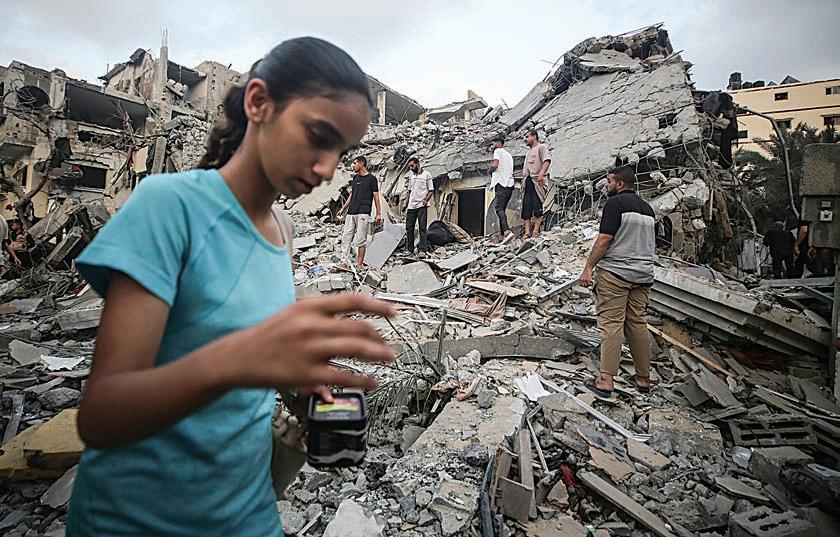
in near starvation-like conditions,” he said.
Israel’s efforts largely kept Hamas contained—until Oct. 7. “Given the movement’s commitment to Palestinian liberation and its firm refusal to concede by recognizing the state of Israel, that containment was always likely to be temporary unless serious effort was expended to deal with the political drivers at the core of the Palestinian struggle,” he opined.
Hamas “had pursued a strategic shift toward confrontation over the course of the past few years, most likely since the Great March of Return in 2018” (when Israeli snipers killed 223 Palestinians protesting along the partition fence), Baconi observed. Speculating on the organization’s decision to strike on Oct. 7, he remarked, “with a growing population in Gaza and governance shortfalls that were becoming increasingly acute, the expectation that Hamas or any other movement would not try to overturn that reality, especially as Israeli impunity expanded, was shortsighted.” He recalled that “between January and Oct. 6 of last year, more Palestinians were killed than in any other year before that, outside of times of spectacular violence.”
Baconi acknowledged that the “staggering death toll that civilians in Gaza are experiencing must give everyone pause to reflect on the enormous cost that Hamas’ operation initiated, even when the primary responsibility for this violence sits squarely within Israel.”
Oct. 7 was “a bloody display of anticolonial violence,” Baconi asserted, arguing that “the operation cannot but be seen as a response to Israel’s relentless and interminable provocation.” The unprecedented scale and deadliness of the offensive “laid to waste the very viability of Israel’s partition approach: the belief that Palestinians can be siphoned off into bantustans while the colonizing state continues to enjoy peace and security and even expand its diplomatic and economic relations in the wider region,” he said.
Although Israel claims the annihilation of Hamas is the objective of its war on Gaza, Baconi pointed out that destroying the movement would not change the fundamental issues that have motivated Palestinian resistance since 1948. “Let’s say tomorrow Hamas completely ceases to exist as an organization. The political drivers that animate Hamas will continue to exist in some other ideological garb because the Palestinian people are still
there, the Palestinians are still demanding the same things, nothing has changed,” he said. “The problem from Israel’s perspective and from the United States’ perspective is not Hamas, but Palestinian nationalism: as long as there’s a Palestinian national movement, whether it’s secular or religious, we’re going to have this type of dynamic and conflict.”
Baconi concluded that “the creation of a unified Palestinian political project that’s focused on full Palestinian liberation, that’s grounded in a century of Palestinian politics, in the right of return, in decolonization, is of the utmost importance to revive as a vehicle for liberation.”
Jack McGrath
The Arab Center Washington DC hosted a webinar on April 18 that featured several prominent Palestinian leaders and academics to discuss the future of the Palestinian national movement. Khalil Jahshan, executive director of the Arab Center Washington DC, moderated the event.
The panel reflected on the Gaza war and its implications for Palestinian self-determination. Hanan Ashrawi, a former member of the executive committee of the Palestine Liberation Organization (PLO), described Israel’s destruction of Gaza as an “erasure of the future” that is “predetermining the nature of Palestine—not just geography, but of course demography.”
Mustafa Barghouti, general secretary of the Palestinian National Initiative, said Israel has sent “a very clear message to all Palestinians [and] to the world” that “they have one solution to the fact that we now have seven million Palestinians living on the land of historic Palestine…and the Israeli solution is ethnic cleansing.” He drew a sharp distinction between Israeli Prime Minister Binyamin Netanyahu’s coalition and past Israeli administrations. “This time we are dealing with a fascist government,” as well as “a whole society that has moved toward fascism,” he said.
Khalil Shikaki, director of the Palestinian Center for Policy Survey Research, assessed the war’s impact on public opinion

in the West Bank and Gaza. During status quo periods without war or tangible progress toward peace, Palestinians tend to back the parties that reflect their personal values, primarily Islamism or secular nationalism, he explained, with 40-45 percent of Palestinians in Gaza usually supporting Hamas compared to less than 20 percent in the West Bank.
Polling conducted in late Nov. 2023 showed support for Hamas in the West Bank increased from 12 percent to 44 percent, before declining to 30 percent in March. Meanwhile, in Gaza, support for Hamas rose from 38 percent to 42 percent and has since fallen to 34 percent.
While support for Hamas has fluctuated since Oct. 2023, Shikaki noted that the West Bank-based Palestinian Authority’s (PA) already poor reputation has plummeted. “The complete irrelevance of the Palestinian Authority and its leadership to the conflict with Israel today is absolutely so pronounced that the PA has lost almost 90 percent of its legitimacy and public support, including twothirds of secular nationalists who would normally support it,” he pointed out.
Ashrawi decried the PA as “dysfunctional” and unable to lead Palestinians. “Our leadership is geriatric and has been for a long time,” which “has really prevented other generations, not just one generation, from reaching office or from leading.” She
also condemned the systemic marginalization of women from positions of power within the PA.
The speakers agreed that the PA is the primary obstacle to restoring the PLO as a legitimate representative of all Palestinians.
“There can be no reform as long as the PLO is completely co-opted” by the PA, which “has consumed the PLO” and eliminated its independence, Barghouti said. “Had we had elections in 2021, which the PA canceled, which the United States opposed, which Israel obstructed…we would not have had this war,” he maintained. Although elections are currently impossible, Barghouti advocated for the creation of a “temporary unified leadership, where all the parties would be represented, all the groups would be represented, civil society would be represented, and Hamas would be there.” He warned that “without a unified leadership, we are carrying a very huge risk of losing our right of self-representation.”
Leila Farsakh, an associate professor of political science at the University of Massachusetts Boston, also accused the PA of undermining Palestinian unity. “The last time it [the PA] was elected was in 2006. It is detached from the PLO and, actually, is trying to undermine the PLO,” she said. “The revival of the PLO cannot happen through the Palestinian Authority, unfortunately, unless new people come into the
Palestinian Authority.”
The entrenched Palestinian leadership has excluded independent organizations and movements in the occupied territories and diaspora from playing a role in Palestinian politics, said Ashrawi, who resigned from the PLO in 2020. “There are all these various grassroots mass mobilizations, but they’re not having institutional representation because those holding the key to the PLO are not interested in reviving it,” she said. According to Ashrawi, “a coup from within the PA” is what “everybody is waiting for and are talking about but don’t know how to do, because we are much more fragmented geographically than we have ever been.”
Jack McGrath
The Middle East Institute held a webinar on March 26 titled, “The Israel-Egypt Peace Agreement 45 Years On: Where Do Relations Stand in the Wake of the Gaza War?”
Hesham Youssef, a career diplomat with Egypt’s Ministry of Foreign Affairs, noted that Egypt has for decades faithfully adhered to the Camp David deal brokered by the U.S. “Egypt has never put its commitments in doubt in relation to the peace treaty,” he said, even though Cairo initially faced regional scorn upon signing the agreement in 1979. He added that the deal even endured the 2011 Egyptian revolution and the subsequent election of Islamist President Mohamed Morsi. Under President Abdel Fattah el-Sisi, who overthrew Morsi in 2013, relations have remained steady. As one example, he noted that amid Cairo’s war against militants in the Sinai, Israel permitted el-Sisi to expand Egypt’s troop presence in the peninsula beyond the limits outlined in the treaty.
However, Youssef said Egypt and Israel have never moved beyond a “cold peace” in which official relations are stable (but have limited breadth) and business and people-to-people contacts are minimal. “I think this will continue to be the case until the Palestinian conflict is resolved,” he said. “The attachment of Egyptians to the resolution of this conflict is not fully appreciated, particularly in some parts of Israel.”

Ksenia Svetlova, executive director of the Regional Organization for Peace, Economics and Security, said her organization’s efforts to promote closer ties between the countries in areas such as water management have fallen victim to the “cold peace” paradigm. The securitization of the relationship makes it difficult for those outside of the military or high-level political positions to push initiatives forward, she noted, meaning that actors such as civil society and mid-level diplomats have few spaces to navigate. Negative attitudes among Egyptians toward Israel also limit the degree to which Cairo is willing to openly engage with Israel.
Outside of mediating between Hamas and Israel, working with Israel on mutual security matters and participating in the East Mediterranean Gas Forum with Israel, Cairo remains relatively distant from Israel, Svetlova, who previously served in the Israeli Knesset as a member of a center-left party, noted. “There is little common ground in many spheres…except for gas and energy,” she said. “It is frustrating for many businessmen from Israel, and I know for many businessmen in Egypt, that they cannot go through this invisible but very well felt wall of mistrust.”
Svetlova agreed Palestine lies at the heart of improving the bilateral relationship. “There cannot be a huge, real movement toward [full] normalization…until there is a
solution for the conflict with the Palestinians,” she said.
Mirette Mabrouk, the founding director of the Middle East Institute’s Egypt program, said she does not envision the relationship between the two countries growing, particularly given the ongoing Israeli assault on Gaza. “Talk about economic relations under the current circumstances is going to be constrained in the extreme,” she said. “It is impossible to overestimate national feeling in Egypt about what is happening in Gaza, and this is important because the government cannot afford to discount public opinion about what is happening in Gaza.”
Mabrouk does not think Egypt will cease diplomatic ties with Israel due to its Gaza policy. “The relationship with Israel as far as the Egyptian government is concerned is largely valuable…because of various security issues, and because it’s its neighbor and because of the gas,” she said.
However, she warned Israel not to think Cairo has no red lines, particularly when it comes to the possibility of Palestinians fleeing to Egypt from Gaza en masse due to Israeli bombardment. “I honestly think that the Egyptians have exerted an enormous amount of self-control,” she said. “One of my worries is that there is perhaps a tendency in Israel to take Egypt and Egyptian reactions for granted because there is a peace treaty…I personally think it would be a mistake to take Egypt for granted.”
On May 12, Egypt announced it was joining South Africa’s International Court of Justice case accusing Israel of genocide. The move indicates Cairo is increasingly frustrated with Israel as it expands military operations in Rafah (which borders Egypt) and refuses to fully embrace Egypt’s efforts to negotiate a ceasefire.
Dale Sprusansky
“People know about land grabs, they know about demolitions,” said Jeff Halper, director of the Israeli Committee Against House Demolitions, “but they know less about the water issue, including what’s called ‘the water grab.’”
Halper was speaking at a March 17 online film salon, “Israeli Apartheid in Action: Water Control,” organized by Voices From the Holy Land. The panelists explored how Israel uses water as a weapon of ethnic cleansing in the West Bank and “slow genocide” in Gaza.
As described in a 2023 report by panelist Eyal Hareuveni, researcher at the Israeli human rights organization B’Tselem, Israel maintains near-complete control over the region’s freshwater aquifers, severely restricting Palestinians’ ability to drill wells, install pumps, build water tanks, access piped water and even collect rainwater.
The average Israeli consumes over three times the amount of water used by Palestinians on the water grid in the West Bank, and nine times the water used by West Bank Palestinians who do not have access to piped water. Nearly all Israeli citizens inside the 1948 boundaries and in settlements have running water, compared to just 36 percent of West Bank Palestinians.
Meanwhile, according to the United Nations, Gazans are now consuming less than three liters of water per day, hardly enough for survival, and Israel’s current bombardment of the Gaza Strip has rendered much of its water infrastructure (such as pumping stations and wastewater treatment facilities) inoperable.
Palestine is part of the Fertile Crescent and has plenty of water, noted Mazin Qumsiyeh, director of the Palestine Institute for
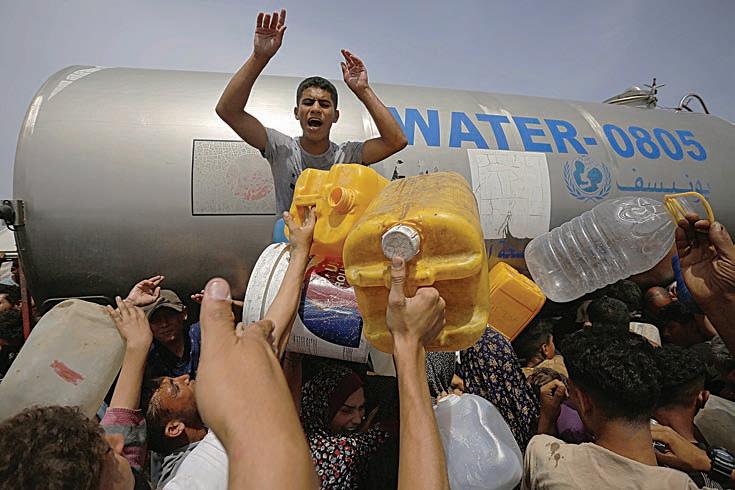
Biodiversity and Sustainability. Ramallah has a larger annual rainfall than London, yet “the difference is that in London the water that’s collected goes to the use of the people of London, whereas the 619 millimeters that fall on Ramallah and the mountain areas, most of it goes to the Israeli settlers, and very little is left for the Palestinians,” he pointed out. “We don’t have a shortage of water here. We have a problem of unequal distribution.”
Israel’s water policies are not only discriminatory, but at times self-defeating, according to Qumsiyeh. He offered three examples. One, Israel drained the wetlands of the Hula Valley; reclamation efforts have failed, with only 1 of the 219 disappeared animal species returning. Second, along with Jordan, it diverted water from the Dead Sea, which is now developing sinkholes that in turn are adversely impacting Israel’s tourist economy. And third, Israel has repeatedly bombed sewage treatment facilities in Gaza; the sewage runs into the sea, where water currents carry it up the coast to Jaffa and Tel Aviv. “And so Israelis are literally swimming in the shit of Gaza,” he commented.
What can activists do to combat water apartheid? As models for local action, Nancy Murray, co-founder of the Alliance for Water Justice in Palestine, pointed to the work of the Alliance, which successfully in-
terrupted a water partnership between Israel and Boston, and Milwaukee 4 Palestine, which is campaigning against a partnership between Israel and Milwaukee. Such partnerships give Israeli companies with technological expertise in areas such as wastewater treatment and storm water management access to U.S. markets. According to Murray, these local campaigns require a range of efforts, including demonstrations, lobbying members of the state legislature and the governor, and educating the public.
Murray noted that the water crisis in Palestine intersects with water justice issues in U.S. cities such as Jackson, MS, and Flint, MI, and in Mexico, where the Israeli company IDE Technologies plans to build a desalinization plant and pipe the water 200 miles north, through Native American lands, to Arizona. The North American contexts present opportunities to foster public discussion of water as a human right, as acknowledged by the United Nations in a 2010 resolution.
“We have wonderful international laws, including international water laws, but there’s no enforcement,” Halper noted. “So what needs to happen is for civil society to mobilize and to force governments to sanction Israel.”
Ultimately, according to Hareuveni, the main way to end water apartheid is “to end
the occupation. Until we reach that kind of conclusion, there will be no real change.” Qumsiyeh concurred. The problem, he said, “is not Hamas, it is not Fatah, it is not water. All of these things are symptoms of the underlying issue, which is Zionism.”
A recording of this panel discussion can be viewed at <voicesfromtheholyland.org/ salonrecordings>. The event was co-sponsored by the Progressive Workers Union Palestine Solidarity Group and the Alliance for Water Justice in Palestine.
Catherine Baker
Three high-profile Biden administration employees who resigned over the past several months in protest of the administration’s position on Israel’s bombing of Gaza joined the Foundation for Middle East Peace (FMEP) on April 12 for a virtual conversation about their decisions to leave.
The first to resign over Gaza was Josh Paul, former director of congressional and public affairs in the Bureau of Political-Military Affairs at the State Department. Having worked for 11 years in an office that approves U.S. arms transfers to partners, he decided to resign in October 2023 just weeks into the war because it was clear to him that signing off on lethal weapons to Israel “will only lead to more and deeper suffering for both the Israeli and Palestinian people—and is not in the long-term American interest.”
Paul observed that time has borne out his objections, not only in Gaza but also in the West Bank. He acknowledged that he was in a somewhat privileged position; having gone to State from the security sector, he thought he would always be employable in that sector, perhaps overseas. Asked about President Joe Biden’s moves to bypass Congress and fast track arms transfers, Paul said that sets dangerous precedents that future presidents will exploit.
Tariq Habash, a political appointee and policy adviser in the Department of Education’s Office of Planning, Evaluation and Policy Development, resigned in January 2024. A Palestinian American, he resigned because (as he stated in his resignation

Former State Department official Josh Paul (r) joins a sit‐in denouncing the Dutch govern‐ment’s policy toward Israel in front of the Ministry of Foreign Affairs in The Hague, Netherlands, on Feb. 26, 2024.
letter) he “cannot represent an administration that does not value all human life equally.” He found it dehumanizing to listen to the president talk about things he didn’t know or hadn’t seen. The department held “listening sessions,” which sounded good until he realized that people weren’t reflecting on what they heard. Habash believes his resignation had an impact in his department; before leaving, he was asked what the department could do to be more inclusive, and he proposed providing a mechanism for staff to express substantive differences on matters that affect people’s lives.
Annelle Sheline resigned from the State Department’s Bureau of Democracy, Human Rights and Labor in March 2024 because, as someone who believes strongly in her department’s mission, she found it impossible to continue to work for a government that enables genocide. She had not planned to resign publicly, but coworkers asked her to speak up; her comments made clear that dissent within the State Department is significant. (Indeed, two of her coworkers attended a Land Day rally in Washington, DC’s Dupont Circle on March 30.) Sheline’s voice broke when recounting a conversation she had with a nurse in Gaza who told her that Gazan children express a wish to die just to end their intolerable suffering.
FMEP fellow and event moderator Rania Batrice asked each speaker to offer advice to others who are contemplating actions of their own, and the answers were practically unanimous: organize. Paul reminded the audience to prepare for a marathon, not a sprint. Habash advised people to identify an advocacy organization that works in an area of interest and to join it in collective actions, to call elected officials, to write letters and to donate to people who represent your values because they are likely under attack. He also encouraged others to join demonstrations, have difficult conversations with people in power and resign from positions if they can, whether publicly or not. (All three speakers acknowledged that they have working spouses or savings that made their decisions possible without too much financial stress.) Sheline encouraged the audience to keep up public pressure for a ceasefire, including by putting signs in windows and on front lawns. Public signs help people who might share the same view realize that they are not alone, she said.
Two weeks after the event, Hala Rharrit, a State Department veteran who most recently served as an Arabic-language spokesperson based in Dubai, also resigned. She told the press that she could no longer repeat Washington’s “provocative” talking points about Gaza and Israel. “They
oftentimes completely ignored Palestinians,” she said. “I, in good conscience, could not go on Arab television with those talking points. All that would have done is have caused someone to want to throw their shoe at the TV, want to burn an American flag or, worse, throw a rocket at our troops.”
Rharrit also said the climate within the State Department is toxic. “People [fear] retribution” for opposing the administration’s Israel policy, she said. “That’s something that’s been very unusual, because throughout my 18-year career, no matter who the president was, no matter what the policy was, there were always robust internal conversations about policy, about what we’re doing right, about what we’re doing wrong. But there’s been this strange chilling effect with this conflict.” Ida Audeh
As the U.N. General Assembly on May 10 announced its adoption of a resolution in support of Palestinian statehood, activists from Code Pink visited the offices of U.S. senators to demand an end to U.S. support for Israel.
Meeting in the Hart Senate Office Building foyer under the ever-watchful eye of the Capitol Police, the group rallied before departing to visit the offices of senators. As U.S. Army (Ret.) Col. Ann Wright addressed the group, activists on the secondfloor balcony unfurled large banners saying, “Stop Arming Genocide.” Police swiftly pulled the banners away from the balcony. Sen. Sherrod Brown (D-OH), one of 79 senators who voted in favor of $26 billion in additional aid to Israel, was among the members targeted by the activists. After entering his office, several of the activists performed a die-in clothed in faux bloodstained shrouds accompanied by three people dressed in black wearing death masks. Several activists spoke with a staff member, passionately pleading for an end to the genocide in Gaza.
At the office of Sen. Ben Cardin (D-MD), the powerful head of the Senate Foreign Relations Committee, a staff member briefly answered questions about his position on Gaza, saying that the senator would issue a statement later in the day clarifying
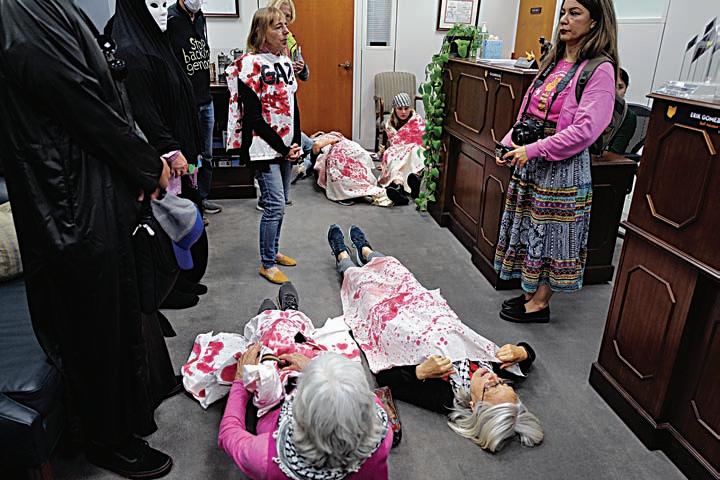
his position. By day’s end, no such statement had been issued.
In the office of Sen. Richard Blumenthal (D-CT), activists noted the irony of a framed photo memorializing the 26 victims of the 2012 Sandy Hook Elementary School shooting, which included the words, “Together we birth a culture of peace.” That universal principle of peace and non-violence carries little weight for Palestinians, they noted. Phil Pasquini
As the world watched their governments fail to stop Israel’s rampage in Gaza, people came together to raise funds to help desperate charities save Gazan lives. Members of the Virginia Coalition for Human Rights and Middle East Books and More have cohosted numerous sidewalk sales outside our 18th Street NW bookstore beside the Museum of the Palestinian People. As activists and kids decorated a Christmas tree with messages for Gazans, our successful Dec. 16 holiday market raised funds for Doctors Without Borders. With help from Falafel Inc, our Valentine’s Day fundraiser

fed shoppers and bike riders for Gaza, who united to raise funds for Middle East Children’s Alliance. A Ramadan sidewalk sale on March 24 raised money for Heal Palestine. On Land Day, March 30, we joined forces again to support United Palestinian Appeal, as protesters called for a ceasefire at nearby Dupont Circle.
For months after the U.S. government halted funds to the United Nations Relief and Works Agency for Palestine Refugees in the Near East (UNRWA), generous bookstore visitors slipped cash into a jar at our bookstore’s checkout desk. Middle East Books and More became a hub for people to come together, talk, help others and shop for books, keffiyehs and other items.
Live for Palestine, a benefit concert in Darnestown, MD, raised funds for Palestine Children’s Relief Fund on April 7. In between listening to bands playing their hearts out in a barn/garage, the audience heard community organizers, including Noor Nabulsi from American Friends Service Committee, and Anam Raheem who recently worked at a tech hub called Gaza Sky Geeks, describe the ongoing nightmare in Gaza. —Delinda C. Hanley
The Middle Eastern American Advisory Group, the Office of Community Partnerships and the Arab Americans of Montgomery County hosted a celebration of Arab American heritage on April 20, 2024, at the county’s Executive Office Building. The number of Marylanders who claim Arab ancestry has more than doubled since the census first measured ethnic origins in 1980, and is among the fastest growing Arab populations in the country.
Montgomery County Executive Marc Elrich read proclamations declaring the month of April Arab American heritage month and stayed to listen to a very sobering description of Israel’s war on Gaza by Khaled Elgindy of the Middle East Institute.
“One atrocity doesn’t warrant another,” Elgindy began, after apologizing for de-
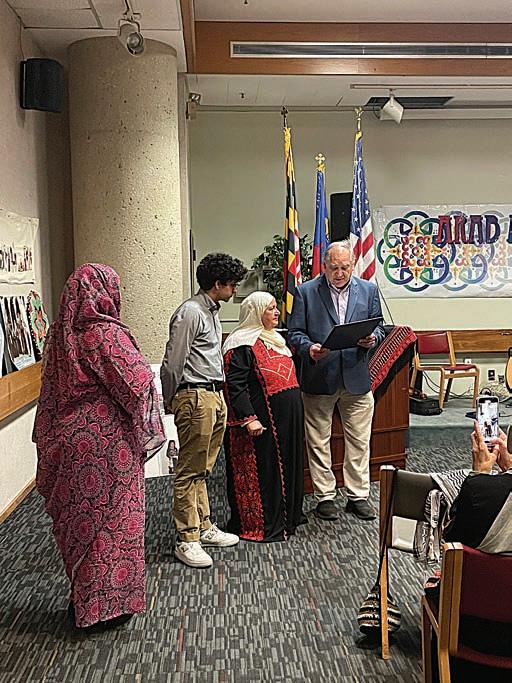
Continued from page 24
After the hospital was besieged, we entered into a real famine, and no one could leave the hospital. One day, a hungry little girl was crying. I asked her father why she was crying and was told that she was hungry and that he had nothing to give her. Both of her parents had been injured and could not search for food for her.
My professional duty requires me to help anyone who needs me, even if it is difficult. I went among the displaced people to ask them if they had any surplus food or bread, but unfortunately, no one did. Since I had promised this child that I would get food for her, I went to my closet, where I was hiding some dates to turn to when I got hungry. Why should any of us be hungry?
I took the last four dates I had and gave them to that child. She was as happy as if she had been given a treasure. And I had fulfilled my mission as a nurse: to keep people alive. ■
pressing listeners on a festive occasion. He observed the Hamas attack didn’t happen in a vacuum. “There’s been a 56-year occupation in which one state controls all the land and resources as well as five million Palestinian lives. Palestinians who have no pathway to Israeli citizenship.” Israelis felt safe before Oct. 7, but Palestinians have never felt safe, he contended.
Israel’s assault on Gaza is the largest, most destructive war of this century, Elgindy said. The scale of destruction in a few months exceeds that of the German cities of Dresden, Hamburg
Continued from page 25
Nowadays, I question whether people care about Gaza and whether anyone is reacting to the heinous actions against us. I would love to say that people do care. Humanity should be like a body: if one organ or limb is in pain, it affects the whole. This war by Israel has done more than killed Gazans, it has killed the world; it has decayed morals like a rotting tooth that digs deep into the enamel and spreads throughout the mouth.
But watching people worldwide chant slogans in the streets in support of Gaza renewed my hope. We saw and trusted the emotions of those yelling, “Leve, leve, leve Palestina.” This Swedish song became popular during this genocide and demands of the world to “Let Palestine Live.” Even under the bombardment, we felt like screaming for peace and an end to the war. Our throats ached with the cry.
and Munich after three years of bombing. Israel has used 65,000 tons of explosives in Gaza, more than three times the power of the atomic bomb that destroyed Hiroshima, Japan. The lasting effects will be felt for decades, he warned, and now Israel is using starvation as an instrument of war. “The U.S. is not a bystander in this war. It’s the chief sponsor and supplier of weapons and we have the power to stop it immediately,” Elgindy concluded, to a large round of applause.
The festivities went on to feature a musical performance of favorite songs from many Middle Eastern countries by Muath Limited. The Sudanese song inspired women in the audience to join in and show some superb dancing moves. After exploring an engaging cultural display of artwork and crafts from the region, and an array of information from non-profits (including Washington Report magazines), attendees enjoyed a delightful spread of Arab American cuisine, courtesy of District Falafel.
Delinda C. Hanley
Despite the ongoing Israeli wars against Palestine, the construction of imposing walls and barriers, and the rise of extremist governments, people have still managed to come together in their love of Gaza. We need to go no further than Gaza, Syria and Ukraine—all targeted by indiscriminate missiles—to know that the killing of children is a crime against humanity.
I wanted to pass this hope to a child I met at the relief center in Rafah who shared a most poignant fear of being invisible to the world as the carnage surrounds him. “Do they feel us?” he asked me. I responded with an unequivocal yes: “We still have good people in this world,” I assured him.
Palestinians will never turn their back on humanity. They will never harm anyone despite the harm they have suffered. They know better than anyone what it is to experience war and their hope will always be to live in peace, with one soul, as one team, united. Just as I had felt united with the soccer teams of Argentina and Brazil, I hope I will see the world united against war. ■

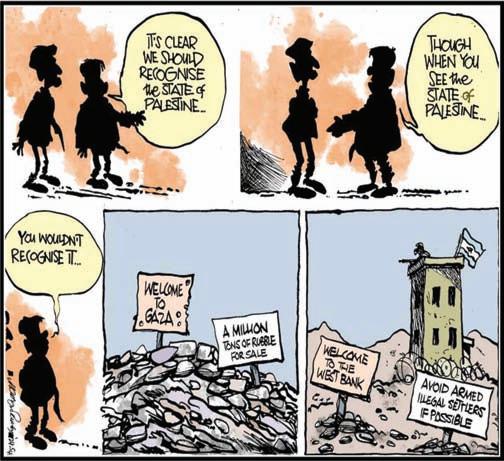



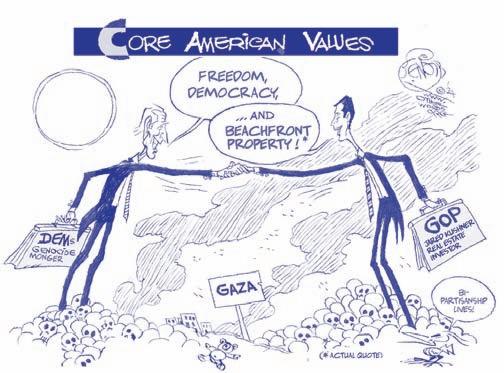

All books featured in this section are available from Middle East Books and More, the nation’s preeminent bookstore on the Middle East and U.S. foreign policy. www.MiddleEastBooks.com • (202) 939-6050 ext. 1101
By Steven Salaita,
Fordham University Press, 2024, hardcover, 178 pp. MEB $24.95
Reviewed by Ida
Audeh
An Honest Living: A Memoir of Peculiar Itineraries is a meditation on what is required to live honestly and with integrity in a world that values conformity to power structures and hierarchies and finds ways to punish those who fail to respect established parameters. Steven Salaita is eminently qualified to opine on this subject. He is Arab American, a former tenured professor of Native American Studies and someone for whom teaching is a calling (there is “something beautiful about working with students”). Yet, he lost two teaching positions because powerful donors objected to his politics (and possibly his field of expertise) and applied pressure on universities to terminate his employment. Salaita’s experience is an extreme but not an isolated incident; academics and activist students are under constant assault for speaking out and organizing against corporate and colonial entities.
Despite having published six books by the age of 35, Salaita became radioactive within the U.S. academe. This memoir covers primarily the five-year period (2017-2022) he spent outside of the academe, including when he worked as a school bus driver for two years or so, until COVID shut the country down. (By 2022 he was teaching again, at the American University in Cairo.)

Zionists are never satisfied with ensuring that a vocal and eloquent proponent of Palestinian rights is silenced or fired from a job; their ultimate goal is to make the person unemployable and destitute. (Even during his brief tenure at the American University of Beirut, he was still within reach of their venom.) For Salaita, driving a bus removed him from their radar screen and afforded him a kind of freedom. And because the work culture of school bus drivers is conducive to solidarity and cooperation among coworkers, it provides an honest living, one that doesn’t require compromising principles or schmoozing with management to hold on to the job.
Salaita shares his entertaining and insightful thoughts on a range of topics that he mused about while driving kids to school and back home, including power relations in workplaces and social disconnection. For example, he says the shortcomings of urban design are immediately apparent to bus drivers, and he views cul-de-sacs that isolate homeowners and stymie interaction with others as a metaphor for an unhealthy and disconnected society.
From the very first sentence (“This is not a memoir”), Salaita conveys his ambivalence about the genre, which he labels “overwrought” and “self-indulgent.” An Honest Living is anything but that and is in fact what lovers of the genre enjoy most about it when written well. Thoughtful and written with almost painful honesty, he is very clear that he does not want this account of his time spent out of academia to be exclusively about his personal experience. He looks instead at the broader implications of his traumatizing career roadblocks and on the possibilities of living according to one’s principles in the 21st century.
What makes this memoir so moving is Salaita’s honesty not only about his life but also his quirks and anxieties. He acknowledges personal qualities that are incompatible with career advancement, such as failure to put in an appearance at social functions. He also came to realize that his identity was more of an issue than he fully understood: “I wasn’t naïve about the problem of anti-Arab racism; I was naïve about the open-mindedness of academe.” He describes medical conditions he’s experienced, anxiety and loneliness—not to arouse the reader’s sympathy but as corollaries of contending with burdensome social expectations. He recalls the challenges of contending with career trauma while trying to parent his son. He acknowledges the very real damage—to his career as well as his sense of self—caused by his political foes, revealing a vulnerability that makes the reader wince.
Salaita’s description of the decisions he made to live with integrity and without compromising core beliefs will resonate with a wide audience, especially today as academics and student activists are bearing the brunt of unprecedented frontal assaults on free speech. But it is clear that he has a very specific audience in mind: his young son, whose emotional and physical development he observes with tenderness and profound respect. Toward the end of this memoir, he writes: “that’s what I want more than anything from this life, for my child to one day be proud of me.” This account of the principles that fortified him during the roughest times in his life practically guarantees that.
By Avi Shlaim, Oneworld Publications,
2023, hardcover, 324 pp. MEB $29.95
Reviewed by Allan C. Brownfeld
This memoir by Avi Shlaim, one of Israel’s “new historians” (a group of scholars who offer critical interpretations of the history of Zionism and Israel), tells a story with which few are familiar. In July 1950, Shlaim, aged five, and his family were forced into exile, fleeing their beloved Iraq for the new state of Israel.
Shlaim was born into a wealthy Jewish family in Baghdad in 1945. He notes, “We were Iraqis whose religion happened to be Jewish…Baghdad was known as ‘the city of peace’ and Iraq was a land of pluralism and coexistence. We in the Jewish community had much more in common, linguistically and culturally, with our Iraqi compatriots than with our European coreligionists. We did not feel any affinity with the Zionist movement, and we experienced no inner impulse to abandon our homeland and to go and live in Israel.”
However, anti-Jewish sentiment began to rise across the region following Israel’s creation in 1948. The most significant charge in Three Worlds is that Israel and Zionist leaders capitalized on this hostility by plotting acts of violence to intimidate Arab Jews into relocating to Israel. The most significant incident in Iraq occurred on Jan. 14, 1951, when a hand grenade was thrown into the forecourt of Baghdad’s Mas’uda Shemtob synagogue, killing four Jews and injuring 20 others.
Shlaim claims to have come across “potentially credible evidence that the Mossad l’Aliyah Bet (the Yishuv’s unit that handled illegal immigration to Palestine) and the Zionist underground in Iraq were behind the Baghdad bombings.” He declares, “The person who was responsible for three of the bombs was Yusef Ibrahim Basri…a
Allan C. Brownfeld is a syndicated columnist and associate editor of the Lincoln Review, a journal published by the Lincoln Institute for Research and Education, and editor of Issues, the quarterly journal of the American

lawyer by profession, a socialist and an ardent Jewish nationalist…His purpose was not to kill, but to frighten hesitant Jews and to prod them to register to cancel their Iraqi citizenship.”
Shlaim laments this effort to forcibly uproot Jews who lived peacefully in Iraq for generations. “Our migration to Zion was one of necessity, not an ideological choice,” he writes. “It is no exaggeration to say we were conscripted into the Zionist project. Moreover, migration to Israel is usually described as Aliyah, or ascent. In our case the move from Iraq to Israel was a Yeridah, a descent down the social and economic ladder.”
Shlaim’s mother died in Israel at the age of 96 in 2021. He recalls, “She often talked about the many close Muslim family friends who used to come to our house in Baghdad. One day, when she was over ninety, I asked her whether we had any Zionist friends. She gave me a look that implied this was an odd question, and then said emphatically, ‘No! Zionism is an Ashkenazi thing. It had nothing to do with us!’ This, in essence, had been my elders’ view of Zionism before we were catapulted into Israel.”
Iraq has a long history of religious tolerance, Shlaim points out. “The Jewish connection to Babylon goes back to the time of Abraham the Patriarch…Jews lived in Babylon since 586 BC…Babylon became the spiritual center of the Jewish diaspora…It was there that the Babylonian Talmud was compiled…The Jews were thus firmly settled in Babylon long before the rise of Islam.”
Zionism, Shlaim argues, had two major victims: “Palestinians are the main victims of the Zionist project. More than half of their number became refugees, and the name Palestine was wiped off the map. But there was another category of victims…the Jews of the Arab lands…My memoir is about the second category of the victims of the Zionist movement, as reflected in the history of my family.”
Once his family emigrated to Israel, Shlaim, as a schoolboy, felt the contempt in which Israelis held Jews from Arab countries. Iraqi Jews experienced disrespect for their culture and history and the denigration of their language. The unstated aim of schools was to undermine their Arab-Jewish identity and to turn them into loyal citizens of the new Israeli nation, Shlaim says.
Shlaim left Israel for England at the age of 16 to study at a Jewish school. He returned in 1964 to serve in the Israel Defense Forces and then moved back to England to read history at Jesus College, Cambridge. He married the great granddaughter of David Lloyd George, who was the British prime minister at the time of the Balfour Declaration, and became a fellow at St. Antony’s College, Oxford in 1987.
For the future, Shlaim advocates one democratic state between the Jordan River and the Mediterranean Sea, with equal rights for all citizens regardless of religion or ethnicity. “For Israeli Jews,” he writes, “one state would have the great merit of preventing them from going further down the road of apartheid South Africa.”
By Steve Coll, Penguin Press, 2024, hardcover, 576 pp. MEB $35
With the possible exception of Vladimir Putin, no foreign leader in recent history has been as thoroughly demonized by the United States as Saddam Hussein. After Iraq invaded Kuwait in 1990, the first Bush administration explicitly portrayed Hussein as an international menace of Hitlerian proportions, a caricature further embellished
by the second Bush administration before the 2003 U.S. invasion of Iraq. This framing not only omits the history of U.S. support for the Ba’athist regime, but also demonstrates Washington’s ignorance of Hussein’s thinking.
Pulitzer Prize-winning journalist Steve Coll’s latest book, The Achilles Trap: Saddam Hussein, the CIA and the Origins of America’s Invasion of Iraq, skillfully illuminates both sides of the turbulent relationship between Baghdad and Washington. Utilizing firsthand interviews and an archive of Hussein’s discussions with his inner circle (which the author sued the Pentagon to access), Coll reconstructs the mutual miscalculations that led to the First Gulf War and the U.S. invasion of Iraq. In doing so, Coll constructs a compelling historical narrative told through the perspectives of Iraqi nuclear scientists, CIA officers, Ba’ath apparatchiks, American presidents, and, at the center of it all, Saddam Hussein.
The Achilles Trap begins in the decades before Hussein became an international pariah. The Israeli bombing of Iraq’s incomplete nuclear reactor in 1981 proved a significant setback to Hussein’s atomic ambitions, but Baghdad continued its WMD programs without foreign assistance until the early 1990s. The Reagan administration was aware of Hussein’s WMD programs but supported the secular strongman as a bulwark against Iran. Coll believes that “dismissive attitudes toward Arab societies, or outright racism, no doubt skewered the judgments of at least some American analysts,” who “assumed that Iraq could not build a bomb without foreign help.”
During the Iran-Iraq war, the CIA provided satellite intelligence of Iranian military positions to Iraq, which regularly used the data to coordinate chemical attacks. Iraq’s flagrant use of poison gas prompted perfunctory condemnations from Washington (which accomplished little beyond aggravating Hussein), while military collaboration continued. Hussein’s penchant for conspiracy theories and his distrust of the United States were both vindicated by the Iran-
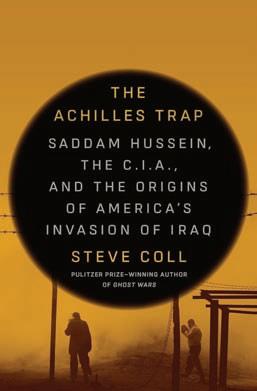
Contra affair, in which the Reagan administration shared Iraqi military positions with Iran and transferred arms to the Islamic Republic via Israel.
Perceiving Iran-Contra as proof that Washington aimed to prolong the Iran-Iraq war by arming both sides, Hussein remarked to his advisers, “I swear, I am not surprised,” but “this level of bad and immoral behavior is a new thing.” According to Coll, “the scandal affirmed Hussein’s bedrock convictions: Israel and Iran were in cahoots, and the CIA was their silent partner.”
This dynamic recurred in the aftermath of the Iran-Iraq war, as Hussein became convinced that Israel was planning to attack Iraq’s chemical weapons facilities with Washington’s backing. Although the Bush administration was seemingly uninterested in terminating its relationship with Baghdad, the assassination of a Canadian rocket scientist working on Iraq’s missile program by Mossad left Hussein with the opposite impression. In response, Coll writes, “Saddam apparently concluded that he should deter Israel by threatening catastrophic retaliation if Tel Aviv struck first,” which he did during a televised speech.
Meanwhile, nearly a decade of war left Iraq over $35 billion in debt to the Gulf monarchies, which Hussein expected to be largely forgiven in gratitude for containing Iran. When Kuwait proved less than amenable and a drop in world oil prices further weakened Iraq’s economy, Hussein began preparations to annex his oil-rich neighbor. The author notes that the Bush administration was preoccupied with the collapse of the Soviet Union, and Washing-
ton agreed with the prevailing consensus in the region that Hussein was bluffing to secure greater concessions. A greeting card from the president and a noncommittal meeting between Hussein and the U.S. Ambassador to Iraq, April Glaspie, sent decidedly mixed signals about Washington’s interest in Kuwait. Coll argues that “the State Department’s indirect warnings and Bush’s friendly Revolution Day letter meant that Washington’s messages had provided only the barest indication to Saddam that America might confront him with armed force if he invaded Kuwait.”
Hussein’s occupation of Kuwait and the resulting U.S.-led military intervention left Iraq internationally isolated, while devastating U.N. sanctions killed hundreds of thousands of civilians but left the regime intact.
Comprehensive U.N. inspections ensured that Baghdad’s nuclear program was defunct and its WMD stockpiles destroyed, but Washington remained concerned about Hussein’s ambitions. In 1998, Hussein expelled inspectors due to a mixture of frustration over the sanctions’ continuation and fear that the U.N. officials were CIA agents. The decision prompted a U.S. and UK bombing campaign, even as Hussein increasingly withdrew from day-to-day management of his dictatorship. In his final decade, Hussein proved significantly more interested in writing allegorical novels than plotting regional conquest.
Hussein believed that Washington knew he no longer possessed WMDs but was claiming otherwise to justify the sanctions. Despite these suspicions, Hussein did not take the threat of invasion seriously until late 2002, several months before the U.S.-led “shock and awe” bombing campaign.
Back in the U.S., Coll contends that Iraq’s isolation in the late 1990s and early 2000s resulted in an intelligence blackout that led the CIA to rely on duplicitous sources, such as Iraqi exile Ahmad Chalabi, who had every reason to inflate the danger posed by Hussein’s regime. The author also acknowledges that the second Bush administration took full advantage of false and grossly exaggerated intelligence to sell the war to domestic and international audiences.
The Achilles Trap is an exceedingly readable chronicle that utilizes an impressive
array of sources to chart the course of U.S.Iraq relations from the heights of the IranIraq war to Hussein’s capture and execution.
America and the Yemens: A Complex and Tragic Encounter
By Bruce Riedel,
Brookings Institution Press, 2023, hardcover, 75 pp. MEB $30
Reviewed by Jack McGrath
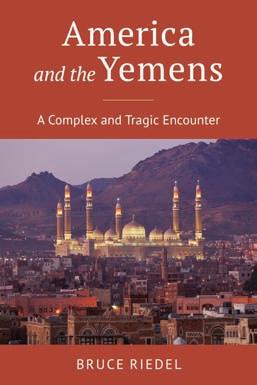
Houthi attacks in the Red Sea in response to Israel’s war on Gaza have thrown Yemen back into the international spotlight. Bruce Riedel’s America and the Yemens: A Complex and Tragic Encounter offers an eminently readable political history that gives much-needed context to the turbulent state of U.S.-Yemen relations.
Drawing from nearly 50 years of experience with Middle East policy as a CIA analyst, presidential adviser and senior fellow at the Brookings Institution, Riedel provides a compelling account interspersed with firsthand anecdotes and insights that make for a lively read. At an exceedingly concise 75 pages, America and the Yemens is far from comprehensive (chapter one spans 18801972), but substantively covers Washington’s role in Yemen over the past several decades. Riedel is at his best when detailing how successive U.S. administrations sacrificed hundreds of thousands of Yemenis on the altar of geostrategic interests. America and the Yemens speeds through the latter half of the 20th century. During this time, North Yemen became the battleground of a proxy war between Egypt and Saudi Arabia. The complex political landscape of the Arab Cold War was
Israel’s Black Panthers: The Radicals Who Punctured a Nation’s Founding Myth by Asaf Elia-Shalev, University of California Press, 2024, hardcover, 344 pp. MEB $26.95. Israel’s Black Panthers tells the story of the young and impoverished Moroccan Israeli Jews who challenged their country’s political status quo and rebelled against the ethnic hierarchy of Israeli life in the 1970s. Inspired by the American group of the same name, the Black Panthers mounted protests and a years-long political campaign for the rights of Mizrahim, or Jews of Middle Eastern ancestry. They managed to rattle the country’s establishment and change the course of Israel’s history through the mass mobilization of a Jewish underclass. This book draws on archival documents and interviews with elderly activists to capture the movement’s history and reveal little-known stories from within the group. In 20 short and captivating chapters, Israel’s Black Panthers provides a textured and novel account of the movement and reflects on the role that Mizrahim can play in the future of Israel.


Elastic Empire: Refashioning War Through Aid in Palestine by Lisa Bhungalia, Stanford University Press, 2023, paperback, 288 pp. MEB $35. The United States integrated counterterrorism mandates into its aid flows in the West Bank and Gaza Strip during the early years of the global war on terror. Some two decades later, this securitized model of aid has become normalized. Elastic Empire traces how foreign aid, on which much of the Palestinian population is dependent, has multiplied the sites and means through which Palestinian life is regulated, surveilled and policed. This book tells the story of how aid has essentially become war. The U.S. war chronicled here is not just one of tanks, grenades and guns provided to Israel, but also a quieter one waged through the interlacing of aid and law. It emerges in the infrastructures of daily life—in a greenhouse and library, in the collection of personal information and mapping of land plots, in the halls of municipal councils and in local elections—and indelibly transfigures lives.
New Under the Sun: Early Zionist Encounters with the Climate in Palestine by Netta Cohen, University of California Press, 2024, paperback, 228 pp. MEB $35. New Under the Sun explores Zionist perceptions of— and responses to—Palestine’s climate. From the rise of the Zionist movement in the late 1890s to the establishment of the state of Israel in 1948, Netta Cohen traces the production of climatic knowledge through a rich archive that draws from medicine and botany, technology and economics, and architecture and planning. As Cohen convincingly argues, this knowledge was not only shaped by Jewish settlers’ Eurocentric views but was also indebted to colonial practices and institutions. Zionists’ claims to the land were often based on the depiction of Jewish settlers as natives, even while this was complicated by their alienated responses to Palestine’s climate. New Under the Sun offers a highly original environmental lens on the ways in which Zionism’s spatial ambitions and racial fantasies transformed the lives of humans and non-humans in Palestine.

on full display, encapsulated by Israel’s covert support for U.S.- and Saudi-backed Royalists fighting Republican forces sponsored by Egypt and the Soviet Union. Meanwhile, an anti-colonial rebellion in South Yemen ended Britain’s occupation of Aden and established the region’s sole communist state in 1967. The following decades were defined by mutual enmity between “the Yemens,” and divisions persisted after the countries’ unification in 1990 under North Yemen’s President Ali Abdullah Saleh.
Yemen’s strongman for more than 20 years, Saleh is prominently featured in Riedel’s narrative. A shrewd dictator who likened ruling Yemen to “dancing on the heads of snakes,” Saleh was an unreliable ally to Washington for most of his reign. Still, his regime received hundreds of millions of dollars in U.S. military aid during the war on terror. Al-Qaeda gained a substantial foothold in Yemen due to Saleh’s support of anti-communist Islamic fundamentalists in Afghanistan and South
Yemen, including Osama bin Laden, in alignment with the Reagan administration. Saleh proved to be less interested in cracking down on al-Qaeda than he was in crushing the nascent Houthis, a Zaydi Shi’a movement in North Yemen radicalized by the U.S. invasion of Iraq.
Saleh’s forces killed the movement’s founder, Hussein al-Houthi, in 2004, but the regime’s military was unable to defeat the militants despite generous support from Washington and Riyadh. According to Riedel, “The Houthis won against both Saleh and the Saudi army, beating them both again and again” until the Arab Spring rendered the ruler’s position untenable. The Houthis took part in nationwide protests against Saleh in 2012, and the popular discontent eventually prompted Riyadh to pressure the tenacious autocrat into transferring power to his vice president, Abdrabbuh Mansur Hadi. In a national dialogue, the Saudi-backed government proposed a federal system dividing Yemen into six semi-autonomous provinces, whereby “The
Zaydi-dominated north got two landlocked entities, which the Houthis argued constituted gerrymandering against them,” Riedel explains. In an astounding act of opportunism by both parties, Saleh and the Houthis allied against Hadi’s government and marched on Sana’a, taking the capital in January 2015.
Mohammed bin Salman became Saudi Arabia’s defense minister in the same month and led the push for military action to re-install the ousted Hadi government. Riedel characterizes Riyadh’s decision as “the result of a combination of panic about the Houthis’ advances and their ties to Iran, with an unwarranted belief that defeating them would be easy and cheap.” The Obama administration greenlit the Saudi-led coalition’s intervention, “with little if any serious discussion,” to appease Riyadh, which opposed the U.S. efforts to negotiate a nuclear deal with Iran. Riedel points out that Washington’s support for the coalition goes almost entirely unmentioned in the recollections of Obama ad-
ministration officials, whose “collective amnesia” he finds telling.
The Trump administration discarded the Iran nuclear agreement and heightened military and intelligence support for the war as the Saudi-imposed blockade created conditions described by the U.N. at the time as “the world’s worst humanitarian catastrophe.” Riedel recounts how the coalition’s overwhelming military superiority failed to dislodge the de facto Houthi government, while the Houthis gained “popular support as the defenders of Yemeni nationalism against the hated Saudis,” despite imposing “a brutal police state.”
Opposition to the war grew in Washington due to the horrific Yemeni death toll and the dismemberment of dissident journalist Jamal Khashoggi inside the Saudi consulate in Istanbul. Secretary of State Mike Pompeo sought Riedel’s opinion on how to respond to the murder, but disregarded his advice to cut off U.S. military support until Riyadh lifted the blockade and agreed to a complete ceasefire. The Biden administration backtracked on its campaign pledges to stop arming the war, but supported a U.N.-brokered truce in 2022. The Houthis emerged from years of fighting and famine that killed at least 350,000 people more entrenched than ever and governing 70 percent of Yemen’s total population. Although the formal ceasefire has long since expired, the Saudi blockade has eased and active hostilities have not resumed.
With the context provided by America and the Yemens, the Biden administration’s conviction that U.S. airstrikes can prevent Houthi attacks in the Red Sea appears detached from reality. The author’s view of Yemen, primarily through the lens of Washington, largely ignores the country’s societal dynamics (see Stephen W. Day’s Regionalism and Rebellion in Yemen), but results in a focused narrative. Riedel’s compact chronicle is an excellent resource for anyone interested in Washington’s disastrous role in Yemen’s recent history. ■
Statelet of Survivors: The Making of a Semi-Autonomous Region in Northeast Syria by Amy Austin Holmes, Oxford University Press, 2024, paperback, 272 pp. MEB $35. Syrian Kurds and their Arab and Christian allies have embarked on one of the most radical experiments in self-governance of our time. In defiance of the Assad regime, the Islamic State and regional autocrats, this unlikely coalition created a statelet to govern their semi-autonomous region. In Statelet of Survivors, Amy Austin Holmes charts the movement from its origins to what it has become today. Drawing from seven years of research trips to northern and eastern Syria, Holmes traces the genealogy of this social experiment to the Republic of Mount Ararat in Türkiye, where a self-governing entity was proclaimed in 1927 based on solidarity between Kurds and Armenian genocide survivors. Founded by survivors of modern-day atrocities, the Autonomous Administration does more to empower women and minorities than any other region of Syria. Holmes analyzes its military and police forces, schools, judicial system, the economic model it has implemented and strategy of empowering women who were once enslaved by ISIS. An in-depth examination of the region Kurds call Rojava, this book tells the remarkable story of the people who both triumphed over ISIS and created a model of decentralized governance in Syria that could eventually be expanded if Assad were to ever fall.
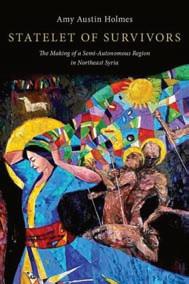

On the Isle of Antioch by Amin Maalouf, translated by Natasha Lehrer, World Editions, 2023, paperback, 288 pp. MEB $18.99. Alec, a press artist with an impressive track record, settles on a remote island in the Atlantic Ocean. He has little contact with his neighbor, a solitary woman who wrote a cult book years ago before withdrawing from public life. However, when a gigantic power failure cuts them off from the rest of the world, they find themselves dependent on each other. The world appears to be on the brink of nuclear war and the collapse of civilization seems imminent. But who are the mysterious friends of Empedocles, the gang of otherworldly protectors who came swooping in to interfere with the U.S. presidency and cure all illness? Should we trust them? On the Isle of Antioch is a suspenseful novel with mythological roots, written in the dreamy language of the classics, by internationally renowned Lebaneseborn French scholar Amin Maalouf.
Shiny Misfits: A Graphic Novel by Maysoon Zayid, illustrated by Shadia Amin, Scholastic, 2024, paperback, 256 pp. MEB $14.99. Palestinian American comedienne and disability advocate Maysoon Zayid’s debut children’s book shows that “misfits” don’t have to take a back seat. Bay Ann wants to shine—no matter what. She’s sure her moment in the spotlight has arrived when she wins the school talent show with a showstopping tap routine. But then her classmate and crush, Alyee Maq, causes her to wobble and almost fall. The video of him catching her goes viral, making Alyee an overnight sensation for “helping her.” Bay Ann is reduced to her disability and her talent is ignored. Bay Ann doesn’t want her classmate to get all the fame, and she is not satisfied being anything but the best. She’ll do everything in her power to beat Alyee at his own attention-seeking game. With the help of her two best friends, she’ll go up against Alyee and his crew to prove she’s number one. But as Bay Ann tries to find the thing that really makes her stand out, everything she tries goes disastrously wrong. What if the only way to beat her enemy…is to join him?

Compiled by Jack McGrath
To the Technician, April 9, 2024
The notion that universities have no duty to confront and/or respond to the pressing political concerns of our time is cowardly and ahistorical to North Carolina State’s own history. We, as the NC State Young Democratic Socialists of America, ask: What use is a leader who can’t lead? And to whose benefit is neutrality during a genocide?
In a recent Technician article, Chancellor Randy Woodson reiterated that NC State will remain silent about the ongoing genocide of Palestinians due to a 2023 state law that forbids UNC system schools from taking stances on “political controversies of the day.”
We acknowledge this law exists, but feel it does not excuse total inaction. There are times at which we must all speak out for the sake of humanity, regardless of institutional limitations, and outside of a public university-sanctioned statement, there are still many ways by which NC State could be supporting its students as we navigate this dire moment.
At minimum, the university should fulfill the Arab Student Organization’s (ASO) request for an educational resource for students about the history of Palestine. For what use is a university that can’t provide education?
In a 1968 speech entitled “The Challenge of World Affairs to American Higher Education,” former NC State Chancellor John Caldwell said: “There ought to be reasons sufficient somehow to make us uneasy with our orthodoxy and jar us loose
PRESIDENT JOE BIDEN
VICE PRESIDENT KAMALA HARRIS
1600 PENNSYLVANIA AVE. NW
WASHINGTON, DC 20500
COMMENT LINE: (202) 456-1111
WWW.WHITEHOUSE.GOV/CONTACT

ANY MEMBER: U.S. HOUSE OF REPRESENTATIVES WASHINGTON, DC 20515 (202) 225-3121
from it....History will not look kindly upon the affluent universities of America whose faculties and officers were unwilling to tax their energies and capacities to serve the critical intellectual needs of their time.”
Chancellor Caldwell rose to the needs of his time, actively supporting civil rights and his students as they protested the Vietnam War. He delivered the keynote speech at NC State’s Moratorium for Vietnam and, following the shootings at Kent State, Chancellor Caldwell joined with six other North Carolina chancellors to deliver a message to the governor: “De-escalation of violence in Indo-China and de-escalation of violence at home offer the only hope for a return to sanity.”
He dealt with student concerns through open discussion, not bureaucracy or suppression. We must raise the question: When future students look back at Chancellor Woodson’s term, will he be remembered as fondly as Chancellor Caldwell? Will he be remembered as a man who acted for the benefit of all, regardless of whatever obstacles there may have been, or will he be remembered as someone who, when faced by a critical moment in history, fell short?
Just last week, President Michael S. Roth of Wesleyan University proclaimed his support for a ceasefire. He went on to say, “Almost all colleges and universities have mission statements with moral commitments, and the fact that leaders of these institutions cannot possibly comment on everything does not mean they should comment on nothing.”
We thank Chancellor Woodson for his willingness to look further into NC State’s speech policies. However, we urge him to
SECRETARY OF STATE ANTONY BLINKEN U.S. DEPARTMENT OF STATE 2201 C ST. NW
WASHINGTON, DC 20520
PHONE: (202) 647-6575
VISIT WWW.STATE.GOV TO E-MAIL

ANY SENATOR: U.S. SENATE WASHINGTON, DC 20510 (202) 224-3121
go further in action and truly address NC State ASO’s demands. A proclaimed commitment to students is nothing compared to real action.
Ennis Wells, Raleigh, NC
To the Los Angeles Times, April 27, 2024 It feels like a heavy week. College students across the nation have been facing extreme forms of retaliation for justly demanding that the schools to which they become indebted divest from a genocide. These institutions are trying to silence us, yet they are the ones that have taught us we have a right to peaceful assembly. That is, apparently, unless we exercise that right to call them out and hold them accountable.
A genocide should never be debated; it is inhumane to do so. Let us remember that in arresting student protesters, USC, Columbia, the University of Texas and other schools are choosing to leave a very sad legacy.
Jocelyne Flores, Fontana, CA
To The Washington Post, May 6, 2024
When I was a child, over half a century ago, I remember watching first dispatches from the war in Vietnam on television and then anti-war demonstrations when I was a little older. It occurred to me that the very young people protesting the world they were entering had more at stake than most grown-ups. And when I saw the aftermath of Kent State, and other violent confrontations between the police and protesters, I
realized, despite my young age, that my country was sick, and that the protesters represented a purity of conviction that was beautiful. Those images have stayed with me for decades.
The lessons I thought our country had learned from Vietnam have apparently been lost. The failed proposition of using massive violence to bring “peace”—which cost the United States the respect of the international community—is playing out again in a new conflict, in a new generation. It should be no surprise that the recent anti-war protests have drawn a violent and draconian response. Efforts to muzzle and choke off their message will grow more violent and desperate, because those who oppose them are violent and desperate. The protesters of today don’t simply represent an effort to achieve peace and end enormous death and suffering. They represent an effort to make America great again, for all the right reasons our nation’s founders would recognize.
Robert Soderholm, Boston, MA
To the Orlando Sentinel, April 30, 2024 I support the non-violent protesters on our nation’s campuses. While some “news” organizations want to totally focus on the bad actors that undermine the protesters’ cause, they also want to unjustly label everyone as supporters of Hamas and anti-Semitic.
This is evident when we hear the commentators make such claims while the protesters are raising banners only asking for peace, a ceasefire and a call for an end to the genocides in Gaza and the West Bank. These are the same desires as the vast majority of nations around the world in the United Nations. One thing standing in the way of these desires is our own U.S. foreign policy.
I deplore the damages done by some of the protesters at our colleges and universities, but I am more outraged by the total indiscriminate destruction of all the schools and universities in Gaza by the Israel Defense Forces with bombs provided by the U.S. government. The “news” organiza-
tions say little about this.
The answer to the protests on our campuses is not to arrest and lock up the activists but to address the core issue. That is to halt the carnage in Gaza. We do that by halting the billions of dollars in weapons the U.S. gives to Israel and by joining the rest of the peaceful nations in the U.N. to demand a ceasefire. This is not anti-Semitic. It’s the humane thing to do.
Bob Horner, Orlando, FL
To The Journal of the San Juan Islands, May 8, 2024
I wish children didn’t die. I wish they would be temporarily elevated to the skies until the war ends. Then they would return home safe, and when their parents would ask them: “where were you?” they would say: “we were playing in the clouds.”
—Palestinian Poet Ghassan Kanafani
At one per day, it would take 43 years to attend the funerals of the 15,780 Palestinian children killed since October 2023.
Would you live to attend them all?
Palestinian Samer Abu Hawwash’s poem “My People” speaks more on what the lived experience of being a Palestinian is than any non-Palestinian can fathom: There, on a land, we were told, was not our land, under a sky, we were told, was not our sky,
my people live their death.
Are the clouds safe? With falling bombs and misplaced aid.
There are over 130 mass civilian graves in the Gaza Strip, few funerals.
My people write the names of their children on arms and legs, so they can find them later in the massacres.
And this country, the United States of America, and its colonialist ideals feeds the mouth that claims Palestine’s skies and offers its people life only in death. U.S citizens have Palestinian names written in blood on our limbs. Genocide of the Palestinian people is a humanity crisis. It is absolutely critical that we listen. We must demand an end to the slaughter
now, and we must demand a free Palestine.
Stephanie Reiss, San Juan Island, WA
To The Seattle Times, April 19, 2024
The U.S. veto of Palestinian statehood is disappointing and shameful. It is only because of the U.S. that the statehood vote failed.
How would granting Palestine full membership at the United Nations, similar to what other countries around the world enjoy, damage the prospect of peace between Palestinians and Israelis? The U.S. ostensibly supports a Palestinian state but requires that it negotiate with Israel to obtain statehood. Why should any people have to negotiate with a neighboring state to gain sovereignty and obtain U.N. membership? No existing U.N. member had to meet this test. It is unprecedented and nonsensical.
Our blind and unconditional support of the Israeli position on Palestinian statehood isolates us from the world community and compromises our own national security. The U.S. must extend to the Palestinians the same support that we extend to their Israeli neighbors.
Lee Daneker, Seattle, WA
The following are individuals, organizations, companies and foundations whose help between Jan. 1, 2024 and May 11, 2024 is making possible activities of the tax‐exempt AET Library Endowment (federal ID #52‐1460362) and the American Educational Trust, publisher of the Washington Report on Middle East Affairs. Some Angels will help us co‐sponsor the next IsraelLobbyCon. Others are donating to our “Capital Building Fund,” which will help us expand the Middle East Books and More bookstore. We are deeply honored by your confidence and profoundly grateful for your generosity.
* In Memory of the USS Liberty
**In Memory of Dr. Jack G. Shaheen
***In Memory of Diana Rose Cooper

Help
make sure that the Washington
Report on Middle East Affairs will be here for the next generation.
By remembering the Washington Report in your will, you can:
• Make a significant gift without affecting your current cash flow;
• Direct your bequest to a vital purpose—educating readers about U.S. foreign policy in the Middle East;
• Receive a charitable estate tax deduction & Leave a legacy for future generations.
Bequests of any size are honored with membership in the American Educational Trust’s “Choirmasters,” named for angels whose foresight and dedication ensured the future of the Washington Report and Middle East Books and More. For more information visit www.wrmea.org/donate/bequests.pdf, contact us at circulation@wrmea.org, write: American Educational Trust, PO Box 292380 Kettering, OH 45429, or telephone our new toll-free circulation number 800-368-5788 • Fax: 202-265-4574.























an n i ti les Pa dent f stu o U.S across xpress s e A
















































































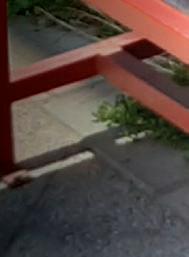

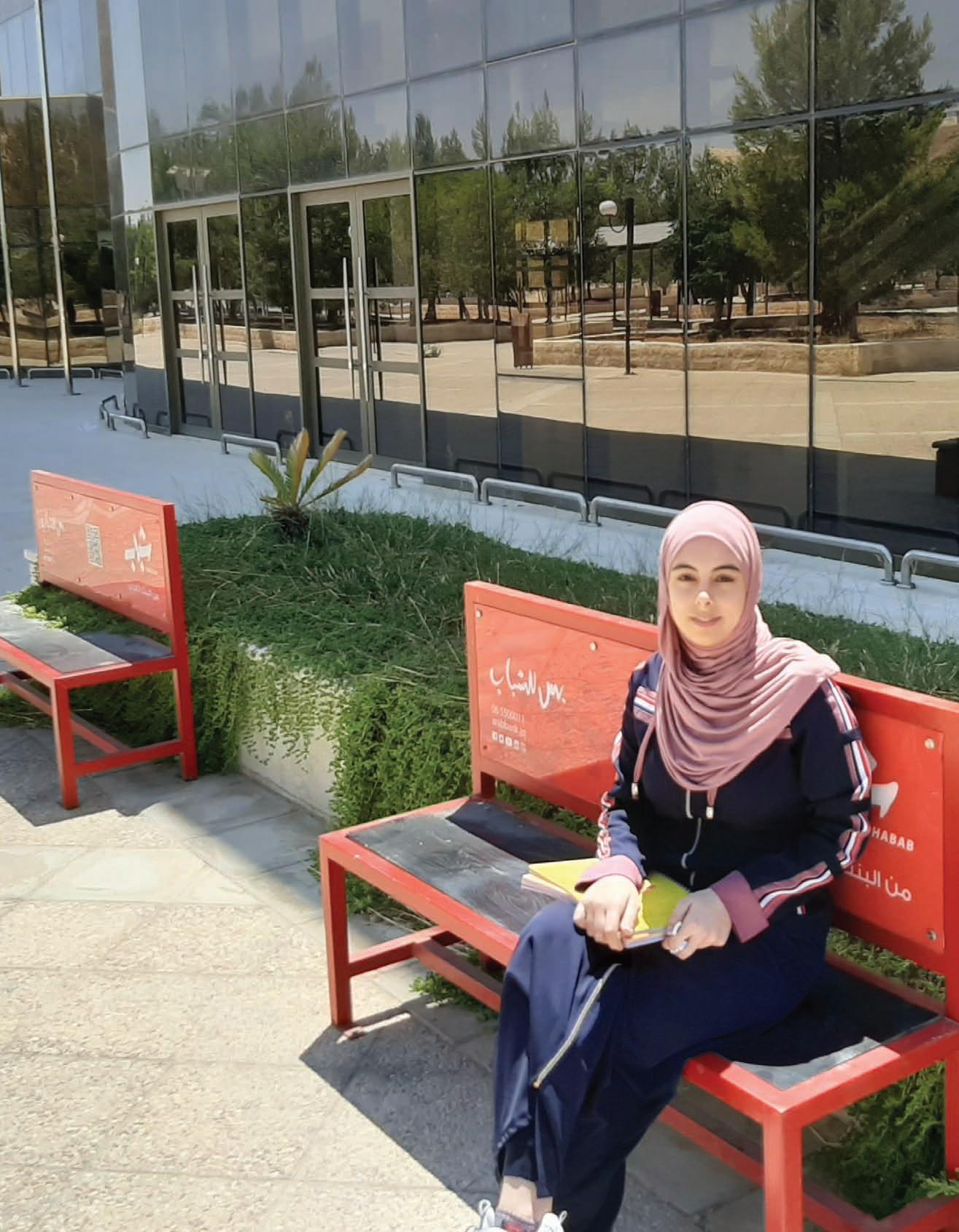



American Educational Trust
Washington Report on Middle East Affairs
1902 18th St. NW
Washington, DC 20009
June/July 2024
Vol. XLIII, No. 4
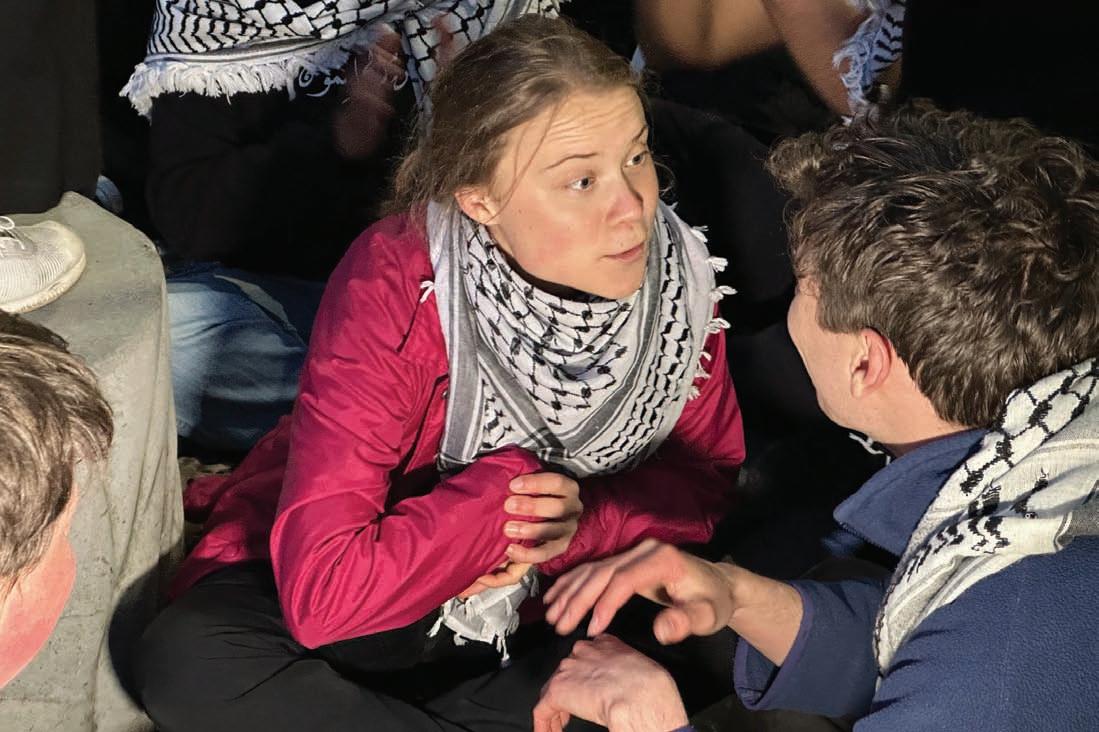
Swedish climate activist Greta Thunberg during a protest against Israel’s Eurovision Song Contest participation in Malmö, Sweden on May 11, 2024. Russia has been banned from the competition since 2022, after the country invaded Ukraine. Protesters and participants believed Israel should also be banned amid its invasion of Gaza.